No Results Found
The page you requested could not be found. Try refining your search, or use the navigation above to locate the post.
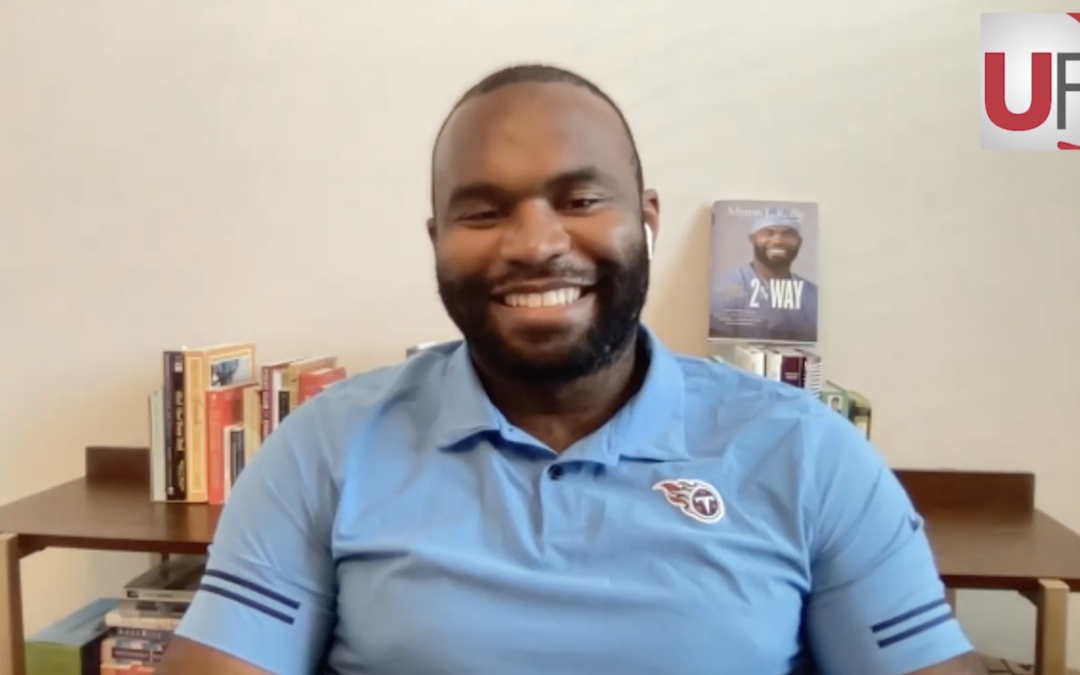
We love to see examples of successful black men who are also wonderful fathers. Dr. Myron Rolle is an inspiring role model with an incredible story. He was a celebrated football player who was drafted to the NFL. He received a Rhodes Scholarship and graduated Oxford University before he went to the league. And now he is a neurosurgeon in Boston working with brilliant minds from Boston University, Harvard, and others to tackle the most pressing issues of the human brain. He does all of this while being a devoted husband and father of 4 including two newborn twins. He’s a millennial who has lived his dreams.
How does he do it all? How did this middle class boy from the Bahamas become an exemplar on the football field and the field of medicine? How does he balance fatherhood with his research? UrbanFaith sat down with Dr. Myron Rolle to discuss his tactics and testimony in his book the 2% Way.
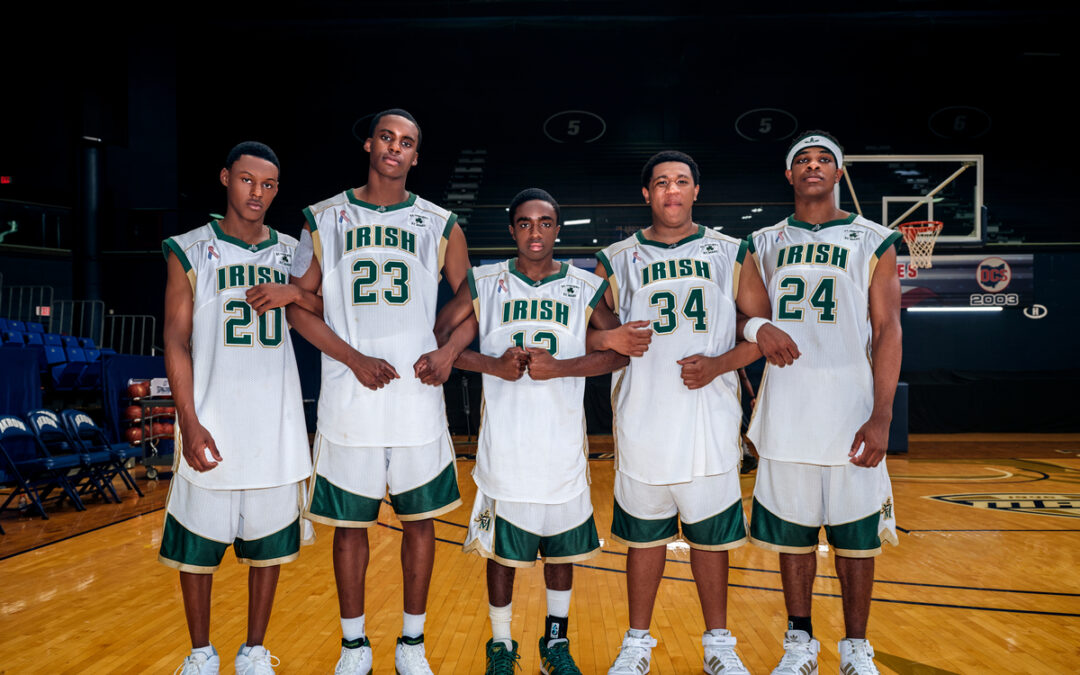
LeBron James is one of the greatest basketball players and greatest athletes of all time. But as long as he has had the professional spotlight he has been more about his team and community’s success than any of his individual accomplishments. Many have wondered what makes him such a team first star.

(from left), Willie McGee (Avery S. Wills, Jr.), LeBron James (Marquis “Mookie” Cook), Lil Dru Joyce III (Caleb McLaughlin), Sian Cotton (Khalil Everage) and Romeo Travis (Sterling “Scoot” Henderson), in Shooting Stars, directed by Chris Robinson.
Well it started with his first team as a young kid turned high school phenomenon from Akron, Ohio. Shooting Stars is a new film on NBCUniversal’s peacock platform that tells the story of LeBron James’ first team and formation into the superstar we know today. UrbanFaith sat down with the director of Shooting Stars, Chris Robinson to talk about what it was like to tell the story of the young LeBron James and his teammates. The full interview is above, more on the film is below.
The film is rated PG-13 for strong language suggestive and alcohol references . The film does not necessarily reflect the views of UrbanFaith. Viewer discretion is advised.
It’s not how you start the game. It’s how you finish.
Based on the book by LeBron James and the Pulitzer Prize winning author of Friday Night Lights, Buzz Bissinger, Shooting Stars is the inspiring origin story of a basketball superhero, revealing how LeBron James and his childhood friends become the #1 high school team in the country, launching James’s breathtaking career as a four-time NBA Champion, two-time Olympic Gold Medalist and the NBA’s all-time leading scorer.
Starring: Marquis “Mookie” Cook, Wood Harris, Caleb McLaughlin, Khalil Everage, Avery S. Willis, Jr., Sterling “Scoot” Henderson, Dermot Mulroney, Natalie Paul, Diane Howard, Algee Smith, Katlyn Nichol
Director: Chris Robinson
Executive Producer: Gretel Twombly
Producers: Rachel Winter, p.g.a., Spencer Beighley p.g.a, LeBron James, Maverick Carter, Jamal Henderson, Terence Winter
Screenplay by: Frank E. Flowers and Tony Rettenmaier & Juel Taylor, based on the book by LeBron James & Buzz Bissinger
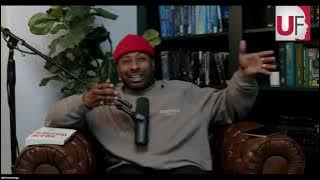
Manny Arango believes we are all brainwashed. Our thoughts are shaped daily by positive and negative influences whether online, in our social circles, in our workplaces, in our schools, or in our churches. The enemy of our souls desires for us to live in mental bondage, unable to walk in the freedom Christ has purchased for us. But we can choose whether to be brainwashed by the world or have our brains washed by blood of Jesus Christ. Pastor, author, youth ministry expert Manny Arango shares his insights on how to renew our minds and take on the mind of Christ in his new book Brainwashed: Overcome Toxic Thoughts and Take Back Control of Your Mind. UrbanFaith sat down with Pastor Manny to discuss the book and his journey to maintaining mental and spiritual health. More information about Pastor Manny and the book are below.
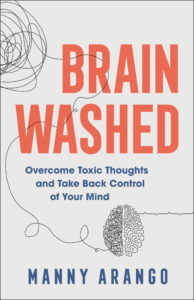
You can either take your thoughts captive or be held captive by them. The choice is yours. Scripture declares we will be transformed by the renewing of our minds. Manny Arango, preacher, storyteller, and self-proclaimed Bible nerd, describes this process as God cleansing our brains. It is the surest way to overcome anxious thoughts, self-doubt, bitterness, and other mental struggles. But how can we experience this healing power?
Brain Washed: Overcome Toxic Thoughts and Take Back Control of Your Mind is a biblical roadmap for winning the battles in your mind. Readers will identify faulty ways of thinking and learn how to take every thought captive under the authority of Christ.



Pentecost is one of the most important days in scripture, one of the most important days in Church history, and one of the most significant days for all Christians because it is the birthday for the Church. But it is a day that often passes with little celebration and attention in the lives of many believers. Why don’t we celebrate Pentecost?
The other major Christian holidays have found widespread secular adoption and commercialization. Christmas season is still the greatest period of retail sales in the world, with images of Santa Claus, reindeer, gifts, and winter weather dominating our consciousness. The popular images are far removed from the poor young girl from a small unimportant town giving birth to baby Jesus in Bethlehem that is the true meaning behind the holiday. Easter has widespread fanfare involving bunnies and eggs, chocolates and baskets in the popular culture. But believers rarely forget the Good Friday services, Easter outfits, and proclamations of “Hallelujah” in response to the Gospel of Jesus Christ resurrected from the dead. Christians almost universally celebrate Christmas and Easter.
But Pentecost, the occasion of the Holy Spirit appearing from heaven in the upper room and filling the disciples that began the church in Acts chapter 2 has no such consistent celebrations or commercial fanfare.
We should absolutely celebrate that the Holy Spirit has come to dwell among believers. The new creation has begun and the “already but not yet” Kingdom of God is made visible in the lives of those who follow Jesus Christ. We should have fanfare that God’s promise of living in our hearts, calling all people to Himself, and dwelling among humanity have been fulfilled. The Church being given the power to destroy the works of sin and evil in the world were fulfilled on Pentecost. In Acts 2, the Apostle Peter clearly explains that Pentecost is the fulfillment of scripture, that people were able to know God who speaks their language, and that the Holy Spirit was evidence of God among those who believes. God is not a distant force or impersonal figure. The Holy Spirit is at work everyday in our lives as believers. We can experience God in completely new ways because of His presence with us. We can discern God’s truth, share spiritual gifts with one another, and overcome sinful behaviors and sin-filled systems through the power of the Holy Spirit.
Pentecost allows us to move from knowing God’s works in the past to experiencing them in the present. Because of Pentecost all nations were invited to know the God of Israel in the ways they could understand Him. We should celebrate that the Holy Spirit is God with us today, by celebrating Pentecost. Our celebration may not have commercial Holy Spirit clothes and toys to buy. We may not hear seven sermons in a day as we reflect and are uplifted. We may not see a Pentecost holiday special on TV or Pentecost music on the radio, or Pentecost memes on our social media timelines. But we can give thanks to God for the greatest gift of the Holy Spirit in our lives. We can praise God in our worship services as we remember the birth of the Church. We can reflect on the work of the Holy Spirit in the world. And we can celebrate Pentecost however we celebrate it as believers have been called to celebrate it for thousands of years.

Michelle Miller is one of the most recognizable journalists in the country. But as she goes about telling the stories of so many ordinary people for CBS News, very few people knew her story. UrbanFaith contributor Maina Mwaura caught up with Michelle to talk about her best selling memoir: Belonging where she tells her story in all its candid highs and lows.
Video Courtesy of NABE Webinars
A lot of people have heard of the phrase “it takes a village to raise a child”. I was thinking the other day, the reason why people have a sense of belonging for a community or a city or an estate is because of the people who live there. The experiences and support they bring to that environment promotes a positive culture that draws everyone who lives there to feel as though they belong. They become protective and nurturing of their “village”.
That is the same way we should think about our finances. You do not get to financial stability and freedom by guesswork, feelings or emotions. It is an act of intentional commitment, discipline, education and accountability and it will involve you, and those you are willing to listen to.
I am a firm believer that money is a magnifying tool that reveals the intent and the character of your soul. Who you really are will always be revealed in the abundance of money or lack of it in your life. I have been around people who seemed humble and kind when they did not have money, until they reached a place of financial prosperity. All of a sudden, a sense of being rude and dismissive becomes appealing as though it is supposed to be fashionable. Pride becomes a regular smoothie partaken to make sure that you prove to everyone you made it.
On the other hand, having a lack of money can bring out the insecurities, fear, withdrawal and lack of confidence of embracing true purpose. I have also seen people sabotage great relationships, their integrity and character, because the struggle of not having enough turned them to desperation. They ended up doing things they wished they had not, or going back into situations they should not have, to get back to that place of financial comfort.
The reality is, having financial stability is a great feeling. Waking up each day with the amazing peace that you can pay every bill or anything you owe and have so much left over is a wonderful blessing to experience. However, the biggest mistake we make including myself is, camping in that place of wishing that could happen if we are not yet walking in that reality.
To embark on a journey to success regarding your finances, it has to begin with your outlook. What do you think of yourself regarding money? Proverbs 23:7 KJV states “As he thinketh in his heart, so is he”. Your outward behavior and reaction including your relationship with money is a direct reflection of how you think about yourself.
To create an outlook that will push you and motivate you to a healthy relationship with your finances, including being vulnerable and honest with yourself, as to why you push yourself each day to financial success, practice the “4 C’s to a positive outlook on money” as given to me by Holy Spirit”:
Be willing to face yourself and examine the true motives of your heart. How do you view money? Is it dreadful? Are you stressed out every time its payday or do you have a heart of gratitude for Gods provision? Are you courageous to admit that a lack of money has created a void that you need God to fill? Are you willing to admit that you have used money to attain a status that will make people like you? You have to be courageous to face yourself on your outlook of money.
You have to commit to change. Denial is not a choice. It is an invisible wall that you create in the circumference of your mind to convince you to cope with the assumption that everything is okay when it is not. Commit to have a positive outlook regarding money. This will give you a fresh perspective of the root cause of your behavior and relationship to money. If money is a tool that motivates you to live a purposeful life, it will be revealed and you will be encouraged to continue working hard. If it is not, you can pause and find out why and adjust your outlook to route you in the right path.
Confidence is very connected with faith. God always tells you to believe the opposite of what you feel or see. Sometimes at your worst, when you are experiencing lack, God encourages you that “He is your Shepherd and you shall not want” Psalms 23: 1.
As a child of faith, you have to remember that God orchestrates each of our steps and as we live yielded to Him, He will guide us to wisdom, knowledge, education that will equip us to great stewardship. However, we have to first be confident in Him. I am learning that daily, God never gets tired of empowering us with confidence. Seek Him, ask Him, He is right there, and He is willing to release to you the measure of confidence you need to handle the financial obligations at hand.
Consistency is what icing is to a cake, what syrup is to a pancake, what salt is to soup. Have you ever had soup with no salt? There is no taste to it. But you add a bit of salt and the flavors seem to be awakened as you drink it. It is the secret ingredient that so many of us miss. We start, but don’t finish. We set the budget, but don’t follow it. We open the savings account, but never deposit any money in it. I look at consistency as pacing yourself to savor the sweetness of life.
I love drinking tea. I specifically enjoy a nice cup of Kenyan brewed tea. It takes a special skill to brew a really good cup of Kenyan tea. To add up the flavors and make sure the taste of it is not bitter. The key is time. I consider myself a “master” at making tea especially for a large group of people but, it took me years and years of making tea everyday to learn. I could make tea in my sleep. Was it exciting? No! In fact, sometimes I dreaded it. But, when I see people close their eyes and smell the tea as they drink it with a smile and savor the taste, it brings me great joy!
It is the same way with consistency. You are not going to have butterflies and feel a sense of excitement truth be told you may get bored, not want to do it, dread it, but that is when you should do it. Be consistent in your commitment to be courageously confident about your outlook on money and watch how open you will be to learning how to be a wise steward of what God has blessed you with.

Have you ever felt like you’ve been waiting for life to happen or chasing a dream that isn’t yours? Chanel Dokun, a therapist and life planner, helps women and all of us redefine our worth from the inside out instead of the outside in her book Life Starts Now: How to Create the Life You’ve Been Waiting For. UrbanFaith had the chance to chat with her has she releases this timely book with practical ways to stop waiting and start living.The full interview is above. More on the book below:
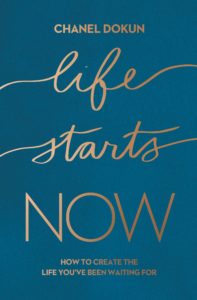
LIFE STARTS NOW:
HOW TO CREATE THE LIFE YOU’VE BEEN WAITING FOR
Did you think you’d finally be happy if you built a great career, found a meaningful romantic relationship, and crafted the picture-perfect life? But once you’ve gotten those things, you find yourself asking, Why isn’t this enough? Shouldn’t there be more? You’re not alone.
Chanel Dokun has walked hundreds of clients, just like you, through a similar journey of disillusionment because she’s traveled the same path herself. She spent years trying to achieve the lifestyle she thought she wanted, but with every accomplishment, Chanel found herself feeling more disappointed, disillusioned, and lost. She realized she needed to let go of society’s definition of success and become the architect of her own life.
In Life Starts Now, Chanel draws on her experience as a therapist and certified life planner to help you redefine what success really means as she offers practical strategies to help you create the life you are longing for. She shares
-an in-depth look at why society’s definitions of success and significance aren’t the answer in your search for more;
-practical action steps for unlocking your genius, finding your flair, and discovering your unique life purpose; and
-how the five postures of silence, solitude, generosity, gratitude, and play will take you from striving to thriving.
Life Starts Now will inspire you to release the search for significance and recover a redemptive view of your ordinary life so you can experience profound joy and fulfillment—and embrace your true purpose.

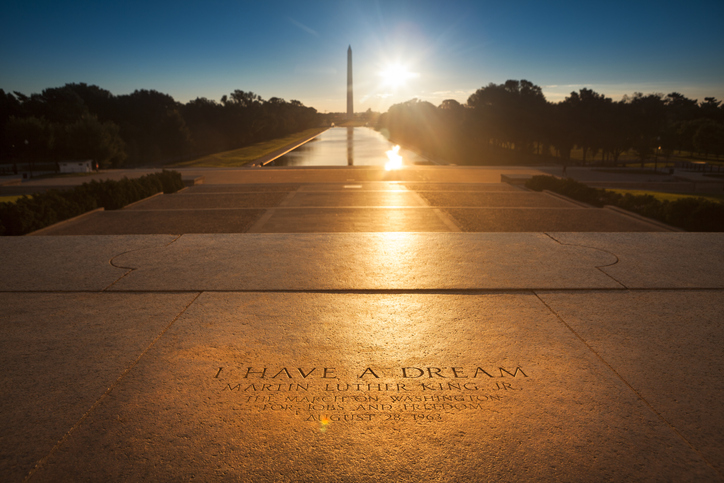
Podcast: Embed
Subscribe: RSS

 Raising children is not an easy task! There are many articles, friends, mom tips, and overwhelming support from mom groups that make our jobs a lot easier. From the first day I found out I was going to be a mom back in 2010, I knew that I had support. Whatever question or concern I had, all I had to do was ask my mom or google and there it was: an instant answer! But in early 2020 this reality changed for me and many parents across the world. A devastating pandemic reared its ugly head and completely shut the world down without warning.
Raising children is not an easy task! There are many articles, friends, mom tips, and overwhelming support from mom groups that make our jobs a lot easier. From the first day I found out I was going to be a mom back in 2010, I knew that I had support. Whatever question or concern I had, all I had to do was ask my mom or google and there it was: an instant answer! But in early 2020 this reality changed for me and many parents across the world. A devastating pandemic reared its ugly head and completely shut the world down without warning.
In March 2020, at the start of the pandemic, my husband and I received news that we would be expecting our third child. I remember the excitement we felt at first! We would have the opportunity to love, mold, and nurture another gift from God. Shortly thereafter, an overwhelming sense of panic and worry crept over me. I was frightened. I had no idea what to do. I do not believe anyone knew what to do as they faced the reality of a pandemic. I could not turn to my mother, articles, or blogs for advice on how to proceed or respond and receive the same knowledge or wisdom as I had before.
At the same time my children as well as many others across the world were being sent home from school and away from their friends and community. They were told to socially distance when we had no clue how to define what that meant. During this abrupt transition parents were being held to an even higher level of expectation. We had to continue on with our lives and keep it together as if the world was not in turmoil right before our eyes. I often asked myself how could I protect my children from something I knew nothing about? How could I protect them when thousands of people were losing their lives on a daily basis? Reports were circulating about pregnant women who were infected with a mysterious virus who were being denied their birthing rights. Some even had to experience giving birth alone. Reality hit home for us when I was instructed to attend my first prenatal exam alone and was told that would be the norm for the remainder of my pregnancy.
Like many others I could have given up, but I knew the first step in figuring out how to proceed within the unknown was to pray and be encouraged by the Word of God. My husband and I had to learn to lean on the Lord in a different way to lead and guide us in raising our family as well as being aware of our own emotional, physical, and spiritual needs throughout the pandemic.
Proverbs 3:5-6 to tells us to “Trust in the Lord with all your heart; do not depend on your own understanding. Seek his will in all you do, and he will show you which path to take.”
This scripture took on a new meaning for my family. As a wife and mother, I had to be intentional with every decision I made moving forward even when the circumstances presented to me did not make sense. I learned to trust that God has our steps ordered and regardless of what was happening in the natural, God has and will always provide all of our needs according to His riches and glory in Christ Jesus. I had to learn to ask for wisdom in a different way every morning before I started my day. I learned how to increase my ability to listen to my children and be ok with not having all the answers. I learned more than ever to just be present with them.
There are many accounts in the Bible of those who were faced with numerous challenges and the unknown. What kept many of the people in scripture anchored was God’s faithfulness and their ability to trust Him even in the unknown. Many mothers like Sarah, Rachel, Mary and Elizabeth did as they were instructed, although they had no idea what lay ahead on the journey before them. They did not have books, articles, or even written history to reflect back on to determine what they could and could not do. All they had was God’s faithfulness and promises that He had given to them. They all had the choice to accept or reject the promises the Lord had for them, but they did not. They could not foresee what the future held for them and their families, but they trusted that the Lord’s will would be done through their obedience. These examples from scripture encouraged me in to trust God throughout this pandemic. Because of God’s faithfulness, I have truly seen the Lord’s hand on my family members’ lives. I gave birth to a healthy baby girl, our two older children are thriving in school, I am able to be present and responsive for my husband, and our home has been filled with the pure joy only the Lord could give.
To all the mothers, I want to wish you a Happy Mother’s Day! You are strong, resilient, appreciated and loved. I want to encourage you all to not lose hope. Keep praying, seeking, and trusting God even in the unknown. He has proven himself faithful and will continue to be faithful for generations to come!

Video Courtesy of Anointed Praise Dance Ministry
When I was a child growing up and playing house with my dolls, I always dreamed of the day when I would one day be a mother. I had it all planned out. I would get married, and have two children; a boy would be the oldest and the girl would be the youngest. I would live happily ever after. As fate would have it, that day never came. Well, not in the way I had expected it to happen. I am not a biological mother, but I have mothered so many children throughout my life. My life has not played out the way I planned it, but it has worked out exactly as God has planned it.
I am happy that God has placed some awesome women in my life who exemplify a true gift from God. Some have played major roles in my life throughout my upbringing and adulthood and others are great friends who I have had the pleasure of witnessing in their motherhood role. I wanted to be a mother like my mother was to me. My mother was a gift from God – and so are many mothers.
Think about it. Mothers carried you for nine long months, lost their figure, and some were sick during their entire pregnancy. Not to mention, with children come sleepless nights, temper tantrums, potty training, teething, measles, mumps, chicken pox and everything else. Mothers mostly were the taxi cab drivers to school, numerous athletic practices, and games. They are our biggest cheerleaders with and experts in home economics, counseling, doctoring, teaching, and whatever else is needed. Your mother made sure you were college prepared and, if college wasn’t your thing, then she supported you as you followed your dreams. Mothers are small business owners and can fix most things. Mothers are intelligent, loving, compassionate, patient, and supportive. Mothers have so much wisdom.
Unfortunately, some people have not had the experience of knowing and loving the previously described mothers above. That is so unfortunate. I won’t bash anyone who has not had the love of a mother. However, I pray that at some point in your life you are able to experience the love of a mother figure. Everyone that births a child is not always the best mother figure. But then there are those like me, who have never birthed a child but love children and love being around them. I hope that at some point in my life, I have been able to share my love with someone who hasn’t had the best experience with a mother.
God has made us share the love of a mother with unloved children. No child should ever feel as if they have not had the love of a mother in their life. There are so many places that childless women can go and be a mother figure to young children. Help them to have the kind of love that your mother gave you. We want them to know that Mothers are a gift from God, whether it is their biological mother or someone who just has a lot of love to give. “A child doesn’t have to be biologically yours for you to love them like your own.”
Always know, God can and will be your mother. He has been for me since my mother passed. He comforts me. He is patient with me. He is all knowing. He is compassionate. God is love.
My mother has been gone for 19 years, and I still grieve her especially during the holidays. But God has been with me through it all. Throughout scripture, you can see where God can and is seen as a mother figure.
Deuteronomy 32:10 (NIV) “In a desert land he found him, in a barren and howling waste. He shielded him and cared for him; he guarded him as the apple of his eye.”
Hosea 11:3-4 (NIV) “It was I who taught Ephraim to walk, taking them by the arms; but they did not realize it was I who healed them. 4I led them with cords of human kindness, with ties of love. To them, I was like one who lifts a little child to the cheek, and I bent down to feed them.”
Luke 13:34 (NIV) “Jerusalem, Jerusalem, you who kill the prophets and stone those sent to you, how often I have longed to gather your children together, as a hen gathers her chicks under her wings, and you were not willing.”
Psalm 91:4 (NIV) “He will cover you with his feathers, and under his wings, you will find refuge; his faithfulness will be your shield and rampart.”
Isaiah 42:14 (NIV) “For a long time I have kept silent, I have been quiet and held myself back. But now, like a woman in childbirth, I cry out, I gasp and pant.”
Isaiah 49:15 (NIV) “Can a mother forget the baby at her breast and have no compassion on the child she has borne? Though she may forget, I will not forget you!”
Let God comfort you and protect you. He will be the mother you never had or the mother that is no longer with you. God can be whatever you need God to be.
Pray About It: God, you are so awesome in all that you do. Thank you for the wonderful gift of mothers. We are grateful for your love, comfort, and protection for the motherless. God, you are a gift that fulfills needs for the motherless. Thank you for nurturing us and holding us close through all circumstances. Thank you, God. Amen.
Deuteronomy 4:9-10 (NIV)
Only be careful, and watch yourselves closely so that you do not forget the things your eyes have seen or let them fade from your heart as long as you live. Teach them to your children and to their children after them. Remember the day you stood before the Lord your God at Horeb, when he said to me, “Assemble the people before me to hear my words so that they may learn to revere me as long as they live in the land and may teach them to their children.”
About the Author

TONIA WILLIAMS: Tonia lives in North Augusta, SC where she grew up. She received her BA degree in Journalism from the University of South Carolina (USC), Columbia, SC and her MBA degree from Brenau College in Gainesville, GA. She is actively involved with her church, Old Macedonia Baptist Church, where she sings on the choir, is Director of Vacation Bible School, and teaches the Women’s Sunday School class

Let’s face it. Being single and Christian is hard. It’s even harder to find that person you want to spend the rest of your life with. There are so many factors to consider: age, personality, looks, and spirituality. It can all become a blur. How do you even figure out if someone is a match for you? What does God have to say about it? Here are five powerful secrets to finding Mr. or Mrs. right as a young Christian single.
The first thing to consider is whether you and the other person are serving the Lord. One of the first things I discovered about my wife was that we were both passionate about serving God and looked for ways to bless others.
In fact, I met my wife preparing for a short-term mission trip. The funny thing is it wasn’t love at first sight for either of us. We continued to serve together at different times and in different places for about four years.
One day I looked up and I realized we were spending a lot of time together and I had stars in my eyes.
You can’t find the right person for you if you are putting on a mask in public. The person you attract will be drawn to the mask and not the real you.
So don’t be afraid to share your real opinions about things. Put your likes and dislikes on full display.
Yes, some people will be repelled but the right people will be drawn to you. Now, don’t get me wrong.
You don’t want a clone of yourself who thinks and believes the same way you do. You want someone who will be attracted to your authentic self.
I grew up in a small storefront church in Los Angeles. Most of my family still attends this church.
My heart will always be there, but staying within this circle made my choices for a mate slim.
Once I got out and started becoming involved in leading a Bible study on campus, and eventually going overseas on short-term mission trips, the dating pool started to widen.
I started meeting different people and more people who were going in the same direction I was going. That all started with me stepping outside of my comfort zone.
This should be a no-brainer for Christians but oftentimes we just date people because we don’t want to be alone.
Other times it’s just hormones taking over. If you didn’t know, Christians don’t date just to date. We date to marry.
I can remember hearing a sermon about marriage and being a single Christian man. The pastor said that if we’re not going to a hostile mission field or secluding ourselves in the Amazon jungle to find a cure for cancer we need to plan to get married.
That basically put me on blast and I started actively seeking to find the wife God had for me.
The last secret is this: Be willing to let go. Sometimes the person you are dating is not the right person.
Still many people go on dating someone when they know that they don’t want to be with this person for the rest of their life.
There are more red flags than a Chinese political rally yet the person still holds out hope that maybe they will change. Most of the time they will not.
It’s best to stop holding on to hope that this person will change their ways or their basic personality traits. When you do that your perspective on the situation changes.
You begin to compromise. You want the relationship to work so badly that you will do anything to make it happen.
Eventually, either you both move on after wasting time or you end up marrying them and committing to a person who is not for you.
Trust God. Be willing to let go.

18 For if the inheritance could be received by keeping the law, then it would not be the result of accepting God’s promise. But God graciously gave it to Abraham as a promise.
19 Why, then, was the law given? It was given alongside the promise to show people their sins. But the law was designed to last only until the coming of the child who was promised. God gave his law through angels to Moses, who was the mediator between God and the people. 20 Now a mediator is helpful if more than one party must reach an agreement. But God, who is one, did not use a mediator when he gave his promise to Abraham.
21 Is there a conflict, then, between God’s law and God’s promises?[a] Absolutely not! If the law could give us new life, we could be made right with God by obeying it. 22 But the Scriptures declare that we are all prisoners of sin, so we receive God’s promise of freedom only by believing in Jesus Christ.
23 Before the way of faith in Christ was available to us, we were placed under guard by the law. We were kept in protective custody, so to speak, until the way of faith was revealed.
24 Let me put it another way. The law was our guardian until Christ came; it protected us until we could be made right with God through faith. 25 And now that the way of faith has come, we no longer need the law as our guardian.
26 For you are all children[b] of God through faith in Christ Jesus. 27 And all who have been united with Christ in baptism have put on Christ, like putting on new clothes.[c] 28 There is no longer Jew or Gentile,[d] slave or free, male and female. For you are all one in Christ Jesus. 29 And now that you belong to Christ, you are the true children[e] of Abraham. You are his heirs, and God’s promise to Abraham belongs to you.
There is such a joy and peace to know that we serve a God who has created a way for all of us to understand that we are one in His presence. This scripture is a reminder of the viewpoint of God regarding unity and oneness.
For those who desire to come into the Kingdom of God, it can be difficult to get to Him if all they see is the bias and prejudice that sometimes exists in our society. That mindset can be applied to their own personal relationship with God. They may think that He is a biased God who picks and chooses who to bless.
Have you felt that way? Has the enemy convinced you that there are certain blessings you cannot attain in this lifetime? May you be encouraged by this scripture to know:
This means we all have the privilege of being blessed by God. Remove the fear, distrust, and doubt that God will not bless you because of your social status, race, or whatever bias you face. Ask and believe in faith that God is able and desires to give you all blessings that pertain unto life and godliness.
The Lord desires for us to view one another as one. If one person hurts, we hurt as well. Considering this fact will open our lives to embrace compassion, empathy, and kindness. The next time you want to be quick to judge or scorn another brother or sister in Christ, remember that we are one in God’s eyes. Ask Holy Spirit what He desires for you to do and place yourself in that person’s shoes to ensure that the decision you make in thought or actuality will be pleasing to Him.
Recognizing that we are one in Christ Jesus allows us to ask boldly for all the promises that were provided to Abraham. It is easy to read the Word of God and look at what God blessed Abraham with and think that those blessings were only for him. However, Abraham is no longer living but those promises God gave him, still exist. Why won’t you claim them? God desires for you to experience the joy and breakthrough that Abraham received.
The love of God is not a feeling, but it is His Word in manifestation. This week, begin to think about the promises of God that are accessible to you, and have not been activated in your life.
It is time to walk in the fullness of what God has for you. Believe that He is more than able to bless you with an abundant life and wants you to experience all that this life has to offer you. All you have to do is ask in faith, believe, and receive it by preparing for the manifestation of what you ask Him. He will bless you according to His Word and His will for your life.
Dear God,
I am grateful for the clarity you bring through your Word to remind me that I am just as qualified for your favor, love, and blessings as Abraham was. I boldly begin to believe and ask by faith for everything I need.
Teach me the discipline to steward what you have placed in me so that I can pass it on to future generations and become a carrier of the many blessings that you will bestow upon me. My mind is being transformed to believe for the best and view myself as a partaker of the blessings that Christ has to offer.
Thank you for this reminder. I am loved by you.
Amen.
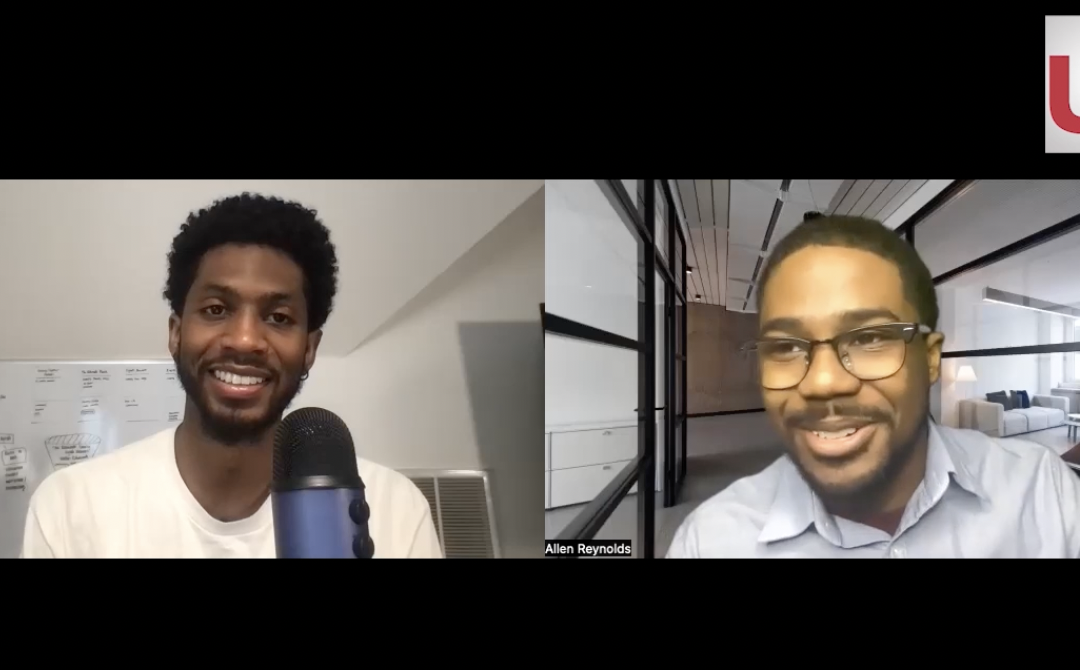
Chaz Smith is a viral content creator who has millions of followers on Instagram, TikTok, YouTube and more. He has been producing viral comedy shorts for over a decade, making him one of the veterans to social media content creation. But he is not just funny, he is also faithful. He is now using his God-given platform to produce a new kind of content…Bible stories. His new venture What Had Happened Was is an animated series telling Bible Stories on YouTube and other social channels that will be available for people everywhere for free. He is beginning with the Book of Daniel which launches next year. In order to get the series across the finish line and available for free he has launched a kickstarter to crowd fund the project. UrbanFaith editor Allen Reynolds sat down with Chaz to discuss the project, his faith, and how we can keep that same energy sharing the good news as believers. The interview is above, more about Chaz Smith and the series is below. Contribute to his kickstarter here to help this show come to life!
https://www.whhwseries.com/
At its core, WHHW bridges the gap between the world of entertainment, history, pop culture, comedy, and the Bible. In its first season, WHHW will retell the Biblical story of Daniel. The eight episode miniseries will highlight Daniel’s royal lineage, captivity, and how he was forced to serve foreign kings in a distant country. As the story unfolds, viewers will watch how Daniel and his friends encountered threats that challenged everything they believed in, but their actions ultimately ended up impacting the course of human history. In addition to the first season, WHHW is slated to include at least two more, which will depict the lives of Joseph and Esther.
“My hope is that WHHW will bring the stories in the Bible to life in a way that they’ve never been seen before. My aim is to combat the difficulty some have while reading the Bible,” said Smith. I want to tell the stories in a way that’s funny, smart, and easy to understand without bending the truth or watering anything down. WHHW is a blend of memes, pop culture, cartoon and anime references, engaging storytelling, historical and cultural context, and high quality animation. Whether episodes of WHHW are watched alone, with friends, or with family, I want to create something that uses the stories in the Bible to ultimately help people see who God is from a completely different perspective.”

I’m Chaz, and I love making people laugh! I’ve been a content creator since 2013, and gained millions of followers and hundreds of millions of views across all social media platforms, but storytelling is where my heart is really at. I’ve been committed to creating uplifting content that brings joy to people. For the past 2 years, I’ve been working on my latest project, What Had Happened Was. The series is a colorfully animated, comedically narrated web series, dedicated to retelling biblical stories in an entertaining, insightful, and simple way for people of all ages, backgrounds, and interests. WHHW serves as an intersection of my experience in the social media space, heart for storytelling, love for animation & desire to produce quality entertainment content for this generation. This project means so much to me because it’s far bigger than me. I see this as an opportunity to use stories and laughter to help the people of this generation make sense of the world––and who we are.

 Have you ever looked at someone else’s life and thought how much better theirs seemed to be compared to yours? Maybe it was their confidence that made you say, “Wow, I don’t have it like they do,” or “I wish I could be as bold as they are.” Sometimes we compare material things, accomplishments, and even money. But what reward is there in comparing? Comparison can work to our advantage if what we see from another inspires us to be better. But on the flip side, comparison usually robs us of joy and gratitude for our unique and individually destined path.
Have you ever looked at someone else’s life and thought how much better theirs seemed to be compared to yours? Maybe it was their confidence that made you say, “Wow, I don’t have it like they do,” or “I wish I could be as bold as they are.” Sometimes we compare material things, accomplishments, and even money. But what reward is there in comparing? Comparison can work to our advantage if what we see from another inspires us to be better. But on the flip side, comparison usually robs us of joy and gratitude for our unique and individually destined path.
As believers, we will experience many things that will try to stop us from living the full and abundant life God intended for us. Comparison is one of those acts that can steal our own joy and appreciation for what God has done for us. Here are 3 major ways that comparison robs us:
Comparison can decrease our own self-confidence
Being confident is a power, and when we begin to measure ourselves to others, we chip away at that power. Being self-assured and having a firm grasp on the truth about who God has called you to be is illuminating and attractive. But spending our time thinking about how our neighbor has “more” than us will lower our sense of certainty in ourselves. As we live and fear God, the Lord will give us strong confidence as stated in Proverbs 14:26. So even if your friend just bought a new, shiny car, it doesn’t mean you have to fall into a spiral of thoughts about how you don’t have a new car. That thought can start with the car but can end in another wave of topics that you can compare yourself to, and that’s not fair to you. Remember that God has given you what you need for your journey, so you can be confident in your own story.
Comparison can create a cycle of dissatisfaction
Think about it: when you compare your life to something that seems better you make it difficult to be fully satisfied. In Philippians, Apostle Paul speaks on some lessons that he learned. He instructs us to be content in whatever state we’re in (Philippians 4:11). This helps us learn to be truly aware and grateful for what’s right in front of us so that we’re not constantly searching for better or different. However, remaining content is easier said than done, and that’s how comparison can seep in and taint God’s preferred perspective for us. Our flesh is weak and doesn’t want to do what’s best. Without the feeling of dissatisfaction being checked, this can create a mind-draining cycle of seeing what’s different, good, unpleasant, pure, better, wrong, and greater in someone else, which can lead to feelings of doubt, jealousy, and even depression. But as believers, we have to lean into God through prayer when we see ourselves sinking in those thoughts. He will be faithful to pull us out of the spiral.
Comparison can rob us of the will power and the motivation to try
The danger is that if comparison goes on for too long, it can cause you to shut down and stop your own efforts toward greatness. The thought that, “Oh, they have it already, or they can do it better, so why should I?” can debilitate our energy to do what God has assigned us to do. Whether it’s to start a business, run a charity organization, go to college, post your helpful blog, or showcase your art, it’s imperative that you push through and do it. Motivation is something that needs to be fed, because you’re not always going to feel “motivated.” We all have those days, and it’s natural to feel unmotivated occasionally. But harmful comparison will always paralyze our motivation and drive to access our destinies. It’s super important that we seek God for our purpose in life so that we can have an anchor in our hearts to keep us grounded when comparison rears its ugly head.
I think it’s safe to say that we’ve all had moments of comparison. If comparison flows from a pure place, it can inspire you, but many times the opposite is true. Be encouraged knowing that God will give you exactly what you need to bless you and bring Him glory . He trusted you with your own gifts, talents, passions, and personality. As you think about comparison, ask God to shift your mind to seeing the good He’s placed in you. As the Word says in Philippians 1:6 (NIV), “being confident of this, that he who began a good work in you will carry it on to completion until the day of Christ Jesus”. Do not allow the greatness He has begun in you be stolen by comparison. You are too valuable to let that happen.
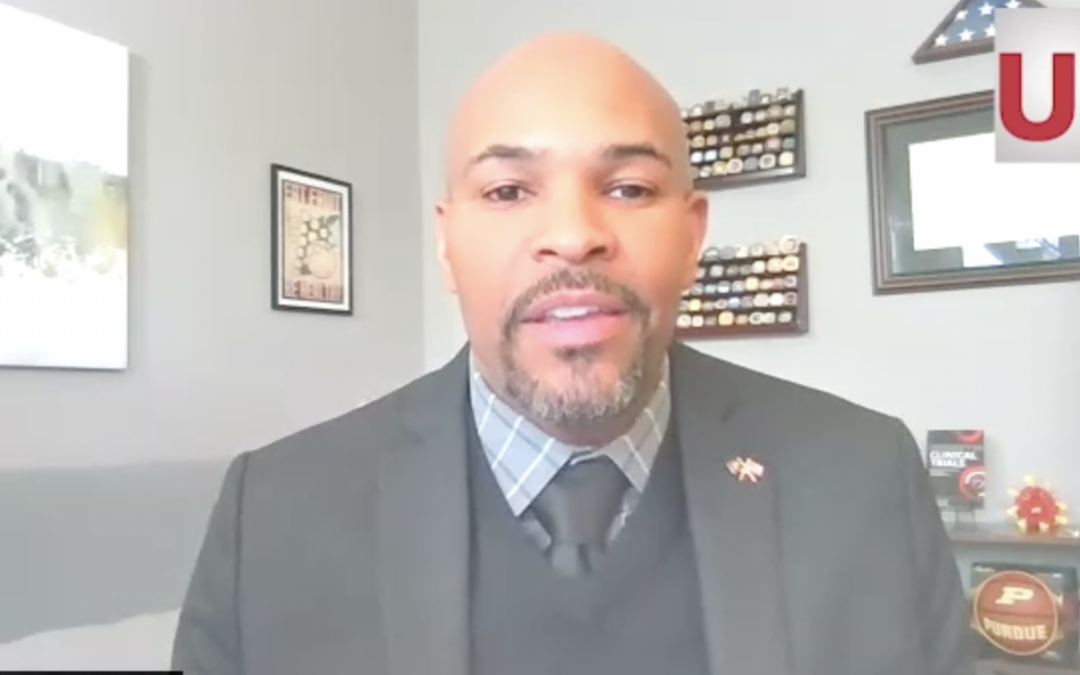
Black men are the least likely group to have access to or receive adequate healthcare in the United States for a variety of reasons. As a result, black men still have some of the worst healthcare outcomes. How can we approach some of these issues to help black men be healthy or become healthcare professionals? UrbanFaith contributor Maina Mwaura interviewed Dr. Jerome Adams, former US Surgeon General and Dr. William Humphries, Neurosurgeon and healthcare expert about Black Men’s health.

In college, I was quite the busy-body. I found my self-worth in participating in every possible activity, club, and organization. I was in the band, played tennis, and a member of student council. I was also a member of the student television news station, volunteered with the Chapel every Sunday, and I pledged a sorority. Can you say, “busy?!” The less I slept, the more meals I skipped, and the more coffee I drank, the more valuable I felt.
I was not taking care of my temple. Instead, I was abusing it as if that was a way to win God’s approval. As I write this now, it sounds so silly. I’ve matured a lot. But in my younger years, I had some serious insecurities and lacked self-worth. I literally hated everything about the body I was in. I hated my mind, I hated my body, and I hated my spirit. As a result, every part of me was mistreated by…me.
Thankfully, I’ve learned a lot since my college days. I’ve learned that there is nothing I can do to earn God’s love and make him value me more than He already does. How could I forget that He was the one who formed me in my mother’s womb? How could I forget that He created me in His own image? How could I not honor Him by taking care of the body, mind, and spirit that He formed—in detail—when He created me?
Since taking care of myself was a completely foreign concept to me, it didn’t happen overnight. I didn’t wake up one morning and begin eating healthy meals and taking time for myself. I truly struggled with how to start valuing and treating myself like a daughter of The King.
“Dear friend, I hope all is well with you and that are as healthy in body as you are strong in Spirit.” — 3 John 1:2
God is glorified when we take care of the temples He gave us, and it is important that we do so in body, mind, and spirit.
 In college, I was barely eating. I skipped meals to make time for all of my activities, and when I did eat, I only ate cereal, ramen noodles, and fries from the dollar menu at fast-food restaurants. Talk about nutritious! However, I realized that I wanted to be energized to do work for God’s Kingdom, but the way I was fueling my body was leaving me tired, weak, and lethargic. It was time for a diet change.
In college, I was barely eating. I skipped meals to make time for all of my activities, and when I did eat, I only ate cereal, ramen noodles, and fries from the dollar menu at fast-food restaurants. Talk about nutritious! However, I realized that I wanted to be energized to do work for God’s Kingdom, but the way I was fueling my body was leaving me tired, weak, and lethargic. It was time for a diet change.
If you’re active on social media and spend your life online—like most people do—you are most likely aware of the constant pressure to eat healthier, lose weight, and feel your best. However, with my focus being on God’s glory, I chose to change my diet to ensure that His temple that He created was thriving. He is my motivation for healthy living – not how my body looks.
So, if you are looking to make some changes in how you feed your temple, here are a few tips:
Take time out to prepare three healthy meals a day. Breakfast is as important as lunch and lunch is as important as dinner. It is so tempting to skip a meal when we are on-the-go, but we are truly doing ourselves a disservice when we do this.
Start small. It can be overwhelming to change every eating habit at once. Start with breakfast. Set an alarm for 20 minutes earlier than you normally get up to allow yourself time to prepare and eat a nutritious meal.
If you have a sweet tooth like me, look up healthy alternatives online to satisfy that craving. My go-to is a chocolate peanut butter smoothie that is made with raw cacao powder and organic peanut butter. Super healthy and super delicious! It doesn’t have to be hard to feed your body delicious, nutritious meals. You will feel more energized and your body will thank you.
 I believe that this falls under the category of taking time for yourself. Let’s face it. We are busy people. This society thrives on “busyness.” I fell into that trap in college and I still have trouble with it today as a wife and mom.
I believe that this falls under the category of taking time for yourself. Let’s face it. We are busy people. This society thrives on “busyness.” I fell into that trap in college and I still have trouble with it today as a wife and mom.
Things have to get done! There is no time for myself! Sleep? What is that?
Sound familiar?
However, if we neglect sleep and fail to take time for ourselves, our minds become cluttered. And, I realized that when my mind is cluttered, I struggle to hear God and stay in tune with His presence. I am here to glorify the Lord through my every step and if I can’t hear Him, due to a cluttered mind, how can I glorify Him?
I recommend writing down areas in your life that you can see as mind clutter. For me, it’s social media, my busy schedule, and a constant need for perfectionism. Once you figure out what your areas are, write down ways to clear your mind from these things.
I’m going to make a commitment to find time every day to be social media-free. I am going to commit to saying “no” to something on my agenda that just isn’t important and replace that time with something a bit more relaxing.
What commitments can you make to clear your mind? Whatever they are, write them down to help you stick to them. Place Post-It Notes around your house with your commitments. Set reminders on your phone. Write them down in your planner. Ask an accountability partner to remind you of your commitments.
 Finally, it is important to feed your spirit. It is the spirit of The Lord that lives inside of you. It is the spirit that God intricately created that makes you, YOU. It is your relationship with the Holy Spirit. Feeding this area of your temple is so important.
Finally, it is important to feed your spirit. It is the spirit of The Lord that lives inside of you. It is the spirit that God intricately created that makes you, YOU. It is your relationship with the Holy Spirit. Feeding this area of your temple is so important.
However, can I be honest with you? This is the hardest area for me to feed and keep healthy. Can anyone else relate? Why is it easier to scroll through social media than it is to open our Bibles and receive the Truth?
I’ll be the first to admit that planning a healthy meal is much easier for me than devoting time to my relationship with God. I am so thankful for God’s grace and strength in this huge area of weakness for me.
One thing that has truly helped me in this area is getting connected in my church community. Serving in the Church and being a part of small groups Bible studies are both ways to fuel my spirit. They are great ways to ensure that I am taking time out to refresh with The Lord.
However, alone time with the Lord is equally as important and should be a part of our daily lives.
One of my favorite ways to incorporate alone time is to worship in the car while I am driving. No phone, no distractions, just me and the Lord.
While working on your relationship with God, keep in mind that we are not earning God’s approval by spending more time with Him. We cannot do anything to make Him love us more. We are strengthening our relationship with Him because He desires us so much! Don’t let the enemy turn your efforts into a guilt trap when you fall short, because, the truth is, we will always fall short. We are human.
Our Heavenly Father gave each of us these beautiful temples that were made in His image. It is imperative that we take care of them and treasure them just as He treasures us. When we do so, we are making ourselves even more available for Him to use us at His will for His glory, and we are fueled and ready to live the lives that God has called us to live.
What are some healthy ways that you use to feed your temple? Share them below.
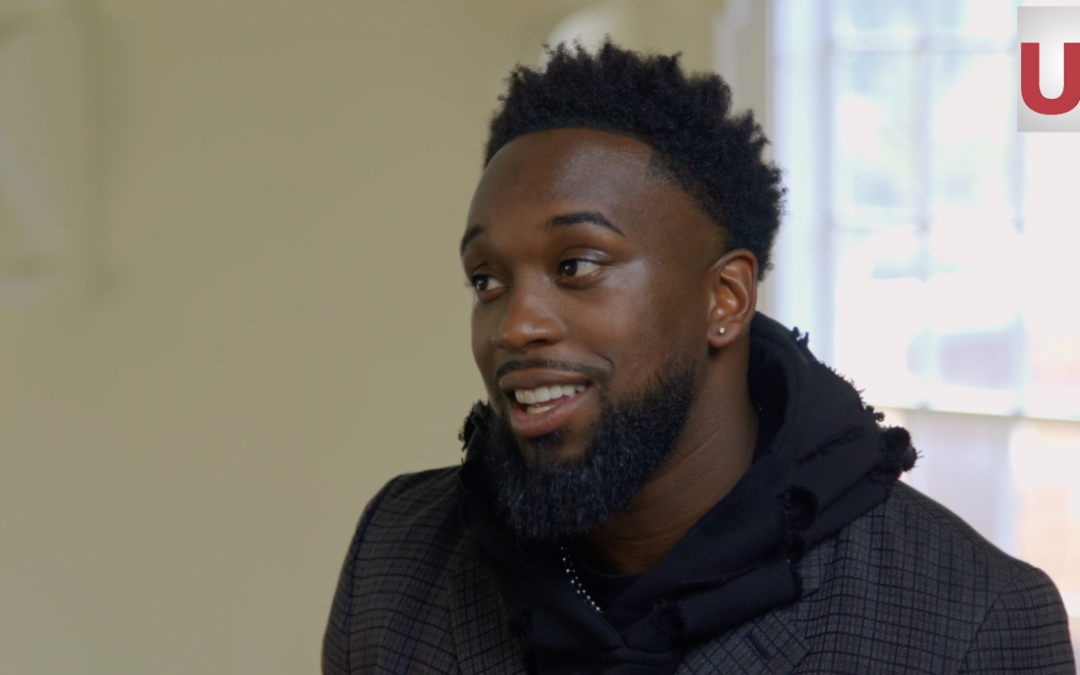
Dante Bowe is one of the most popular new singer/songwriters in the Gospel and Contemporary Christian worlds. He loves to sing to God. He was briefly off the public scene in 2022 after leaving Maverick City Music, but has returned to form with his own record company and new music. His new album and new label have sold thousands of records. His new label True Music seeks to share authentic worship. UrbanFaith contributor Maina Mwaura sat down with Dante to discuss his creative process, his artistry, and his journey.
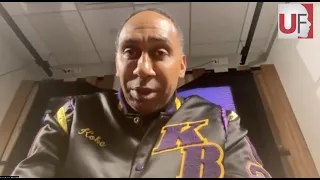
Stephen A. Smith is one of the most recognizable people in Sports Media today. He is host of some of the most watched shows on ESPN, one of the most connected journalists for sports stars, and one of the hardest working people in the business. But he has overcome many obstacles and been relentless on his path to his success. His faith has been a key part of his tenacity and success not just on screen, but in life. He recently published a book about his life Straight Shooter which has become a New York Times Bestseller. UrbanFaith contributor Maina Mwaura sat down with Stephen A. to talk about his book, his journey, and his faith.
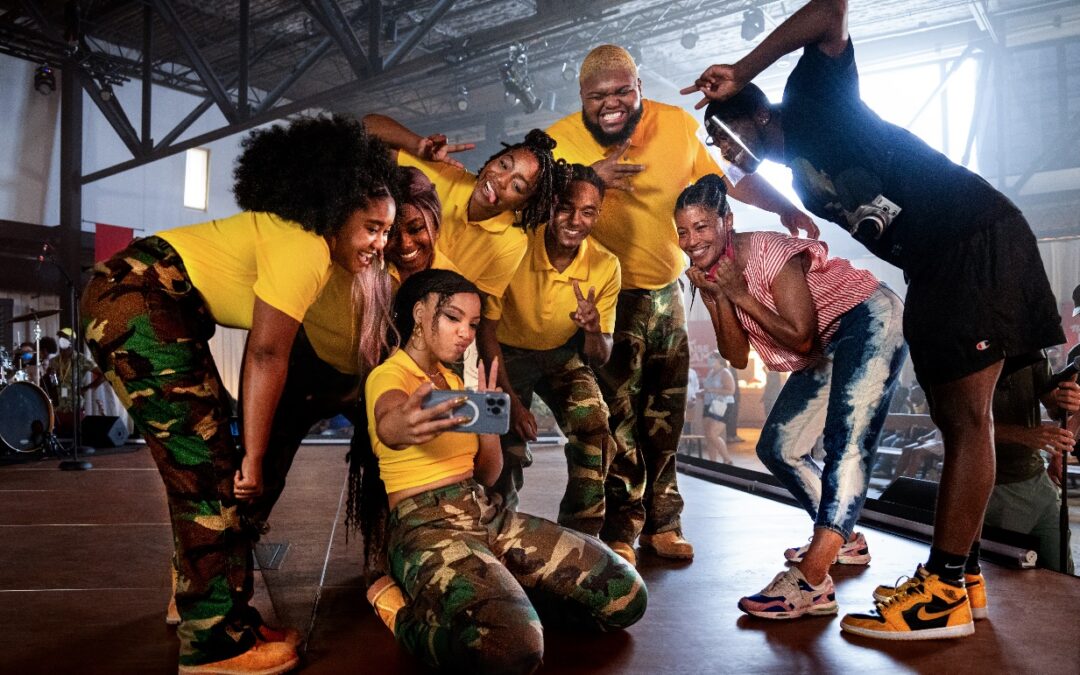

Photos taken by : Jessica Miglio / Universal Pictures (from left) Sam (Chloe Bailey) and Jess (Anjelika Washington) in Praise This, directed by Tina Gordon.
Praise This is a new movie streaming on Peacock that is a fun and inspirational musical comedy that is great for our generation. Chlöe Bailey gives an amazing performance as Sam, Anjelika Washington plays Jess who is Sam’s silly and sanctified cousin, and the musical and comedic star studded cast is rounded out with Jekalyn Carr, Koryn Hawthrone, Druski, Birgundi Baker, Quavo, and more. The music was phenomenal and it has plenty of laughs with an authentic message as the story progresses. UrbanFaith spoke with Anjelika Washington about the film which highlights how acceptance and love from believers can draw everyone to faith Christ. Excerpts from the interview edited for clarity and length are below. The full interview is above, a trailer for the movie is below.
Allen
And I’m really curious, just to get in my first question, what was your inspiration for being part of this film that can showcase so much great music and really have a fun time?
Anjelika Washington
You know, I did not grow up in church. I did go often with my aunties, especially for holidays and things like that. But I grew up raised with Christian values and morals, but didn’t grow up in church. I did have my own come to Jesus moment when I was around 18. And I attended Bible college for a bit before I became a full-time actress. And while I was there, I met quite a few people who from what I learned, were called Jesus freaks. When I read this script, I was like Jess is that person, she’s the Jesus freak. She’s obsessed with God. And just is like, always continuously going after the heart of Christ. But not always for the best reasons. But what I really wanted to showcase that was to make her multidimensional and a real human, because she also was so ambitious, she has dreams, she has other things. And what I really want people to see is how open just was to receiving Sam, she never judged her, she was completely open and embraced who she was, although [they had] very different walks of life. Because she just knew in her heart; “if I love this girl, if I just love her, she’ll change.” She said it from the very beginning, “your testimony is going to be the goat.” [Jess] had this peace and ease that she was led by in the spirit that she just knew Christ would change the heart of Sam in time. She didn’t have to shove it down her throat, or like Bible thump at her. It would happen through love and through acceptance. And I think that it’s a beautiful journey.
Allen
I think that’s so amazing and is such a great point. One of the things I think this movie does so well is it starts out fun and ridiculous. But it really rings authentic as it goes along. I see that in Jess’ journey. It allows us to be able to laugh at ourselves as a church, as people who are believers, but also be able to draw that serious message. Why do you think that’s important for us to be able to have both: laugh at ourselves and to be able to still take our faith in our journey seriously?
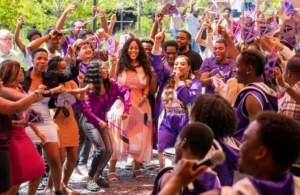
Photos taken by : Jessica Miglio / Universal Pictures (Center) Fallon (Koryn Hawthorne) in Praise This, directed by Tina Gordon.
Anjelika
Yeah, because I think that that’s just the balance of life. Like we can take everything seriously. And we can move through our relationships. However, your relationship is with Christ is your own relationship. So you have that. But also, life is meant to be lived. It’s supposed to be fun, or at least that’s what I believe. And so I think that we should celebrate life. And with that comes enjoying ourselves, enjoying the people that you’re with, enjoying the music, enjoying the food, enjoying your own culture, you know, things like that. And so I really hope that the celebration of culture and gospel that we blended together, does that for people outside of this film as well.
Allen
Yeah, and speaking of that, there were just so many amazing musical artists as well as actors and actresses in this movie. Can you talk about what it was like to be around so many different musical icons and folks working in different spaces?
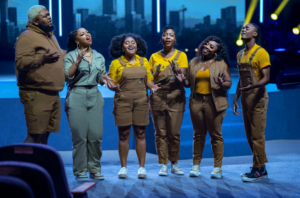
Photos taken by : Jessica Miglio / Universal Pictures (from left) Aaron (Druski), Sam (Chloe Bailey), Jess (Anjelika Washington), Jackie (Kiara Iman), KiKi (Jekalyn Carr) and Jermaine (Ilario Grant) in Praise This, directed by Tina Gordon.
Anjelika
Well, absolutely. I met Jekalyn Carr and Koryn Hawthorne on my first day of rehearsals and they are just incredible, incredible humans. And I mean that just like, behind closed doors no cameras rolling just awesome. Jekayln Carr is now one of my literal bestest friends, I talked to her every single day, we FaceTime all the time. And we both come from completely different walks of life. Like I said, I wasn’t raised in the church and Jekayln Carr was. And I mean, she’s Jekalyn Carr. She’s a star in a very different world. But I think that what brings us together is how we love and accept each other from just very different lifestyles. And it’s so beautiful that we’ve been able to make this friendship. And she’s definitely a spiritual guide and mentor in my life these days. And I’m very, very grateful to her for that. And I hope that reads on camera in the film as well, because this film, while I am a believer, this film is for believers and non-believers. I really do think that everyone can enjoy it no matter what walk of life you’re at, or you’ve been through. And so, I really hope that reads and it brings people together the way it brought us together.
Allen
I appreciate that. And so my last question, Anjelika, this story shows so many young folks like those in our audience who are grappling with how to be successful, and to be faithful and true to themselves. And can you give a nugget of advice or a lesson or takeaway that you would give to young adults who are trying to balance that success with being able to be faithful and authentic?
Anjelika
I would say a couple of things. The first one would be, I remember hearing Bishop TD Jakes saying once [that] interests make you interesting. So you can love Christ and do other things. Like it’s okay to like love Christ, and also love… rock climbing. I mean, I don’t know. But you can have other hobbies and do other things in that way. And still have fun and enjoy your life because you really do only live once. So make the best of your life. And I think that’s also celebrating what Christ did for us. So I think that it’s important for us to enjoy our lives as well. And number two, while all that is true, and I do think that we should enjoy our lives, there are certain things that you shouldn’t compromise on. I don’t think anyone should. So if something compromises a value or your morals… I would say stay true to yourself. It’s okay to say no. While I want everyone to stay open minded, because fun can come in all different forms and shapes. If there’s something that you know in your heart and your spirit is not for you, it’s okay to say no.
Matthew 28:1-10 NLT
1 Early on Sunday morning,[a] as the new day was dawning, Mary Magdalene and the other Mary went out to visit the tomb.
2 Suddenly there was a great earthquake! For an angel of the Lord came down from heaven, rolled aside the stone, and sat on it. 3 His face shone like lightning, and his clothing was as white as snow. 4 The guards shook with fear when they saw him, and they fell into a dead faint.
5 Then the angel spoke to the women. “Don’t be afraid!” he said. “I know you are looking for Jesus, who was crucified. 6 He isn’t here! He is risen from the dead, just as he said would happen. Come, see where his body was lying. 7 And now, go quickly and tell his disciples that he has risen from the dead, and he is going ahead of you to Galilee. You will see him there. Remember what I have told you.”
8 The women ran quickly from the tomb. They were very frightened but also filled with great joy, and they rushed to give the disciples the angel’s message. 9 And as they went, Jesus met them and greeted them. And they ran to him, grasped his feet, and worshiped him. 10 Then Jesus said to them, “Don’t be afraid! Go tell my brothers to leave for Galilee, and they will see me there.”

Death has a sting, a pain that can linger and never leave the soul. The death of Jesus by crucifixion was not a glamorous thing to behold. It was painful, tormenting, heartbreaking and shattering of any form of hope for those who were present. As we read the journey He took, the imagery that plays in our minds reveals how difficult this moment of destiny was for Jesus and His disciples.
When He died, I can imagine a pain of finality that may have been felt by those who loved and cared for Him. Losing someone dear, someone you love and care for is not easy. Losing them to a painful death can be heartbreaking and it can create a traumatic scar that never leaves.
It was important for Jesus to rise up again because the only voice that is capable of shutting down the loud voice of death is life. When He rose on the third day, the powerful testimony of His resurrection was a reminder for believers all over the world to believe, and hope again.
Have you dealt with situations that seem final to you? Are you plagued with thoughts of feeling that life is not worth living? Do you sense or feel that you are at the end of your road? If your answer is yes to any of those questions, you need to fight to live. If you need help, you can get it.
Living and moving conscious of daily decisions that push you to choose better, act wiser, and try for the best takes courage and sometimes can be a battle of the will. However, life has a louder voice than death. The dead cannot breathe air or experience moments.
Do not allow the finality of circumstances, trials, or tribulations make you feel as though life is not fair or worth it. You matter, and your presence in this life, living and learning and growing allows you to make a greater impact than being dead and in the grave. Fight for your dreams, push yourself to achieve the best that you can in this lifetime and believe God to make your life worth living for, because it is.
Dear Father,
Thank you for what you did for me through love, by sending Jesus Christ to die for me. I acknowledge the power of the cross and the reminder that you desire for me to live. Help me today to push myself to live life with joy as Jesus died for me to be filled with peace and joy. Teach me how to maximize my days, weeks and months with what matters, and show me how to use my time here on earth wisely. I desire to live a fulfilled life, and I trust you that you will show me how to.
In Jesus Name,
Amen
Holy Thursday, Maundy Thursday, and I am thinking of that night so long ago. I am putting myself in the scene, this soul-weary, overweight, middle-aged black woman who needs Jesus with everything in me. In my mind I am there with the disciples. I am present with my Jesus. You are there, too. Can you see it? The upper room in the drafty edifice, us stumbling in exhausted. We are starving. It’s just before the Passover Feast. So much has happened. So much will happen.
We gather together for a simple supper. Even Jesus has a kind of weight-of-the-world weariness about him. He’s talked a lot about going away lately, but he is fully present now, and his love has arms that hold us close. Still, a sadness lingers in his eyes. It reminds me of how the poet prophet Isaiah describes him, as a man of sorrows, acquainted with grief.
The table is set, and we recline where we’re seated, grateful to be with him. Our cups are lined like guards before us, full of wine. A basket of bread lies in the center of the table. Later he will tell us the wine is his blood poured out, and the bread his body broken. Later. Now we sit. Night, as thick and palpable as fog, surrounds us. The flames on the candles bow and rise in the breezy room, as if they too, worship our Lord.
Then Jesus sets aside his outer garments and dons an apron like a slave would wear. He pours water in a basin. We exchange puzzled looks.
“Give me your feet,” he says.
We are stunned silent, each of us carefully removing our sandals, unsure of what to say–what to do–faced with such shocking humility. Foot washing is the worst of tasks, despised by a servants gesture. Yet Jesus kneels before us, one by one, and washes our feet. I watch Him move from person to person. Dear God, Jesus is on His knees, pouring water on our rough soles. The Son of God, the Son of Man, washes us as if the pitcher contains, then releases, his own tears. The water slips between our toes, and the filth of the world falls to the ground, ground now hallowed by His presence. We couldn’t help but feel emotional. Some of us wailed as he worked.
He sure knows how to make a mess of things.
When he gets to me I choke out his name, “Oh, Jesus,” I cry. Hot salty tears roll from my cheeks, and drop onto Jesus’ hand as he reaches up to wipe my face. “Master, let me wash yours,” I beg him.
He gently, but firmly refuses me. “What I am doing you do not understand now, but you will after this,” he says to me.
“I can’t let you wash my feet,” I say.
He speaks kindly to me. “If I don’t wash you, you can’t be a part of what I’m doing.” So I let him wash me, my Jesus, dressed as a slave, as I sit there, amazed.
He cleanses us all, every one of us. “Do you understand what I have done to you?” he asks. His brown eyes shine in the candlelight. “You address me as ‘Teacher,’ ‘Master,’ and rightly so. That is what I am. So if I, the Master and Teacher washed your feet, you must now wash each other’s feet. I’ve laid down a pattern for you. What I’ve done, you do. A servant is not ranked above His master; an employee doesn’t give orders to the employer. If you understand what I’m telling you, act like it—and live a blessed life.”
Act like it, and live a blessed life.
Jesus makes things so messy, and then sets them right with such a simple, homely message, but it is good news. When he is done with you, you are washed as white as snow.
It wasn’t too long after that last meal that he left us, only to return in three days, and go again, leaving us with his Holy Spirit. As I reflect on that day, I hear the sound of His voice, resonate, yet soft, and feel His breath warm on my face, as he leaned into me and asked me, ‘give me your feet.’
I think of this every Maundy Thursday, as we world weary travelers, parched and, hurting, and oh so vulnerable, gather. We are looking for Jesus, needing water, and trusting our souls, and soles to his servants. Sometimes we sit shoulder to shoulder reclined. Waiting. Humbled. Remembering. And our feet are washed clean, while God’s slave cradles them in the circle of his tear-stained hands.
Scripture references taken from Isaiah. 53:3, NKJV and John 13:12-17, The Message.


Matthew 21: 18-46
When we left off yesterday, Jesus had committed destruction of property by flipping over tables of transaction and exploitation and uprooting the things that shifted His Father’s house from being relational and full of salvation. That left us to consider what tables we need to flip over, beginning with some of the ones in our hearts. What a mighty God we serve!
We pick up today with Jesus who is heading to the temple, and starts off the morning cursing a fig tree, condemning it saying it would never produce again. While we can argue about how harsh this is or isn’t, what is irrefutable is that the tree wasn’t doing its job, and Jesus had enough. And it seems as though, because He is headed to the temple, He’s not going to be stopped by the trees that aren’t doing their job. He already dealt with that yesterday, and is about to encounter it again.
When Jesus arrives at the temple, He attracts a crowd because, well, He’s Jesus. The crowd He attracts meets Him on the temple floor, and Matthew’s Gospel starts off this encounter with the authorities questioning his authority. Those who are systematically in places of authority and power want to know who or what validates Jesus as an authority figure. One could argue that there is an issue here of will. Because the Pharisees might’ve had the authority, but Jesus Christ, who is amongst the people, has the power. It’s a dangerous world when systemic authority is threatened by the people who have been empowered. I am more than sure that if we look at lived experiences Jesus shows us that just because you have authority, doesn’t mean you have power. Our faith is one that often reminds us that human-given authority is no match for God-given authority. And Jesus responds with a question, that frankly the only way it can be reconciled is with a divine answer.
We then pick-up Jesus who is engaging in what I refer to as the ultimate roasting session. He keeps sharing these parables about working in the vineyard, AND the treatment of the workers. He likens himself as the son of God, to a servant, a worker in the vineyard, and a slave. He keeps reinforcing that He is with the marginalized least of these. Thanks be to God for a savior who constantly positions himself to be for, with, and by the people. It is reassurance to us that no matter who you are, as long as you’re doing your work in the vineyard, serving the kingdom, Jesus says that you’ll inherit the kingdom of God. The Pharisees don’t like this, much like many modern authority figures, and are plotting to murder him. But if the words of Jesus be true: for Himself, for the people, and for us; no plot, no plan, no attack, no assassination, can stop the work of the people. Nothing can negate that we shall inherit the kingdom of God. Get to and keep to your work. Even if you don’t have authority, you always have the power to do your work in the vineyard.
This week isn’t over, and we have a few more lessons to learn, but today, think about what it means to do your work anyhow. After all, Friday soon come….

Video Courtesy of Mario Moton
In the weeks and days leading up to Christmas, the average Christian spends a lot of money, time, and energy preparing for the holiday. While I’ve always considered that time of year to be a very special one, I’ve often wondered why we don’t elevate Easter–or Resurrection Sunday, to use the name that many believers prefer–to the same level. After all, didn’t Jesus come into the world for the very purpose of suffering, dying, and rising again to demonstrate His love and give us new life?
So why don’t we celebrate the day Jesus arose from the dead the way we celebrate the day He came into the world? Well, if I interviewed every believer I know, I’d receive a multitude of opinions. For example, some men and women of faith would say it’s because Resurrection Sunday is more somber than Christmas. When these Christians think about the horrific thing that was done to Jesus to save our souls, they can’t help but be sad. They don’t like thinking–or talking about–the demise of any human being, let alone the torture and death of the One they call Savior. So, while they honor the day Jesus was resurrected, they aren’t inspired to engage in the same type of festivities as the ones they deem appropriate for Christmas.
For other Christians, the difference in how they celebrate these two holidays stems from the fact that they aren’t constantly being courted by retailers that promise to provide just what they need to have a perfect holiday. In other words, as Resurrection Sunday approaches, they don’t feel the same kind of pressure or obligation to buy the right presents or hang the prettiest decorations. So, they don’t do anything special for the holiday. Still others would probably say that it’s simply because, other than Passion Plays or Sunday school programs put on at churches, there just aren’t that many religious traditions associated with the holiday.
But does it have to be this way? Couldn’t we begin today to create our own family traditions that recognize the fact that Jesus kept His promise that He’d die and then, on the third day, be alive again? Isn’t that very fact pivotal to our Christian faith? Isn’t that reason enough for a celebration or, even better, kicking off certain lifestyle changes that will last long after the holiday has come and gone?
Holiday traditions have a wonderful way of ushering in greater spiritual awareness and a renewed commitment to one’s faith. They can provide us with opportunities to fellowship with our brothers and sisters in Christ, as well as share our faith with non-believers. And they can also help us make our faith more tangible in the eyes of our impressionable children.
One way to do this is to set aside time to pray and read God’s Word every day, particularly reflecting on verses that remind us of His Son’s sacrificial love for us. Among the verses you may want to read and meditate on are the following ones: John 3:16; Romans 10:9; Luke 19:10; Romans 5:8; and I John 4:7-10. Don’t feel as though you have to do this alone. Invite your spouse, a prayer partner and even your children to join you. If you already set aside time for devotions, you may want to use the time to not only read them but memorize them. That way, they’ll not just be counted among the many that you perused this year, but listed among those that meant enough to you that you chose to engrave them into your heart and mind.
Reaching out to others during this time is another way to take your appreciation of the holiday to new level. Some people do this by inviting unsaved relatives, friends, or neighbors to go to church with them. Others may opt to host an event–such as a brunch, dinner party, movie night, or even a dessert party–in their home for relatives and friends who appreciate Christian fellowship as much as they do. In addition, those that love giving presents on holidays could consider making homemade gifts–such as sugar cookies made into shapes representative of various components of the Gospel message (e.g., a cross, sheep, stars, etc.)–or purchasing small gifts at their local Christian bookstore.
You also could fill your home, office, and car with sights and sounds that are symbolic of Christ’s life. Little figurines displayed on mantles or tables in your home, as well as small ornaments, hung on bedposts, doorknobs, or even your car’s rear-view mirror could serve as perfect reminders of what God did for us through His Son. If you’ve been thinking about incorporating more faith-based forms of entertainment into your life and home, this is the perfect time to start. Check your local library, video rental store, or favorite bookstore for inspirational titles and schedule a few movie nights. And don’t forget to set aside time to be blessed by the ministry of music, whether you enjoy the gospel, contemporary Christian, holy hip-hop, or sacred jazz. Let it play softly in the background while eating dinner with your family, as you complete chores, and as you’re commuting to and from various places.
Regardless of which traditions you decide to infuse into your life in the coming weeks, what’s important is that you hold on to why you’re adding them. Celebrate the good news of Easter unabashedly so that you, your loved ones, and anyone who crosses your path will have the opportunity to experience a renewed appreciation for Resurrection Sunday and all that it symbolizes for God’s children.
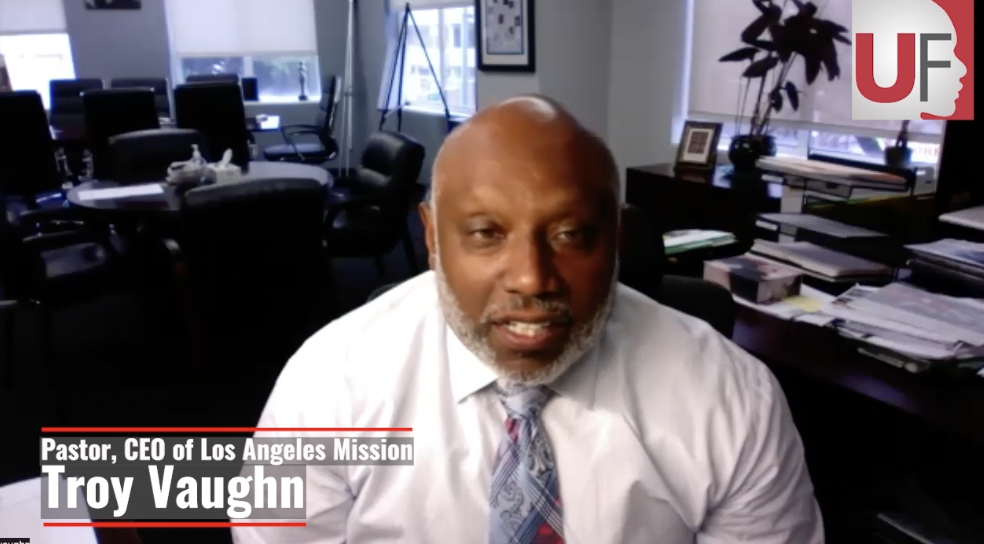
Troy Vaughn is one of the most incredible people you will ever meet, and his work and his words are inspirational at every turn. He is the CEO of Los Angeles Mission, one of the largest non-profits fighting homelessness in the nation and at the forefront of the housing crisis in Los Angeles. He is also the Senior Pastor of Restoration Family Worship Center in Inglewood, CA. After serving in the Marine Corps and encountering tragedy back home he found himself at a low point in life. He was homeless himself and after giving his life to Christ became a successful businessman and minister. Now he is sharing his gifts and his wisdom with the world. UrbanFaith editor Allen Reynolds sat down with Pastor Troy Vaughn to discuss his work, his mission, and how we can be impactful in our community as believers. The full interview is above. More about Troy and his Good Morning America interview are below.
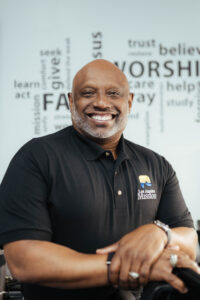
After many years in the Marine Corps, I received the worst news of my life. My father passed away from a drug overdose — and my life shattered into pieces. I started using controlled substances and later cocaine to cope with the emotional trauma. My father’s addiction soon became mine as well. And my life continued to spin out of control until I hit rock bottom. I found myself living on Skid Row and had no hope…
That was until God spoke to me. He told me to leave my cardboard box home and get help. I went through an intense, year-long rehabilitation program to rebuild my life. It gave me the tools for long-term sobriety that truly saved my life.
This experience lit a fire inside of me. Since the day I left that program, I vowed to do everything I could to help others living on Skid Row experiencing the same ills I had overcome.
First, I founded Christ-Centered Ministries to help men and women transition from recovery programs to healthy, stable environments. Then, I became the Pastor at Inglewood Community Church to further help victims and survivors of addiction and homelessness. And for the last 20 years, I have held a range of roles for several non-profits across Los Angeles to fight for better solutions for those on the path of recovery.
Podcast: Embed
Subscribe: RSS
Video Courtesy of CBN – The Christian Broadcasting Network
Recently, a co-worker shared something that enlightened me. They always used a financial counselor to advise them on various decisions that they needed to make regarding their finances and investments. However, they didn’t seem to be satisfied with the outcome of their investments.
They shared with me that, after talking in detail with their spouse, they decided to learn more about investments and the stock market. They signed up for classes and realized they could actually manage their own financial portfolio. They took charge of their investments and began to see a positive turnaround within the first few months of releasing their financial counselor.
They seemed confident about what they had learned and we’re looking forward to managing their financial portfolio in the months and years to come.
The biggest fear that many people have, is the fear of not knowing what you don’t know. That sounds odd but it is true. What you do not know about your finances, or financial health, may seem scary to some to the point of denying its existence or choosing to deal with it when things get really tough.
God desires for us to have balance in everything we do. Having the confidence to handle your finances is a commitment you have to make to yourself. Hosea 4:6 states “My people are destroyed for a lack of knowledge” KJV.
If people are bold enough to admit they do not know, they take the time to educate themselves in the areas that matter to them. So, why not us, children of the faith?
There are so many resources on finances. The question you need to ask yourself is, “What is my area of struggle when dealing with money?”
When it comes to money, you have to be bold and face the issues head on. If you are tremendously blessed financially and have no issues with money, find ways to educate others to live in that liberty that you have been blessed to experience.
I learned a great lesson from that co-worker. What you don’t know, you can learn, and what you learn can enlighten you to make better and sound decisions that can position you financially to be in a stable place.
Are you ready to face what you don’t know about your finances? Start today. Learn something. It could serve as the trigger of change to a great financial future for you in the years to come.
Podcast: Embed
Subscribe: RSS
Dr. Paul Osteen always wanted to be a surgeon, but when he was only a child God planted a seed in his heart to be a missionary. Fast forward decades later he leads one of the largest Medical Missionary conferences in the world through his family church Lakewood where his brother Joel Osteen is the pastor. UrbanFaith contributor Maina Mwaura sat down to discuss the M3: Mobilizing Medical Missions Conference with the one and only Dr. Paul Osteen.

Embarking on the entrepreneurship journey can be a thrilling adventure reminiscent of a roller-coaster ride, with its exhilarating highs, daunting lows, and unexpected twists and turns. While the daily grind of being an actual CEO can be enjoyable, achieving success can sometimes feel like an obstacle course, leading us to question if entrepreneurship is indeed the right path for us.
Obstacles are inevitable in the world of entrepreneurship. However, you can overcome these challenges and achieve your goals with the right mindset and approach. Three essential tips can help you navigate obstacles as a faith-based CEO.
As a faith-based CEO, prayer is a powerful tool to help you overcome obstacles. Keeping God first and at the center of your business decisions is essential. This means taking the time to pray and seek God’s guidance before making any significant decisions.
When you face obstacles, it is essential to trust God even when you cannot track Him. Remember that God’s ways are not ours. Sometimes, His plans for us may not be evident initially. However, with faith and patience, we can trust that God will work all things together for our good.
Prayer is also a great way to stay grounded and focused on what is truly important. When we spend time in prayer, we can be reminded of our purpose and mission, which can help us stay motivated and focused during challenging times.

As a faith-based CEO, it is essential to understand that growth and success take time. It is easy to get discouraged when things take longer than we want them to. However, being patient and allowing yourself time to grow and develop is essential.
Remember that obstacles are not necessarily roadblocks; they can be opportunities for growth and learning. Instead of becoming frustrated when things do not go as planned, try to see obstacles as opportunities to learn and improve.
It is also essential to be patient with others. As a leader, you may be working with people who need to be on the same page or need more time to understand your vision. Take the time to communicate clearly and be patient with them as they learn and grow alongside you.
While being patient with others is essential, it’s also easy to fall into the trap of self-criticism and harsh judgment. However, as a faith-based CEO, it’s crucial to remember to give yourself grace in the process. Building a successful business takes time, effort, and patience, and it’s essential to acknowledge that there will be setbacks and mistakes along the way. Giving yourself grace allows you to learn and grow from these experiences without being weighed down by self-doubt and negativity.
Furthermore, as a mompreneur or anyone balancing multiple responsibilities, it’s essential to recognize that taking breaks and prioritizing self-care is okay. Burnout and exhaustion can easily lead to a lack of focus and productivity, making it vital to take the necessary steps to recharge and refocus. Giving yourself grace and prioritizing self-care creates a space to thrive as an entrepreneur and achieve your goals without sacrificing your well-being.

As a CEO guided by faith, developing a mindset that is comfortable with starting over is crucial. Failure is an inevitable part of the entrepreneurial journey, and it is vital to have the ability to pivot and adapt your plans when God is leading you toward new paths. Ignoring signs of new direction can hinder your progress, making it essential to remain open to God’s guidance and ready to make necessary changes.
It is easy to become attached to a particular idea or plan, but sometimes, letting go and trying something new is necessary. Learning to pivot can help you overcome obstacles and find new opportunities for growth and success.
When you face obstacles, take the time to reflect on what went wrong and what you can do differently. Use this information to adjust your plans and try something new. Remember that success is not about avoiding failure but learning from it and using it to improve.
It’s crucial to remain innovative and adaptable in the face of challenges. Returning to the drawing board and reevaluating your strategies can be an excellent opportunity for growth and development. By reflecting on your business’s strengths and weaknesses, you can identify areas for improvement and implement new ideas and approaches. It’s essential to remain open-minded and willing to try new things, even if it means stepping outside your comfort zone.
Being innovative allows, you stay ahead of the competition and keep your business relevant and up to date. Additionally, remaining innovative and flexible shows a willingness to learn and grow, demonstrating a solid commitment to success as a faith-based CEO.
Overcoming obstacles as a faith-based CEO requires a combination of prayer, patience, and pivoting. You can navigate obstacles and achieve your goals by keeping God at the center of your business decisions, being patient with others, and learning to shift when things do not go as planned. Remember that obstacles are not roadblocks but opportunities for growth and learning. With faith and perseverance, you can overcome any obstacle that comes your way.
—-
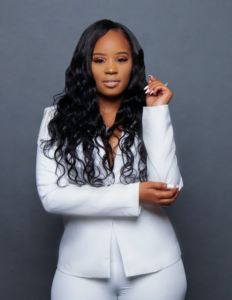 Marquitta DaShae’ Johnson is a transformational leader, speaker, and author who helps faith-driven moms launch high-ticket coaching businesses in 90 days minus burnout. With her Mom To Millionaire model framework and Mommies Making Millions brand, Marquitta empowers mompreneurs to achieve their goals while managing self-care, motherhood, and business. Her mission is to inspire and empower moms globally in the areas of motherhood, mindset, and millions.
Marquitta DaShae’ Johnson is a transformational leader, speaker, and author who helps faith-driven moms launch high-ticket coaching businesses in 90 days minus burnout. With her Mom To Millionaire model framework and Mommies Making Millions brand, Marquitta empowers mompreneurs to achieve their goals while managing self-care, motherhood, and business. Her mission is to inspire and empower moms globally in the areas of motherhood, mindset, and millions.
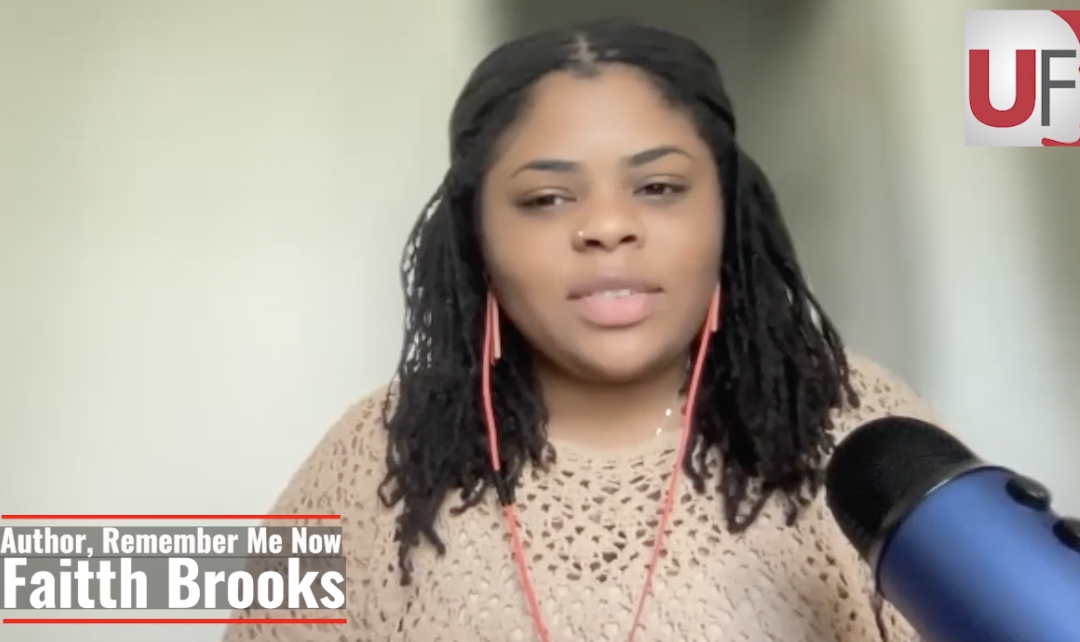
Faitth Brooks believes that Black women’s lives, voices, and journeys need to matter now. Trevor Noah said in his final monologue as a host of The Daily Show that his final thought as host of one of the most recognizable shows in the country is to listen to black women. We need to remember black women now more than ever.
In 2020 at the height of the pandemic there was a national push to support the movement for black lives in the United States of America. After years of challenges, rejection, confrontation and dismissal people from high powered CEOs to rural school teachers wanted to support Black Lives Matter. Combining with the #metoo movement there was a push to talk about the senseless killings of Black women. The country suddenly wanted to remember black women’s lives mattered after Breonna Taylor’s life was taken.
Faitth Brooks was doing antiracist and women’s flourishing work in the aftermath. And after years of reflecting she came to a truth, we need to remember black women now, not only when they have been killed. She tells her story and creates space for other black women to be uplifted in her new book Remember Me Now: A Journey Back to Myself and a Love Letter to Black Women. UrbanFaith sat down with Faitth to talk about her journey, her new book, and her thoughts on how we can join in remembering black women now. More about the book is below, the full interview is above.
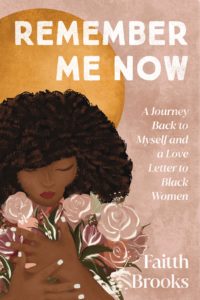

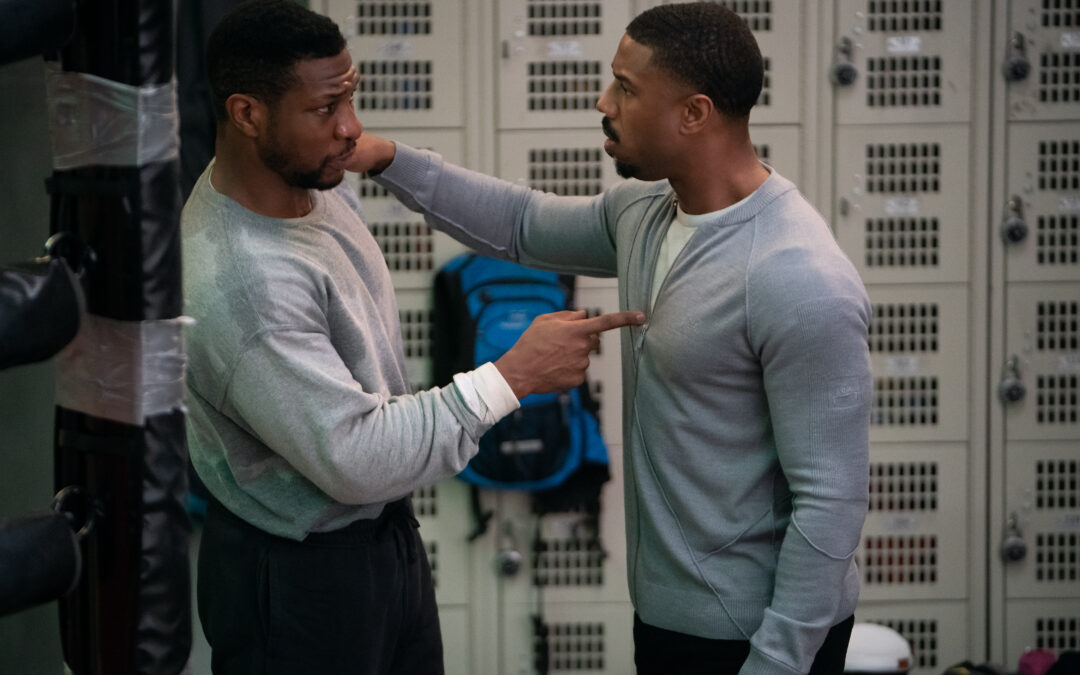
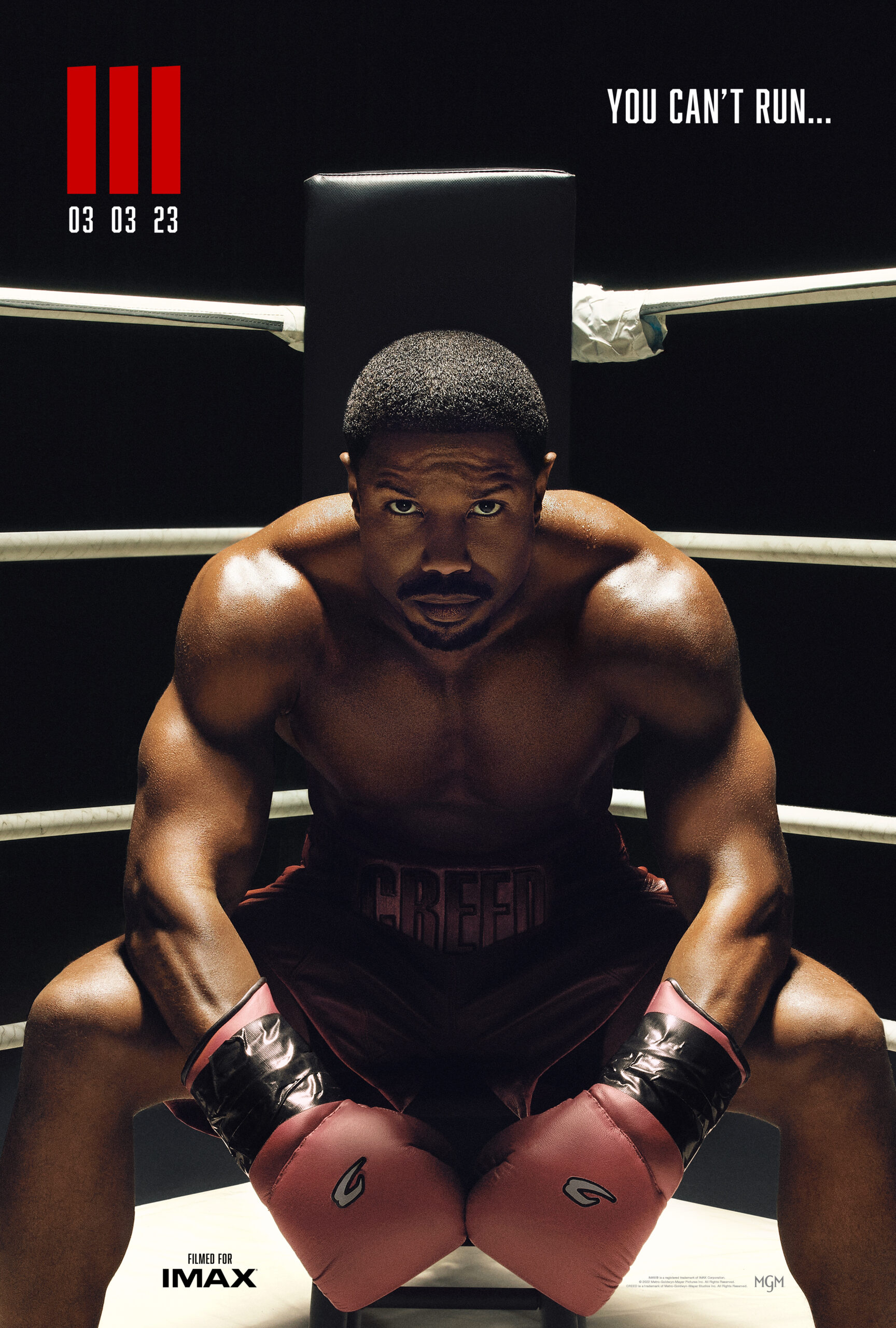
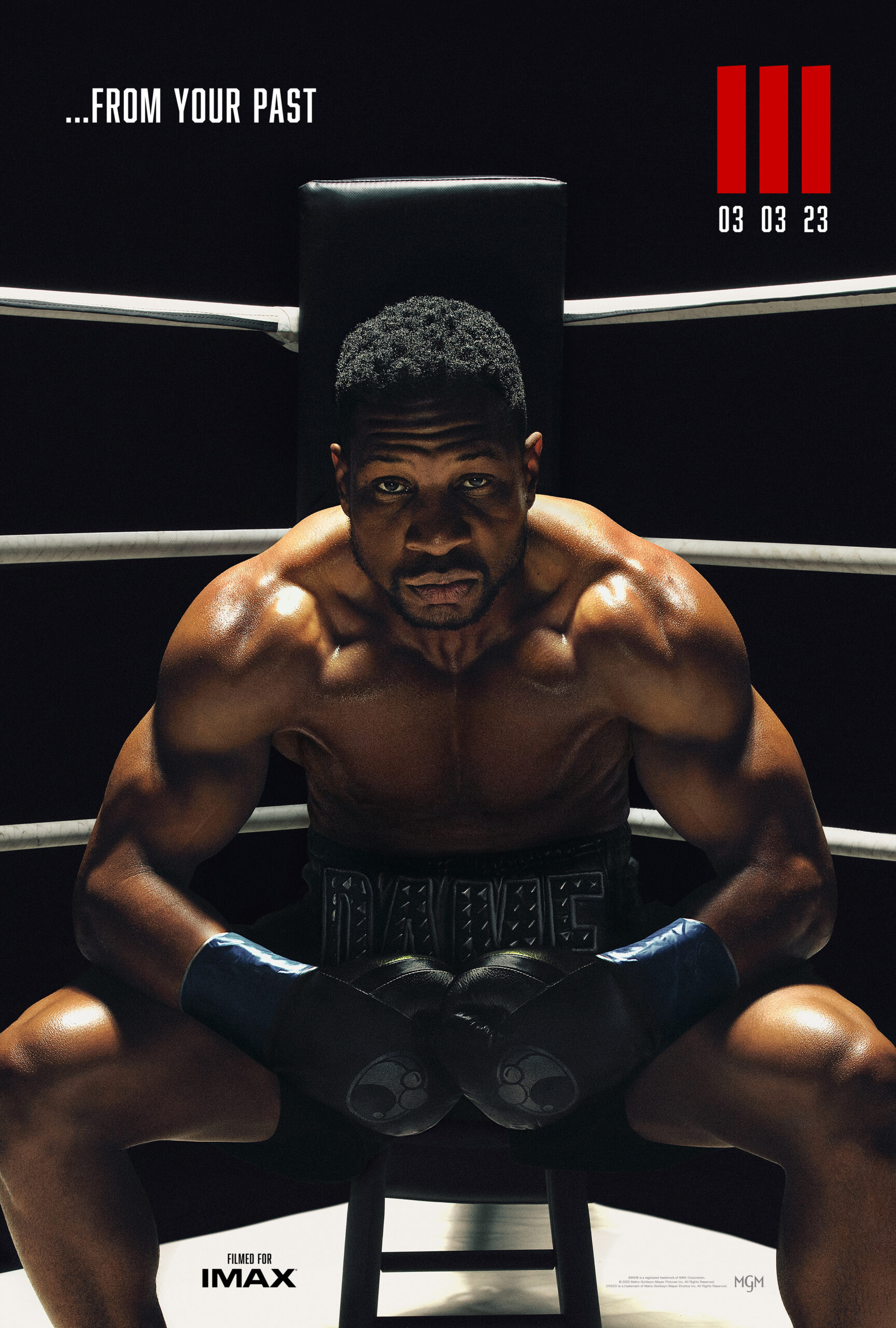
The following is an edited excerpt for clarity, the full audio interview is above.
Allen
I’m Allen Reynolds, the editor of UrbanFaith. I had the opportunity to interview Michael B. Jordan and Jonathan Majors about their new movie Creed III, in theaters everywhere, March 3.
One of the things I thought Creed III did so well was to give space and allow for complexity in emotion and aspiration for black people, but especially for black men. Why was it important for you guys to show joy, loss, sorrow, pride, and you were able to capture so much of that. Why was that important?
Michael B. Jordan
I think because the narrative has often been one note for a long time. Through cinema on a project like this that’s going to get so many eyes, so many different points of view, to show those layers and complexities that is us. That is black men, men in general, but specifically our stories. We wanted to give it the respect and the honesty because we all know a Damian, we all know an Adonis, at some point at some level. And being able to represent those stories in a truthful way was really important to see.
Allen
Another thing that stuck out to me as well was that you have all these different relationships, you have mentor mentee, friendships, black marriage, fatherhood, being a child with an aging parent, and of course rivalry, all of that is so much a part of our story. What was it like to inhabit all those different roles?
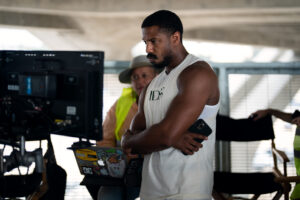
Director Michael B. Jordan on the set of his film
CREED III
A Metro Goldwyn Mayer Pictures film
Photo credit: Ser Baffo
© 2023 Metro-Goldwyn-Mayer Pictures Inc. All Rights Reserved
CREED is a trademark of Metro-Goldwyn-Mayer Studios Inc. All Rights Reserved.
Michael B. Jordan
Felt freeing. Honestly, for me, as a filmmaker, now a real storyteller, in a real way, being able to talk about and show the things that I’ve experienced that affect me in my life. Other people [and myself] have those type of relationships. Also, I think it felt it felt great to do work, I felt completely honest, real, and grounded. We do projects, different movies for different reasons. And all of it may not feel personal, [but] you try to bring a little bit of yourself to these roles. Feels good. It felt good.
Jonathan Majors
I think my mission was a lot different. It’s really a commentary on brotherhood. What [does brotherhood] look like to you? At one point, [Creed] is my best friend, my homeboy, my ally. One point he’s my nemesis. One point, he’s my motivation. The man to that one relationship. We’re gonna continue the relationship between them and beyond as the primary attachment. My mission and my objective was to show the complexity of that relationship. In this one partnership, there’s all these different facets. It’s not just best friend. Sometimes a student- teacher, sometimes it’s beggar-rich man, sometimes it’s prisoner and freemen. There is a slave [and] master within the brotherhood. [Damien] was a coyote, [Creed] was purebred puppy. We were both dogs. Both men were both gladiators were both fighters, but there are these differences. It was difficult to establish those relationships.

Michael B. Jordan stars as Adonis Creed and Jonathan Majors as Damian Anderson in CREED III
A Metro Goldwyn Mayer Pictures film
Photo credit: Eli Ade
© 2023 Metro-Goldwyn-Mayer Pictures Inc.
CREED is a trademark of Metro-Goldwyn-Mayer Studios Inc. All Rights Reserved.
Allen
I think that you guys left so much room, just to see a movie like this with a majority black cast. Black director, I think you’re carrying on legacy of Oscar Micheaux, Spike Lee, of these black directors, right. And you carrying on for these black actors, the Sidney Poitier, Denzel Washington, Phylicia Rashad was in this movie. I mean, it’s incredible. What is it like for you all to be carrying on the legacy of black art and black film from actors’ and directors’ perspective now?
Michael B. Jordan
It feels good. It feels like we’re honoring their path and the race that they’ve been running. It’s our responsibility as filmmakers in the platform that we have and opportunities that we’re given because of their hard work to continue that work, that study, those ideas. Without Sydney, Denzel, and Harry Belafonte and in all the work that they’ve been doing, and have done, we couldn’t have been given this opportunity to run the way we are. We’re just trying to get every drop of juice out of the lemon, say as much as we can, be truthful and honest. And working with Phylicia, is fantastic. Amazing. Yes, ma’am. Anything you want ma’am. (laughs) Just honoring that it’s surreal sometimes, honestly, for me, it kind of it feels larger than life. You know, I have not really been a guy to stop and like smell flowers often. I’m like, what’s next? But when I hear somebody say that and break it down that way, it just kind of hits me like, wow, okay!
Jonathan Majors
For me, it’s all the aforementioned artists Mike named but also Ella Fitzgerald, and Muhammad Ali, and Sam Cooke [whose legacies] we accepted. I know Mike is about to get on that Walk of Fame.
What we are talking about, it means something because he is going to transcend whatever an actor is, and transcend whatever are director is, you’re a part of popular culture. And that may be a bad word, but popular culture is the culture. When you begin to move at that level, you begin to do what Mike has done and is doing, you join the pantheon of these legends. Not only do we feel motivated to continue it, but to grow it. I mean, respectfully, we know things that Denzel, Sydney, and Harry were learning, we grew up knowing those things. It is our job to push it forward. You know, I think what is happening now is there’s a clear establishment of the new Vanguard. And that’s us. Whether or not we want it, it’s us, and [we have a responsibility.] We have athletes joined us in the fray, but it’s about moving the entire culture forward. You know a huge part of pop culture is black culture. The more we mature, the more sophisticated we become, the more intelligent conversations, the more in-depth conversations become, the more complex they becomes, the more we are adding to our culture and the richness of our culture, but also moving everything forward.
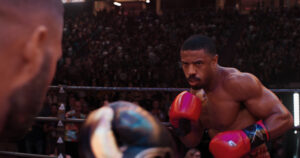
Michael B. Jordan stars as Adonis Creed in
CREED III
A Metro Goldwyn Mayer Pictures film
Photo credit: Courtesy of Metro-Goldwyn-Mayer Pictures Inc.
© 2023 Metro-Goldwyn-Mayer Pictures Inc. All Rights Reserved.
CREED is a trademark of Metro-Goldwyn-Mayer Studios Inc. All Rights Reserved.
Allen
Just pulling back a little bit. You all have both just succeeded so much are two of the greatest black actors in this moment, some of the greatest actors of our generation, if I may say so. And I know that a huge part of that has been growth, and my audience is interested in faith. I know that’s been huge, especially in Jonathan’s journey. Can you talk a little bit about what faith has meant to you all as artists, and even as you continue to climb these ladders and open new pathways?
Michael B. Jordan
Faith, you know, for me is strong. I think we’re in an industry where, you got to have a lot [of faith]. You’re one of many, [who will face] a lot of no’s, a lot of rejection, a lot of obstacles that are in your way, in order for you to see a vision of what success looks like to you. You got to have faith in yourself, you have faith in something bigger than you. I think meditation, spirituality, for me, silence [are impactful]. And then that brings those thoughts that are [helpful] that comes to you. I think it’s extremely important. And also faith in evolving things. I think there’s a way in this industry… a lot of roadblocks that can get in your way and that represent life. As you travel life has a lot of different roadblocks that would come in your way and being the main character of your own movie, as being the hero of your own story, got to have that faith in order to kind of achieve it, reach the mountaintop, so to speak. So that’s something that sticks with me. We have strong faith.
Jonathan Majors
To me [faith] means everything. I know it’s a scary word [in some circles] but I pray all the time. You know this tiny, small little voice, that’s [what has] always guided me. And the building of faith, you know, stepping out on faith. I mean, this whole thing set me off. I hadn’t read the script. This idea of discernment. Michael, and I spoke about that [discernment], that’s what was happening in those 30 minutes [when I was offered the role of Damien]. There’s a Hollywood version where I go, “oh, nice” and I just knew. But I was told. [Or I wouldn’t have done it]. I’ve met Michael’s mother, you know. These are praying, folks. We’ve all been prayed [over] our entire lives and the building of the faith, even having this conversation with you right now. Being asked about [faith], it’s probably a good time, as we both are both tired. I’m not gonna preach. But I have no doubt where my strength comes from.
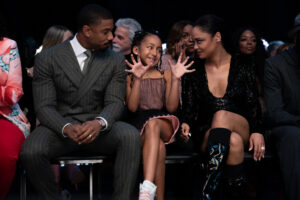
(l-r.) Michael B. Jordan stars as Adonis Creed, Mila Kent as Amara and Tessa Thompson as Bianca in
CREED III
A Metro Goldwyn Mayer Pictures film
Photo credit: Eli Ade
© 2023 Metro-Goldwyn-Mayer Pictures Inc. All Rights Reserved
CREED is a trademark of Metro-Goldwyn-Mayer Studios Inc. All Rights Reserved.
Allen
I appreciate that. Last question for you all. Our audience is young people, young adults, I work with high school actors. What advice would you give to those young folks, young artists who are trying to be successful trying to find their voice. What advice would you give to the next generation?
Michael B. Jordan
Be relentless. I always say be relentless. Find something you care about, that you obsess over, and just go for it. There’s going to be a lot of noise, a lot of resistance. But try not to be distracted by a lot of distractions. [They’re] all around you in a lot of different forms, by way of that little box right there [your phone]. We’re all guilty in a certain way, shape or form sometimes. But I think for young people who grew up with that as the norm [it’s even worse]. I grew up with dial up modems, printing out directions on mapquest lol. That’s, that’s my generation. But a lot of these kids, [smart phones] that’s their truth, that’s their norm. There’s a lot of distraction nowadays. So just being able to put that thing down for a minute and be to your own thoughts, you know what I’m saying, focus, and have the work ethic and not think everything’s so instant and immediate.
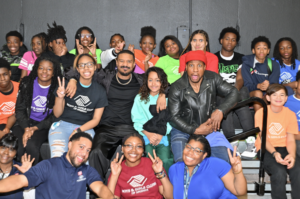
Michael B. Jordan and Jonathan Majors at Boys & Girls Club of Atlanta for Creed III Atlanta Outreach
Because a lot of things they feel like, it’s right now, right now, and it’s not, you know what I’m saying? These are products of years of work, dedication and discipline. And I think, I would always preach it to the next generation, to these young kids, to just find that work ethic, because there’s something true to it. There’s something that nobody can take away from hard work. You put the time in and you can’t they can’t take that away from you. Whether that’s reading, whether it’s mastering the craft, doing your 10,000 hours. That is legit.
Jonathan Majors
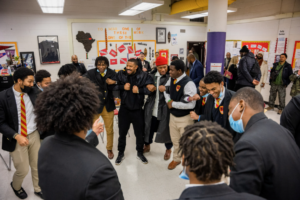
Micahel B. Jordan and Jonathan Majors spend time with students at Urban Prep for Creed III Chicago Outreach
I’m in it now. I would pray for purpose. I would pray for anointing. And once you know what your anointing is, that’s it. A lot of times, we’re just going after the wrong thing. The work ethic, a lot of people think me and Mike just have a dog work ethic. That’s not, not true. But I think something that me and Mike also have in common is that we know what we’re supposed to be doing. We gain a great deal of pleasure from it. It’s our anointing. You hear Michael B. Jordan, it’s not just Michael B. Jordan, something was put in him. Something was put in me, so I have to be aligned with that. When we begin to walk our path, there’s still no’s, there’s still impossibilities… but there’s God. So it’s all good. It’s all good. That’s what I was saying. Then yeah, all the grit and all that…yeah, absolutely. But a lot of times you’re actually just going after the wrong thing. I will say to the young folks, you don’t need your phone yet. Grown ups need phones. We actually have businesses. I don’t use [social media and] stuff like that. But I do understand my colleagues who do. They’re like, in the game, in the matrix, there’s no getting out of it. But for young people, you can keep it so simple. And it can always be simple, unless you complicate it. Suddenly you begin to work through that thing. Then you got to work for it. If you can, if you can abstain for as long as you can. It’ll let you know when you need it. Insta-chat-facebook-tweet. Pay attention a little longer. They won’t last. [Social media we grew up on didn’t last].
View the final movie trailer below
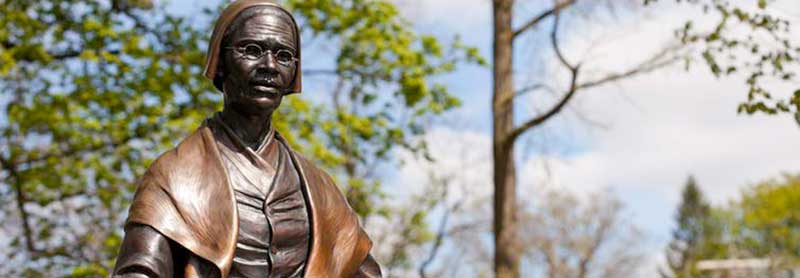

Sojourner Truth Memorial in Florence, Massachusetts.
Lynne Graves, CC BY-ND
Each semester I greet the students who file into my preaching class at Howard University with a standard talk. The talk is not an overview of the basics – techniques of sermon preparation or sermon delivery, as one might expect. Outlining the basics is not particularly difficult.
The greatest challenge, in fact, is helping learners to stretch their theology: namely, how they perceive who God is and convey what God is like in their sermons. This becomes particularly important for African-American preachers, especially African-American women preachers, because most come from church contexts that overuse exclusively masculine language for God and humanity.
African-American women comprise more than 70 percent of the active membership of generally any African-American congregation one might attend today. According to one Pew study, African-American women are among the most religiously committed of the Protestant demographic – eight in 10 say that religion is important to them.
Yet, America’s Christian pulpits, especially African-American pulpits, remain male-dominated spaces. Still today, eyebrows raise, churches split, pews empty and recommendation letters get lost at a woman’s mention that God has called her to preach.
The deciding factor for women desiring to pastor and be accorded respect equal to their male counterparts generally whittles down to one question: Can she preach?
The fact is that African-American women have preached, formed congregations and confronted many racial injustices since the slavery era.
The earliest black female preacher was a Methodist woman simply known as Elizabeth. She held her first prayer meeting in Baltimore in 1808 and preached for about 50 years before retiring to Philadelphia to live among the Quakers.

First African-American church, founded by Rev. Richard Allen. D Smith, CC BY-NC
An unbroken legacy of African-American women preachers persisted even long after Elizabeth. Reverend Jarena Lee became the first African-American woman to preach at the African Methodist Episcopal (AME) Church. She had started even before the church was officially formed in the city of Philadelphia in 1816. But, she faced considerable opposition.
AME Bishop Richard Allen, who founded the AME Church, had initially refused Lee’s request to preach. It was only upon hearing her speak, presumably, from the floor, during a worship service, that he permitted her to give a sermon.
Lee reported that Bishop Allen, “rose up in the assembly, and related that [she] had called upon him eight years before, asking to be permitted to preach, and that he had put [her] off; but that he now as much believed that [she] was called to that work, as any of the preachers present.
Lee was much like her Colonial-era contemporary, the famed women’s rights activist Sojourner Truth. Truth had escaped John Dumont’s slave plantation in 1828 and landed in New York City, where she became an itinerant preacher active in the abolition and woman’s suffrage movements.
For centuries now, the Holy Bible has been used to suppress women’s voices. These early female black preachers reinterpreted the Bible to liberate women.
Truth, for example, is most remembered for her captivating topical sermon “Ar’nt I A Woman?,” delivered at the Woman’s Rights National Convention on May 29, 1851 in Akron, Ohio.
In a skillful historical interpretation of the scriptures, in her convention address, Truth used the Bible to liberate and set the record straight about women’s rights. She professed:
“Then that little man in black there, he says women can’t have as much rights as men, because Christ wasn’t a woman! Where did your Christ come from? From God and a woman! Man had nothing to do with Him.”
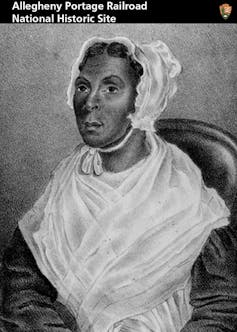
Jarena Lee. TradingCardsNPS (CC)
Like Truth, Jarena Lee spoke truth to power and paved the way for other mid- to late 19th-century black female preachers to achieve validation as pulpit leaders, although neither she nor Truth received official clerical appointments.
The first woman to achieve this validation was Julia A. J. Foote. In 1884, she became the first woman ordained a deacon in the African Methodist Episcopal Zion AMEZ Church. Shortly after followed the ordinations of AME evangelist Harriet A. Baker, who in 1889 was perhaps the first black woman to receive a pastoral appointment. Mary J. Small became the first woman to achieve “elder ordination” status, which permitted her to preach, teach and administer the sacraments and Holy Communion.
Historian Bettye Collier-Thomas maintains that the goal for most black women seeking ordination in the late 19th and early 20th centuries was simply a matter of gender inclusion, not necessarily pursuing the need to transform the patriarchal church.
An important voice was that of Rev. Florence Spearing Randolph. In her role as reformer, suffragist, evangelist and pastor, she daringly advanced the cause of freedom and justice within the churches she served and even beyond during the period of the Great Migration of 20th century.
In my book, “A Pursued Justice: Black Preaching from the Great Migration to Civil Rights,” I trace the clerical legacy of Rev. Randolph and describe how her prophetic sermons spoke to the spiritual, social and industrial conditions of her African-American listeners before and during the largest internal migration in the United States.
In her sermons she brought criticism to the broken promises of American democracy, the deceptive ideology of black inferiority and other chronic injustices.
Randolph’s sermon “If I Were White,” preached on Race Relations Sunday, Feb. 1, 1941, reminded her listeners of their self-worth. It emphasized that America’s whites who claim to be defending democracy in wartime have an obligation to all American citizens.
Randolph spoke in concrete language. She argued that the refusal of whites to act justly toward blacks, domestically and abroad, embraced sin rather than Christ. That, she said, revealed a realistic picture of America’s race problem.
She also spoke about gender discrimination. Randolph’s carefully crafted sermon in 1909 “Antipathy to Women Preachers,” for example, highlights several heroic women in the Bible. From her interpretation of their scriptural legacy, she argued that gender discrimination in Christian pulpits illustrated a misreading of scripture.
Randolph used her position as preacher to effect social change. She was a member and organizer for the Woman’s Christian Temperance Union (WCTU), which led in the work to pass the 18th Amendment, which made prohibition of the production, sale and transport of alcoholic beverages illegal in the United States. Her affiliation with the WCTU earned her the title “militant herald of temperance and righteousness.”
![]() Today, several respected African-American women preachers and teachers of preachers proudly stand on Lee’s, Small’s and Randolph’s shoulders raising their prophetic voices.
Today, several respected African-American women preachers and teachers of preachers proudly stand on Lee’s, Small’s and Randolph’s shoulders raising their prophetic voices.
Kenyatta R. Gilbert, Associate Professor of Homiletics, Howard University
This article was originally published on The Conversation. Read the original article.
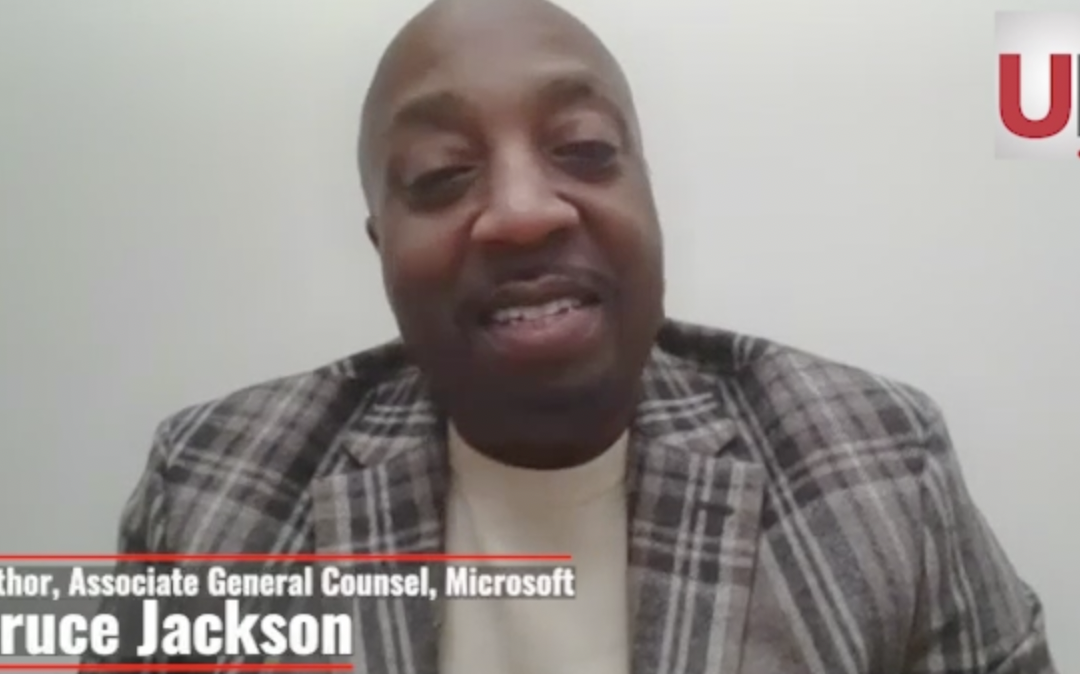
Bruce Jackson wants his story not to be unique. Unfortunately for thousands of kids growing up in urban poverty the way out seems impossible to find. But Bruce gives hope and opens up possibilities by sharing his story of growing up in the projects in Brooklyn, NY to becoming the attorney for Hip Hop legends and landing as the Associate General Counsel at Microsoft. He gives the blueprint in his new book Never Far From Home: My Journey from Brooklyn to Hip Hop, Microsoft, and the Law. UrbanFaith contributor Maina Mwaura sits down with Bruce Jackson, Esq. to discuss his journey and the inspiration he has to help make his story more common through his work. More on the book is below.
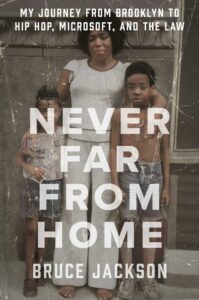
Microsoft’s associate general counsel shares this story that is “as nuanced as it is hopeful” (Hakeem Jeffries, House Minority Leader) about his rise from childhood poverty in pre-gentrified New York City to a stellar career at the top of the technology and music industries in this stirring true story of grit and perseverance. For fans of Indra Nooyi’s My Life in Full and Viola Davis’s Finding Me.
As an accomplished Microsoft executive, Bruce Jackson handles billions of dollars of commerce as its associate general counsel while he plays a crucial role in the company’s corporate diversity efforts. But few of his colleagues can understand the weight he carries with him to the office each day. He kept his past hidden from sight as he ascended the corporate ladder but shares it in full for the first time here.
Born in Crown Heights, Brooklyn, Jackson moved to Manhattan’s Amsterdam housing projects as a child, where he had already been falsely accused and arrested for robbery by the age of ten. At the age of fifteen, he witnessed the homicide of his close friend. Taken in by the criminal justice system, seduced by a burgeoning drug trade, and burdened by a fractured, impoverished home life, Jackson stood on the edge of failure. But he was saved by an offer. That offer set him on a better path, off the streets and eventually on the way to Georgetown Law, but not without hard knocks along the way.
But even as he racked up professional accomplishments, Jackson is still haunted by the unchanged world outside his office.
From public housing to working for Microsoft’s president, Brad Smith, and its founder, Bill Gates, to advising some of the biggest stars in music, Bruce Jackson’s Never Far from Home reveals the ups and downs of an incredible journey, how he overcame many obstacles and the valuable lessons learned along the way.
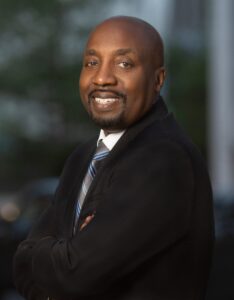
Growing up in a black Baptist community, I didn’t hear much (if at all) about the Church Fathers. However, during seminary I realized that their influence was felt implicitly in the confessions we affirmed, hymns that we sang, the sermons preached, and the doctrines taught during Sunday school or new members’ class. Despite our general ignorance of their lives, the Church Fathers’ influence impacted our faith. These bishops, priests, deacons, and pious lay members of the ancient Christian Church contributed intellectually and pastorally to the development of both the East and Western Christian traditions (Orthodox, Catholic, and Protestant). They debated with both Christians and non-Christians over the meaning of Christianity’s central doctrines including the person and work of Jesus Christ, the Trinity, and the identity of the Church among others.
Many African-Americans, Christian and non-Christian, do not realize that some of the most influential of these theologians and pastors originated from northern Africa. Perhaps confusion about their origins begins within the Christian tradition itself. Despite being of North African descent, Clement, Origen, Athanasius, and Cyril spoke and wrote in Greek while Cyprian, Tertullian, and Augustine wrote in Latin. Hence, both the Orthodox and Roman Catholic Churches refer to them as the Greek and Latin Fathers. Moreover, in the history of medieval Catholicism, European painters depicted some of these Fathers as white European men. Many of these paintings like Botticelli’s painting of Augustine are featured in Western museums and their replicas in textbooks of church history and theology. Despite these shortcomings, African-American Christians must know that the theological and philosophical contributions that these Fathers bequeathed on the formation of Christian doctrine continue to impact our faith and lives.

Tertullian (Illustration Credit: Tim Ladwig)
Tertullian (c. 160 – c. 225) was born in Carthage, Tunisia. The son of a Roman centurion, Tertullian was the first prolific writer of Latin Christian literature, producing extensive works on a range of theological topics. Although not ordained into the priesthood, Tertullian contributed much to the Western Christian tradition. Tertullian was an apologist, defending the Christian faith against both pagans and heretics. Tertullian staunchly distrusted the use of pagan philosophy in understanding Christian faith. His famous rhetorical question, “What indeed has Athens to do with Jerusalem?,” captured Tertullian’s conviction that Christian faith is understood through the teachings of the Judeo-Christian scriptures alone. However, Tertullian made some use of philosophical categories, especially in his teachings on Jesus Christ and the triune God. During his debate with modalists, those who affirm that God exists as a single monad that manifests itself in three “modes” or operations without having eternal distinction between them, Tertullian coined the term trinitas to describe the Godhead and adapted other Latin terms to explain that God eternally exists as one “substance” (substantia) in three distinct “persons” (personae). Although later in life Tertullian defected to the heretical Montanist movement, his works left an indelible impression on future Church Fathers, including the brilliant theologian and biblical commentator Origen (c. 185 – c. 254).

Origen (Illustration Credit: Tim Ladwig)
Born in Alexandria, Egypt, Origen was the first theologian to expound Christian doctrine in a systematic way. Raised in a Christian home, Origen was educated by his father, Leonidas, who was martyred in the year 202 CE. A student of the Scriptures, Origen became a prominent Christian teacher in Alexandria and was a rigorous ascetic. He castrated himself and lived a frugal lifestyle. Moreover, Origen contributed to the Alexandrian school of allegorical interpretation of the Bible by writing extensive biblical commentaries. Origen also contributed to the development of the Trinitarian doctrine teaching that the Son and the Spirit were distinguished from the Father and yet existed eternally with the first person. He claimed that the Son is “eternally begotten” of the Father, the “source” or arche of the other two divine persons. Consequently, controversy arose through this claim that the Son and Spirit were subordinated to the Father, and the orthodox Christian Church later rejected it. Despite his major contributions to theology and biblical interpretation, Origen espoused views, such as the ultimate restoration of all things (Satan included!) and the pre-existence of the human soul that resulted in him being denounced as a heretic.

Athanasius of Alexandria (Illustration Credit: Tim Ladwig)
Athanasius of Alexandria (c. 296 – 373), an archdeacon and secretary to the bishop Alexander (d. 328) rose to acclaim by rigorously defending the full divinity of Jesus Christ and his co-equality with God the Father. Described as a very dark-skinned man of short stature, a hooked nose, and a reddish beard, Athanasius was known for his unrelenting convictions, especially his conviction that the eternal Son of God became human, famously penned in his most influential work On the Incarnation. Later Athanasius defended his position against the teachings of Arius. An Alexandrian priest, Arius (d. 336) taught that the Son, though divine, was a creature, thus sparking the so-called Trinitarian controversy of the fourth century. Arius coined the slogan which spread rapidly throughout Alexandria: “There was a time when [the Son] was not.” To counteract the spread of Arius’ doctrine, Athanasius argued that if Christ was not fully divine, he would have been unable to redeem humankind. Athanasius appropriated Origen’s doctrine of eternal generation and argued that the Son eternally exists and is equal with the Father while maintaining the Son’s distinction. The debate between Arius and Athanasius became so large that Emperor Constantine I convened a church council at his palatial estate at the Anatolian city of Nicaea in 325 CE. The first of seven ecumenical councils, the bishops ruled in favor of Athanasius’ position and rejected Arius’ teaching. The council affirmed that the Son was homoousias – “of the same substance” – with God the Father. This reinforced the orthodox position that only God could save humankind. The controversy continued on in the churches for several centuries; Athanasius endured five exiles by four different Roman emperors over a period of seventeen years. Eventually Athanasius returned to Alexandria where he died and was buried.

Augustine of Hippo (Illustration Credit: Tim Ladwig)
Arguably the most influential of the North African Church Fathers is Augustine of Hippo (c. 354 – c. 430) who single-handedly shaped the entire Western Christian tradition throughout the Middle Ages. A preeminent philosopher, bishop, and theologian, Augustine was born in Thagaste, an ancient city which is now Souk Ahras, Algeria. Augustine grew up in a household of a devout Christian mother, Monica, and a pagan noble father, Patricius, who later converted to Christianity. Augustine penned his journey of his life and his conversion to Christianity in the book Confessions, which is, arguably, the first biography written in Western literature. In this book, Augustine, in the form of prayer, describes his childhood and his education in Latin literature and philosophy, his self-described unruly personality, and his insatiable passion for women during his teenage years. As a young man, Augustine lived with a young woman who became his lover, and they had a son named Adeodatus. Despite being raised a Christian, albeit not baptized, Augustine joined a gnostic group called the Manicheans. After nine years, Augustine left the Manicheans and moved to Milan to teach rhetoric. It was there that he discovered Neo-Platonism and then the teaching of bishop Ambrose of Milan. In 387 CE Augustine converted to Christianity. In 391 CE Augustine was ordained to the priesthood and a year later became bishop of Hippo, now Annaba, Algeria. Augustine served as bishop until he died on August 28th in the year 430 CE shortly after the Vandals sieged Hippo.
Among Augustine’s other influential works include On Christian Doctrine, Enchiridion, and On the Trinity, a book which took Augustine twenty years to complete. Augustine’s fight with the Donatists over the meaning of the Church and his quarrel with the priest Pelagius over the doctrine of original sin and grace shaped the entire Western Christian tradition. Augustine’s other major work, The City of God, shaped the Western political philosophy. Furthermore, Augustine’s understanding of human nature has influenced, not without controversy, Western Christian teachings on human sexual relationships.
African-American Christians should understand the history of the Church Fathers for the purpose of understanding how Africans played a pivotal role in shaping Christian tradition long before the tragic event of the Atlantic slave trade. To be clear, the North African Church Fathers were not “black” in the modern sense. Indeed, these men were indigenous people of the African continent. Because of their own indebtedness to Greek and Latin philosophy, we do not have to agree with everything that the Church Fathers taught. However, we can celebrate their witness as fellow pilgrims on the journey of faith and as spiritual ancestors who “earnestly contended for the faith that was once delivered to the saints” (Jude 1:3).
Now, when I open the red “New” National Baptist Hymnal during worship, or when I study the Baptist confessions of faith for ordination, I sing and study with a new understanding and appreciation for what these men struggled to articulate. I also sing with amazement knowing that Africans significantly played a part in cultivating the entire Christian intellectual tradition. Despite my adolescent ignorance, I now reclaim these African Church Fathers as spiritual and intellectual ancestors who taught me not only to reverence the mystery of God through word, thought, and deed, but also to celebrate the African heritage of Christianity through the witness of a few faithful men of color.
For further reading, see:
Drobner, H. R., and S. S. Schatzmann, The Fathers of the Church: A Comprehensive Introduction. Peabody, MA: Hendrickson Publishers, 2007.
Oden, T. C., How Africa Shaped the Christian Mind: Rediscovering the African Seedbed of Western Christianity. Downers Grove, IL: InterVarsity Press, 2010.
Placher, W. C. A History of Christian Theology: An Introduction. Louisville, KY: Westminster John Knox Press, 1983.
Plantinga, R. J., T. R. Thompson, and M. D. Lundberg, An Introduction to Christian Theology. New York, NY: Cambridge University Press, 2010.
Jason Oliver Evans is a licensed Baptist minister. He graduated with a Bachelor of Science in Speech Communication from Millersville University of Pennsylvania. He also earned a Master of Divinity at Duke University and a Master of Theology from the Candler School of Theology at Emory University. His research interests cross the intersection of theology, ethics, and critical cultural studies. Evans is especially interested in the meaning of the Christian life and its relationship with sexuality, race, and gender in Afro-Christianity. He plans to pursue doctoral studies. Follow Evans’ blog, I Am a Son of God. Follow him also on Twitter at @joliverevans and Facebook.
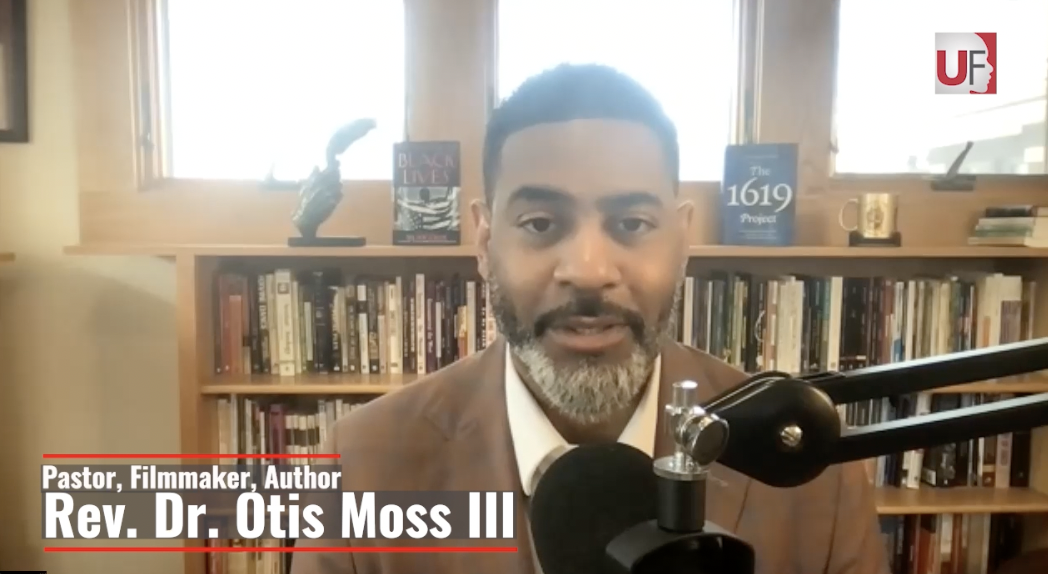
Rev. Dr. Otis Moss III is one of the most prolific prophetic voices of our generation. He is the Senior Pastor of Trinity United Church of Christ in Chicago, IL and his new book Dancing in the Darkness gives practical wisdom to face the darkness in our lives with prophetic hope. UrbanFaith editor Allen Reynolds sat down with his fellow HBCU and Yale alumnus, the one and only Rev. Moss to discuss his new book Dancing in the Darkness: Spiritual Lessons for Thriving in Turbulent Times. You can find the book everywhere books are sold and more about the book is below.
Rev. Moss serves as Senior Pastor of Trinity United Church of Christ which was the home church of President Barack and Michelle Obama. He has won multiple awards for his short film Otis’ Dream about his grandfather’s fight to vote in the United States. His parents were on the front line of the Civil Rights Movement, and he has been at the forefront of the fight for justice and civil rights in the 21st century. He calls himself a blues man committed to uniting love and justice in the tradition of Rev. Dr. Martin Luther King Jr. More about the book is below.
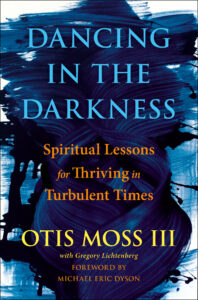
Once again, as Dr. Martin Luther King, Jr. first observed in the 1960s, it is midnight in America—a dark time of division and anxiety, with threats of violence looming in the shadows. In 2008, the Trinity United Church in Chicago received threats when one of its parishioners, Senator Barack Obama, ran for president. “We’re going to kill you” rang in Reverend Otis Moss’s ears when he suddenly heard a noise in the middle of the night. He grabbed a baseball bat to confront the intruder in his home. When he opened the door to his daughter’s room, he found that the source of the noise was his own little girl, dancing. She was simply practicing for her ballet recital.
In that moment, Pastor Moss saw that the real intruder was within him. Caught in a cycle of worry and anger, he had allowed the darkness inside. But seeing his daughter evoked Psalm 30: “You have turned my mourning into dancing.” He set out to write the sermon that became this inspiring and transformative book.
Dancing in the Darkness is a life-affirming guide to the practical, political, and spiritual challenges of our day. Drawing on the teachings of Dr. King, Howard Thurman, sacred scripture, southern wisdom, global spiritual traditions, Black culture, and his own personal experiences, Dr. Moss instructs you on how to practice spiritual resistance by combining justice and love. This collection helps us tap the spiritual reserves we all possess but too often overlook, so we can slay our personal demon, confront our civic challenges, and reach our highest goals.

Last summer, the media couldn’t get enough of the word “entanglement” as actors Will Smith and wife Jada Pinkett Smith confronted rumors about infidelity in their relationship on an episode of Jada’s Red Table Talk show on Facebook.
The couple displayed a united front, forgiving the indiscretion, and committing to their partnership no matter what happens. For over two decades, people have been attempting to redefine marriage. And as commendable as pledging a lifelong commitment is, there is no difference between that and how God intended for us to approach our marriages.
Marriage used to mean a union between one male and one female, but it’s increasingly becoming a socially constructed concept with multiple meanings. People with nontraditional views of marriage seem to look down on others as closed-minded or inferior when they don’t waver in their traditional beliefs on marriage.
Additionally, the concept of a life partner is gaining traction, as though it supersedes marriage. However, if one looks at how God originally designed marriage, there is no need to create a “better” concept of the dyadic relationship. Perfection can’t be improved upon; it can only be tainted.
In Mark 10, Jesus says, “Let no one split apart what God has joined together.” Those who take this at face value will automatically see the lifelong commitment implication here. The biblical version of marriage isn’t the problem; people have started to consider these sacred words as optional.
Marriage is becoming more about how we feel rather than what we do. If we feel okay with our spouse’s actions on a particular day, we are more likely to want to stay married. If we’re going through a season in our relationship where things seem strained, or we feel disconnected from our spouse, then we look for exit strategies.
Soon, a habit that our spouse has had since we’ve known him becomes magnified, as well as their other flaws. Or we retroactively recall how we never prayed about this marriage in the first place and begin to convince ourselves that this person wasn’t who God intended for us, forgetting how initially, we thanked God for sending us a “soulmate.”
Suddenly, what was a blessing, turns into the biggest mistake that we’ve ever made in our lives. (At least that’s what we tell ourselves.) It isn’t that God’s statutes have changed. We’ve changed our minds and we want to make the Word fit our scenarios.

The Smiths have openly shared how they began to redefine their union during rough patches in their relationship. While some may consider it amazing that this couple has found a way to stay together, others may find the terminology and overall explanation hubristic as it implies that a life partnership somehow transcends God’s plan for marriage. When one enters into a marital relationship with the mentality that there are no exit doors other than death, then the lifetime commitment doesn’t have to be an addendum. It’s built into the fabric of the relationship. When one truly embraces all the components of love, as outlined in 1 Corinthians 13:4–7, there is grace for flaws.
Furthermore, an “entanglement” doesn’t have to be the end of a marriage but could signify the beginning of a new and better one. While marital healing from “entanglements” requires contrition from the entangler and forgiveness from the spouse, couples must learn that infidelity isn’t the problem in a marriage, only a symptom.
Having a life partnership mentality toward marriage is great, but it shouldn’t replace what God has already perfected. Marriage isn’t a meaningless piece of paper or a man-made control mechanism. It’s a God-ordained institution that pre-dates sin. In its heyday, it was flawless. Now that we are inhabitants of this broken world, it’s stained by ideologies and philosophies that attempt to undermine its importance.
A life partnership may be a verbal contract between two people, but a marriage is a covenant between the couple and God. When we realize that, we don’t have to find creative ways to ensure that we stay together because we’ve already decided that we would when we began our journey.
The Church is supposed to be a haven for people.
It is often said that the church house is like a hospital, and the believers are the patients searching for healing. If you believe that to be at least somewhat true, then I think we should talk about what spiritual services are—and are not—being provided in the church.
We often talk about how to deal with finances, sickness, employment issues, death of loved ones, and even relationships, but one of the things that we rarely, if ever, talk about in church is sex.
Of course, the church has a biblical interest in advocating that sexual relations occur within the confines of marriage. However, church folk have gotten so good at phrases such as, “just say no,” “not until you’re married,” and “save yourself for that special someone,” that when Christians do get married, especially young couples, some may find that members of the church are at a loss for words about what to tell them when they have questions about sex.
So many people, especially young people, who wait until marriage to have sex get to their wedding night, honeymoon, and beyond and have no clue on what a healthy, sexual relationship with their spouse looks like. (And that’s not even considering the weird, sexual comments and questions that church people do feel strangely comfortable discussing. I can’t tell you how many times church folks have asked, “So when are you all going to give us some babies?”…as if our children will be theirs. It also seems as if they should dictate when we should have offspring and as if when my wife and I do decide to try for children – which involves sex – is any of their business! But I digress…)
Plenty of married couples have problems in their sex lives and want to talk to their pastor about it or have a forum about what sex means for their Christian walk. But, too often, neither the pastor nor the church want to talk about it.
Believe it or not, sexual intercourse could be considered a holy act between a husband and wife. Sex has the power and potential of drawing the bride and groom closer to one another and to create life. If that isn’t holy, I don’t know what is.
So why should the church have responsible conversations about sex? Here are a couple of reasons:
Too often when people try to bring up sex, the inclination is to tell them to stop talking about it because it’s “taboo,” “dirty,” “fast” or (worst of all) “unholy,” and it quells a much-needed conversation. However, these conversations need to be had – or avoided – at the appropriate level and age of those in question, including teens.
The church has to realize that if we’re not educating teenagers and young adults on godly principles about sex, then someone somewhere is educating them about sex. And, more than likely, God has nothing to do with their teaching.
Many church people have no problem talking about and encouraging married couples to have babies, but they like to pretend that the magical decision to start a family comes without sex. Well, it doesn’t.
In fact, many would argue that sex is just as much a part of the list of marital issues as budgeting, child-rearing, career conflicts, intimacy, not spending enough time together, bad habits, and other common marital problems. Of course, sex conversations, like all other marital conversations, should be initiated by the couple. However, if they have an issue that they raise with other members of the church community, we should be willing to tackle it—including sex.
Ultimately, sex is one thing about humanity that I don’t imagine will go away anytime soon. (And if it did, we’d be in trouble.) God created and ordained sex as a blessing for married couples and we shouldn’t shy away from that. Another thing that I don’t think will be going away anytime soon is sin. Yet, I think that the church needs a reminder that sex itself is not sinful. Sex is blessed and ordained by God and too often we foolishly conflate sex with sin and we shouldn’t.
Why do you think sex continues to be a topic that’s off limits for married couples in the church? Share your thoughts below.

Loving bravely is risking great personal cost to do good for someone, even when you know that others may ridicule you for doing so. That’s the kind of love I want to give this Valentine’s Day.
This Valentine’s Day, I’m gonna try something different. Something brave.
Brave, as in, “this-year-I-will-forgo-typical-expressions-of-love-and-instead-donate-to-her-favorite-cause” bravery.
No, that’s not what I’m planning. I’m just offering that as an example. Eschewing a gift for a donation is the kind of thing that you only do when you really know somebody well, because if you’re wrong, you will pay for it. (All the married men should be nodding their heads right now.)
That’s what I mean by brave. Something unexpected that shows how much you care, something that might seem reckless, but is, in fact, very meaningful.
I have some work to do in the bravery department. Holly and I have been married for five years now, and unfortunately, I set the bar pretty high when we got engaged.
A friend of mine was the worship director at a megachurch in the area, and his band was planning on covering Beyoncé’s “Crazy In Love,” for their worship service, since they were doing a series on relationships. So he asked me in advance to write another rap for it and bust it out during the service. So I upped the ante, and with their permission ahead of time, I wrote the rap verse as my will-you-marry-me speech, and during the middle of the song, I jumped off the stage and came down to where Holly was sitting, got down on one knee, and asked her to marry me.
It was so romantic.
Afterwards, I got mad cool points for going to such a length to surprise her. Afterwards, everyone kept echoing the same sentiment: Man, that was so brave.
Far be it from me to revise, as my grandmother used to say, even a jot or a tittle from the Bible. However, if I were to bring any editorial changes to an iconic biblical passage, I would choose 1 Corinthians 13, and right after “love is patient, love is kind,” I would add a third clause: “Love is brave.”
‘Cause seriously … ladies dig bravery. And for good reason.
Think of great leading men in popular films:
• Cary Elwes throwing himself down the hill in The Princess Bride.
• Bruce Willis fighting the terrorists in Die Hard.
• Will Smith trying to express his feelings in Hitch.
These are characters who found themselves in unfamiliar territory, and against all odds, they chose to do something good to help someone else, and found themselves being stretched (or in Smith’s case, swollen and contorted) beyond capacity in the process.
These are universal themes, for sure, but the common element here is bravery: the massive chutzpah required to stare down adversity and do the right thing anyway. It’s the stuff heroes are made from.
It’s important, though, that we not get confused about what bravery is, and more importantly, what it isn’t. Being brave, for example, is not the same thing as simply going against the flow.
Awhile back, I avoided seeing a huge James Cameron blockbuster, mostly because I figured I already had a pretty good handle on how it ended (the boat sank), but also because I got tired of the hype. I just decided at some point that I’m going to be The Guy Who Never Saw Titanic, just to show up everyone else who thought it was so great.
The sad part is, I’m tempted to do the same with Avatar, even though I’ve read countless reviews and articles (including this one by UF’s Todd Burkes) that suggest that it’s a film experience worth having. It’s like I’d rather be the guy who didn’t see it, even if it means I miss out on seeing a great film.
Being contrarian is quite a marketable skill these days, because if you want to be a celebrity in today’s celebrity-saturated media marketplace, you have to do something to stand out from the rest of the pack. The quickest, easiest way to do that is to find a stance that is accepted as conventional wisdom, and then oppose it as vociferously as possible. This is why the Internet is full of people who oppose relatively normal things, like certain type faces, or even lowercase i’s next to capital letters.
(If you didn’t get that last reference, it’s ’cause you didn’t follow the link to the word “tittle” earlier. Go ahead, it’s not naughty or anything.)
This desire to stand out, in my opinion, is why former-NBA-journeyman-turned-culture-critic Paul Shirley once penned a crude diatribe suggesting that Haitian citizens are culpable for their deplorable living conditions. Even though there are points he made that I agree with, I don’t think it was a particularly brave thing to say. He was looking to get a reaction, and he got one. People will accuse Shirley of many things, but loving too much is not one of them.
Loving bravely is not just taking an unpopular stance; it’s risking great personal cost to do good for someone, even when you know that others may, in fact, ridicule you for doing so.
This is the truest essence of love, and as Christians we see it all over the Scriptures.
Consider this passage from 1 John 4:
Dear friends, let us love one another, for love comes from God. Everyone who loves has been born of God and knows God. Whoever does not love does not know God, because God is love. This is how God showed his love among us: He sent his one and only Son into the world that we might live through him. This is love: not that we loved God, but that he loved us and sent his Son as an atoning sacrifice for our sins. Dear friends, since God so loved us, we also ought to love one another. No one has ever seen God; but if we love one another, God lives in us and his love is made complete in us.
This idea of sacrificial love, of doing for others what they cannot do for themselves, is one of the foundational principles that underscore all the worldwide efforts at Christian evangelism. And evangelism, as we all know, takes on many form — some subtle, and some not so subtle. The best strategies are ones that require truth and vulnerability, but still are basic and doable.
I’m reminded of “The Best Stuff In the World Today Café,” a cool little ditty by Take 6 with a nifty analogy of evangelism imagined as a downtown restaurant:
Time for lunch, my stomach said
I left the office to get fed
I had dined at every place on Main
My appetite was ripe for change.
And there stood this old restaurant
I had never seen before
And a stranger in an apron
Came bursting through the door and said
‘Welcome to The Best Stuff In the World Today Cafe
We are all believers in a better way
We were served as customers not so long ago
Now we are all waiters, we thought you oughta know’
It’s a clever song, and given the abundance of vocal talent in Take 6, I could probably listen to them sing pages of HTML source code and still love it.
Still, I wonder … what would happen if we really tried this? What would happen if I really grabbed someone off the street on an average Sunday morning and told them, “I don’t care what you planned to do, you gotta try this Jesus thing?”
I don’t know what would happen.
And that’s why it’s such a scary proposition in real life. Maybe that person would undergo a dramatic, Paul-on-his-way-to-Damascus conversion to Christianity. Or, maybe that person would give me the stink eye and say, “Dude, get your hands off me.” That’s why it’s such an act of bravery to put yourself out there like that.
And whether we recognize it or not, this holiday that we celebrate every February 14th, the one that was seemingly invented by purveyors of greeting cards, flowers, stuffed animals, and expensive chocolates … you know, Valentine’s Day?
Its origin is rooted not in empty sentiment, but in bravery.
Consider the following, courtesy of Wikipedia:
• The name “Valentine” is derived from the Latin valens which means “worthy,” and which bears etymological resemblance to our English words “valor” and “valiant.”
• The holiday itself has roots in the Roman Catholic liturgical calendar, where it was known for centuries as the feast day of Saint Valentine
• All the romantic sentiment related to love and courtship that has been traditionally associated with this feast originated with works of art like Jacobus de Voragine’s thirteenth century Legenda Aurea (The Golden Legend) and Chaucer’s fourteenth century poem “Parliament of Foules”
• The name St. Valentine is actually an umbrella name for a number of martyred figures throughout church history, many of whom were known for various acts of kindness and bravery
• These acts include marrying and otherwise providing aid to Christians persecuted under the reign of emporer Claudius, and restoring the sight and hearing to the daughter of the jailer who subsequently imprisoned him
You put all that together, and it becomes evident that all of the sentimentality on display every year is just our society’s misguided yearning for a purer, less self-centered version of love than what we see in the movies, on television, and in gossip magazines.
It’s misguided because, sadly, we as a society keep returning to those same movies, TV shows, and gossip mags to inform our ideas of what true love looks like.
That’s why it’s incumbent on us as Christians to show, as Paul said, a more excellent way.
So this Valentine’s Day, I say be brave.
I can’t tell you what that act of bravery should be, because it’ll be different for all of us. Maybe it’ll mean being honest and really sharing feelings and issues that you would rather keep buried. Maybe it’s going out of your way to show your spouse that you love them, and doing so in the way that they really appreciate, rather than the way you happen to be good at.
Maybe it’s just stopping, out of the blue, just to say, “I love you.”
But whatever you decide, step on out there and do it.
And if it involves rapping a marriage proposal in the middle of a Sunday-morning worship service, don’t tell them I sent you.


Don’t Miss The Celebrating Our Heritage Section!
As Black History Month commences, here are a few must-have books from Black authors, spanning time periods, themes and genres. However, one thing they have in common is critical acclaim and a strong command of tackling the Black experience with grace, courage, originality, and historical context, making them essential reads during Black History Month and throughout the year.

Ralph Ellison’s masterpiece novel is frequently included on the list of must-read American books by one of the most prolific Black authors. The story follows an African American man whose color renders him invisible. It’s a groundbreaking take on a racially polarized society and the struggle to find oneself through it all.
The 2012 novel by Morrison tells the story of a 20-something Korean War veteran and his journey home from an integrated army to a segregated society. The book was named one of the best novels of 2012 for its careful consideration of mental illness, race relations, family, history, and the concept of home.

Baratunde Thurston, a longtime writer for The Onion, serves up laughs with this collection of comical essays, such as “How to Speak for All Black People” and “How To Celebrate Black History Month.” Thurston covers social interactions and media portrayals with an insightful and satirical perspective.
James Weldon Johnson, creator of the Black National Anthem “Lift Ev’ry Voice and Sing,” first published God’s Trombones in 1927 as a book of poems. The poems take on the structure of a traditional sermon and tell several different parables and Bible stories, some of which specifically focus on the African American story. Dr. Cornel West and Henry Louis Gates have called this collection one of Johnson’s most notable works.

From the best-selling author comes a poignant tale of life and race in the inner city. Coates explains how his father worked for his sons to obtain a free education and escape Baltimore’s drug culture. This inspiring book tells a powerful narrative about community and honoring your history across generations.
Citizen is an award-winning collection of literature blurring the lines between poetry and criticism. Divided into seven chapters, it provides a powerful meditation on race that creates a lyrical portrait of our current social and political climate. Hailed as “a dazzling expression of the painful double consciousness of Black life in America,” according to the Washington Post. Citizen is said to feel like an “eavesdropping on America.”

You may think you know Malcolm X, but you’ve never read anything like Marable’s highly-regarded biography, which provides new perspectives and information on the controversial leader. Marable connects Malcolm’s life with other leaders, faith, and Black Nationalism in a masterful, historical context and call for social change.
In this novel, an African American teenager spends a summer with his brother in 1985 Sag Harbor. The work is more personal than most of Whitehead’s books and explores race, class, and commercial culture in light of a newer generation of Black Americans who are less marked by their color.

In a classic tale, Wilkerson chronicles the journey of three African Americans who took part in the massive movement from the South to the North, Midwest, and West that millions of Black families took in the 20th century. The Warmth of Other Suns is an acclaimed historical account that studies a definitive period in American history.
This extensive collection of poems was hand-picked by Hughes, himself, prior to his death in 1967 and span his entire career. They offer a breathtaking look at being Black in America that is contemplative, celebratory, gut-wrenching and praiseworthy. From “The Negro Speaks of Rivers” and “The Weary Blues,” to “Still Here” and “Refugee in America,” this collection directs us to fight, believe, dream, and claim our self-worth.

In this riveting memoir, Beals recounts her time on the front lines of school desegregation as a member of the Little Rock Nine – the group of African-American students who famously integrated Arkansas’ Central High School. Her account of the harrowing experiences that forged her courage will stick with you long after the last page.
Video Courtesy of LEFT ON READ
Are there other titles that you’d like to add to the list? Share them below.
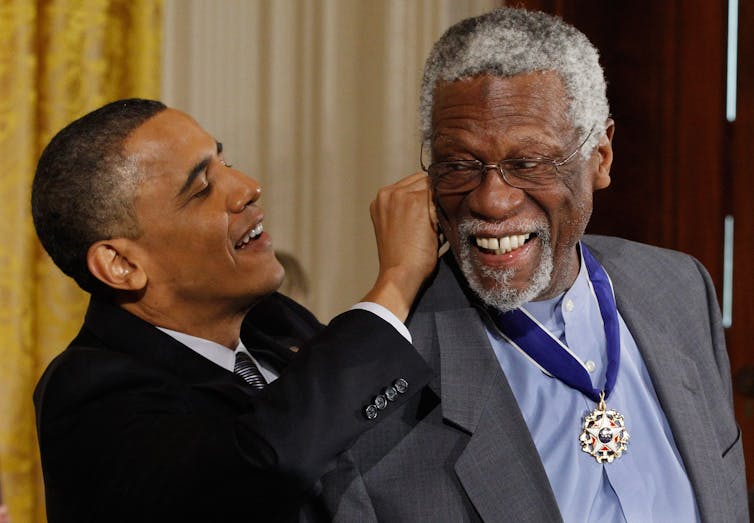
As the father of Black history, Carter G. Woodson had a simple goal – to legitimize the study of African American history and culture.
To that end, in 1912, shortly after becoming the second African American after W.E.B. Du Bois to earn a Ph.D. at Harvard, Woodson founded the Association for the Study of Negro Life and History in 1915.
More than 100 years later, Woodson’s goal and his work detailing the struggle of Black Americans to obtain full citizenship after centuries of systemic racism is still relevant today.
As dozens of GOP-controlled state legislatures across the U.S. have either considered or enacted laws restricting how race is taught in public schools, The Conversation U.S. has published numerous stories over the years exploring the rich terrain of Black history – and the never-ending quest to form what the Founding Fathers called a more perfect union.
Armed with a deep faith, Harriet Tubman is most famous for her successes along the Underground Railroad, the interracial network of abolitionists who enabled Black people to escape from slavery along secret routes in the South to freedom in the North and Canada.
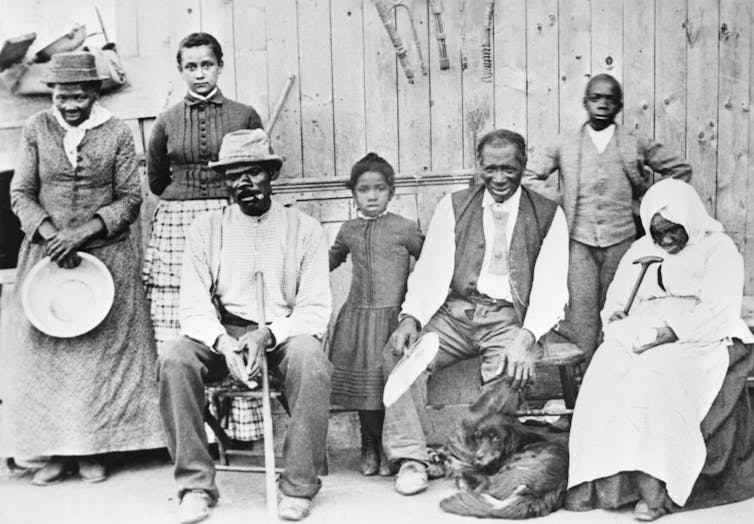
But Tubman’s activities as a Civil War spy are less well known.
As historian and Tubman biographer Kate Clifford Larson wrote, Tubman’s devotion to America’s promise of freedom endured, despite suffering decades of enslavement and second-class citizenship.
“I had reasoned this out in my mind,” Tubman once said. “There was one of two things I had a right to, liberty or death. If I could not have one, I would have the other; for no man should take me alive.”
As a scholar of race and colonialism, Kris Manjapra wrote that Emancipation Days – Juneteenth in Texas – are not what many people think.
“Emancipations did not remove all the shackles that prevented Black people from obtaining full citizenship rights,” Manjapra noted. “Nor did emancipations prevent states from enacting their own laws that prohibited Black people from voting or living in white neighborhoods.”
Between the 1780s and 1930s, over 80 emancipations from slavery occurred, from Pennsylvania in 1780 to Sierra Leone in 1936.
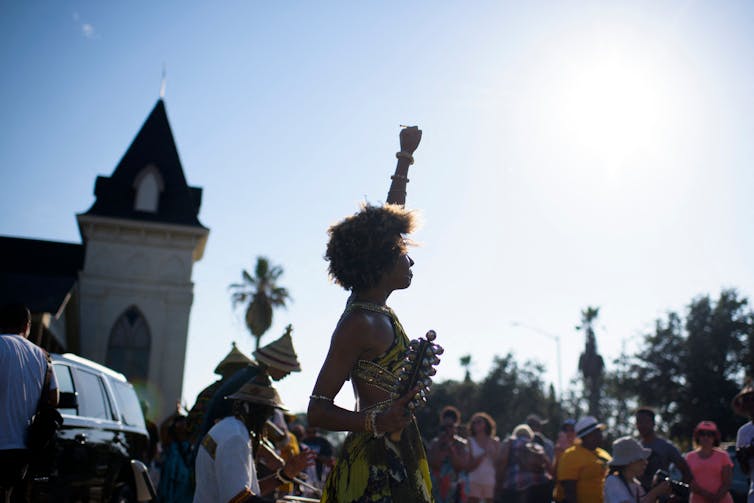
In fact, there were 20 separate emancipations in the United States alone from 1780 to 1865.
As director of the Lynching in Texas project, historian Jeffrey L. Littlejohn provided the very kind of analysis that Texas Gov. Greg Abbott and Republican legislators in Texas want to ban from public schools.
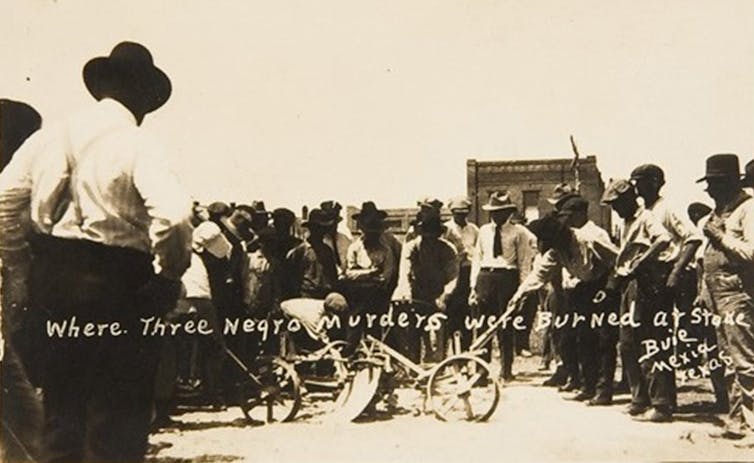
Among the many documents and relics Littlejohn has received, one package stood out. Inside was a family album of photographs filled with the usual images of memories – a vacation, a wedding anniversary dinner – but also, one of the lynching of a Black man.
During the Jim Crow era, lynchings occurred regularly in Texas – with 16 in 1922 alone.
But in 2021, the GOP-controlled state Legislature in Texas enacted a law prohibiting K-12 educators from teaching that “slavery and racism are anything other than deviations from … the authentic founding principles of the United States, which include liberty and equality.”
In other words, as Littlejohn wrote, “this interpretation holds that slavery, racism and racism’s deadly manifestation, lynching, did not serve as systemic forces that shaped Texas history but were instead aberrations.”
The photo album serves as a direct challenge to that interpretation.
In his book “Half American: The Epic Story of African Americans Fighting World War II at Home and Abroad,” historian Matthew Delmont explored the idea of Black patriotism and how many Black soldiers saw their service as a way to demonstrate the capabilities of their race.
Prompted by the Pittsburgh Courier, an influential Black newspaper during the 1940s, Delmont wrote that Black Americans rallied behind the Double V campaign during the war – victory over fascism abroad and victory over racism at home.

During the war, the Red Ball Express, the Allied forces’ transportation unit that delivered supplies to the front lines, was one example of such exceptional performance.
From August through November 1944, the mostly Black force moved more than 400,000 tons of ammunition, gasoline, medical supplies and rations to battlefronts in France, Belgium and Germany.
In his biography of Bill Russell, “King of the Court,” Aram Goudsouzian wrote that the NBA champion sought to find worth in basketball amid the racial tumult of the civil rights movement.
He emerged from that crucible by crafting a persona that one teammate called “a kingly arrogance.”
Russell, who died July, 31, 2022, was the NBA’s first Black superstar, its first Black champion and its first Black coach.
As a civil rights activist, Russell questioned the nonviolence philosophy of Martin Luther King Jr. and defended the militant ideas of Malcolm X and the Nation of Islam. He refused to accept segregated accommodations in the Deep South and recalled instances of police brutality during his childhood in Oakland, California.
“It’s a thing you want to scream,” Russell wrote. “I MUST HAVE MY MANHOOD.”
Editor’s note: This story is a roundup of articles from The Conversation’s archives.![]()
Howard Manly, Race + Equity Editor, The Conversation
This article is republished from The Conversation under a Creative Commons license. Read the original article.
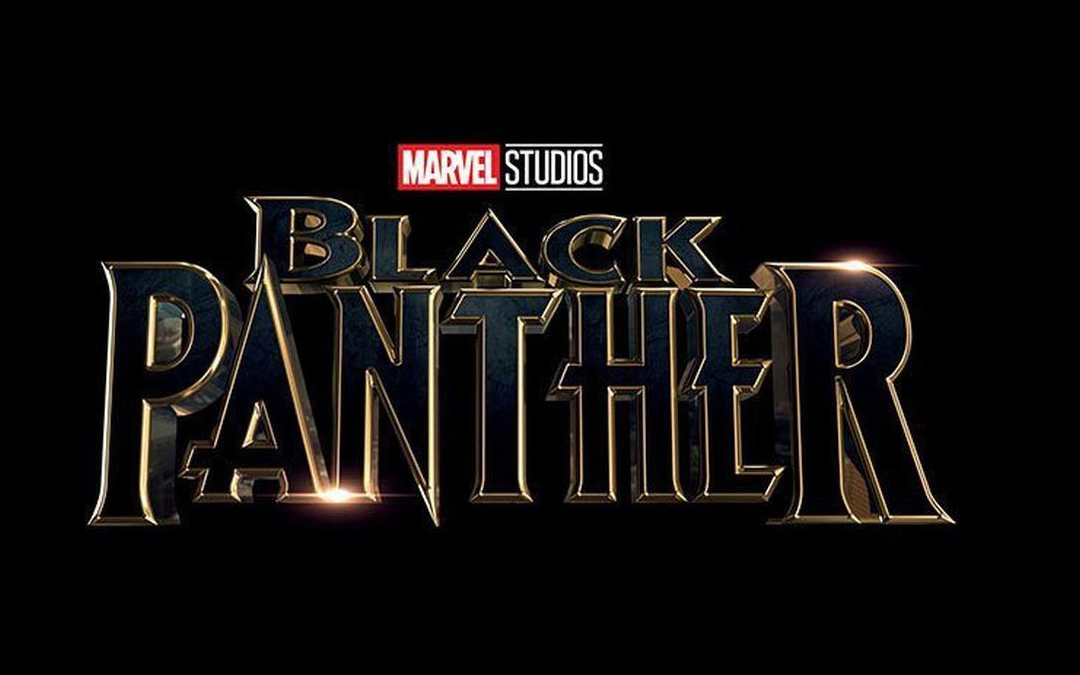
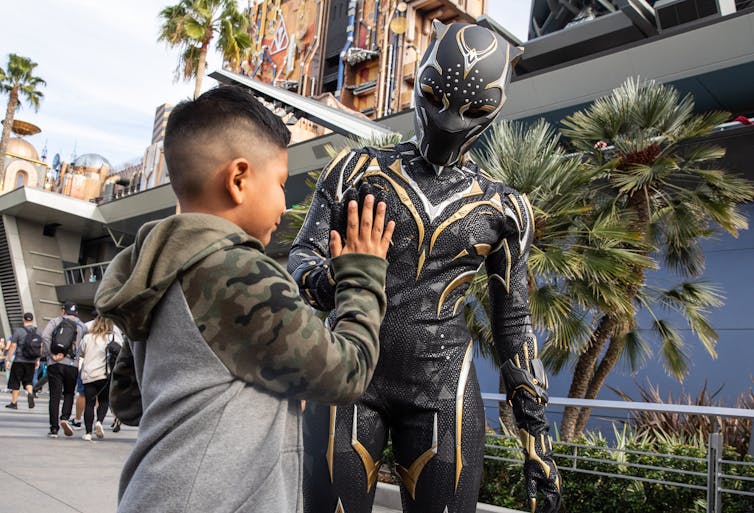
When Marvel Studios released “Black Panther” in February 2018, it marked the first Marvel Cinematic Universe film to feature a Black superhero and star a predominantly Black cast.
Its estimated production budget was US$200 million, making it the first Black film – conventionally defined as a film that is directed by a Black director, features a Black cast, and focuses on some aspect of the Black experience – ever to receive that level of financial support.
As a scholar of media and Black popular culture, I was often asked to respond to the resounding success of that first “Black Panther” film, which had shattered expectations of its box office performance.
Would it lead to more big-budget Black films? Was its popularity an indication that the global marketplace – the real source of trepidation about the film’s potential – was finally ready to embrace Black-cast films?
With the release of the massively successful “Black Panther: Wakanda Forever” in November 2022, I expect those questions to reemerge.
Yet as I review the cinematic landscape between the original and its sequel, I am inclined to restate the answer I gave back in 2018: Assumptions should not be made about the state of Black film based on the success of the “Black Panther” franchise.
Prior to its release, the producers of “Black Panther” faced questions about whether there was a market for a Black blockbuster film, even one ensconced in the Marvel Cinematic Universe.
After all, since the Wesley Snipes-led “Blade” trilogy, which came out in the late-1990s and early 2000s, Black superhero films had experienced diminishing returns. There was one notable exception: the commercially successful, though heavily panned “Hancock” (2008), starring Will Smith.
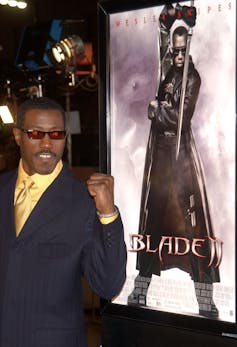
Otherwise, Black superhero films such as “Catwoman” (2004) and “Sleight” (2016) either flopped or had a limited release.
Furthermore, until “Black Panther,” no Black film exceeded a $100 million budget, the average benchmark for modern Hollywood blockbusters.
Nonetheless, despite these early concerns, “Black Panther” earned the highest domestic gross, $700 million, of all films released in 2018, while earning $1.3 billion in worldwide gross, second only to “Avengers: Infinity War.”
“Black Panther” emerged at the tail end of what many industry experts considered to be a surprisingly successful run of Black films, which included the biopic “Hidden Figures” (2016) and the raunchy comedy “Girls Trip” (2017). Despite their modest budgets, they earned over $100 million apiece at the box office – $235 million and $140 million, respectively.
However, both films were mostly reliant on the domestic box office, especially the R-rated “Girls Trip,” which was only released in a handful of foreign markets. Conventional wisdom has long held that Black films will fail abroad. International distributors and studios typically ignore them during the presale process or at film festivals and markets, reasoning that Black films are too culturally specific – not only in terms of their Blackness, but also their Americanness.
Films like “Black Panther” and the Oscar winning “Moonlight” (2016), which earned more on the international market than the domestic market, certainly challenged those assumptions. It has yet to upend them.
What do those Black films released in theaters in the nearly five years between “Black Panther” and “Black Panther: Wakanda Forever” tell us about the former’s impact?
The simple answer is that the original “Black Panther” has had no discernible influence on industry practices whatsoever.
Since 2018, no other Black blockbuster has emerged, save for the sequel itself. Granted, Black filmmaker Ava DuVernay’s remake of “A Wrinkle in Time” (2018) reportedly cost an estimated $100 million; however, while Black actors portrayed the protagonist and a few other characters, the film features a multicultural ensemble cast – which, as scholars such as Mary Beltran have pointed out, has become the primary strategy for achieving diversity in film.
Even if one were to include “A Wrinkle in Time,” the grand total of Black films with budgets exceeding $100 million is three, with the two “Black Panther” films being the others – all during an era in which there have been hundreds of mainstream films with budgets exceeding $100 million.
Otherwise, most of the Black films released in theaters between 2018 and 2022 typically were low budget by Hollywood standards – $3 million to $20 million in most cases – with only a handful, such as the 2021 Aretha Franklin biopic “Respect,” costing $50 million to 60 million.
Perhaps the most notable change has been the medium. Many Black films now appear on either cable networks that cater to a Black audience – namely Black Entertainment Television and, more recently, Lifetime – or on streaming services such as Netflix. Tyler Perry, the most popular and prolific Black filmmaker of the modern era, has released his latest films – “A Jazzman’s Blues” (2022), “A Madea Homecoming” (2022) and “A Fall from Grace” (2020) – directly to Netflix.
Furthermore, no other Black film has approached the financial success of “Black Panther.” Granted, several Black films have fared well at the box office, especially relative to their production costs. Foremost among them is Jordan Peele’s “Us” (2019), which cost an estimated $20 million, yet earned approximately $256 million worldwide despite its R rating and the fact that it was never released in China.
Without question, large budgets and commercial success are not the only measures of a film’s value and significance.
As has historically been the case, Black film has managed to do more with less. The critical acclaim afforded to films such as “BlackKlansman” (2018), “If Beale Street Could Talk” (2019) and “King Richard” (2021) reflect this fact. All reflect trends in contemporary Black filmmaking – comedies, historical dramas and biopics abound, for instance – and were made for a fraction of the cost of both “Black Panther” films.
In truth, the zeal with which some cast “Black Panther” as a bellwether for Black films is part of continued haranguing over their viability, particularly after the #OscarsSoWhite movement that drew attention to the lack of diversity at the 2016 Academy Awards.
However, its positioning as a Disney property within Marvel’s transmedia storytelling effort makes it so atypical that its success — and that of its sequel — portends little about Black film.![]()
Phillip Lamarr Cunningham, Assistant Professor, Media Studies, Wake Forest University
This article is republished from The Conversation under a Creative Commons license. Read the original article.
Every Black History Month we see a million memes, quotes, and images of Black people who have played an important role in shaping the story and lives of black people in America. We have heard about Martin Luther King Jr., Harriett Tubman, Frederick Douglass, and Rosa Parks more times than we can count. If we’ve grown up with good black history education which is rare in these yet to be United States of America, then we might know Booker T. Washington or Maya Angelou. We know there is an active attempt to publicly whitewash black history as though the systemic destruction, repression, and marginalization of our history wasn’t enough. As a result it becomes more important than ever to teach and tell Black History.
But in an attempt to reclaim our history, let us not forget the key role faith played in the lives of so many of our black leaders. There is a reason why belief in God and practice of faith were so key in the lives of many (but not all) people we talk about during Black History Month. So let’s lift up the faith of our black heroines and heroes this month as we continue to live out our own faith. Below are just some notable examples of historical moments and key black leaders who were influenced by their faith.
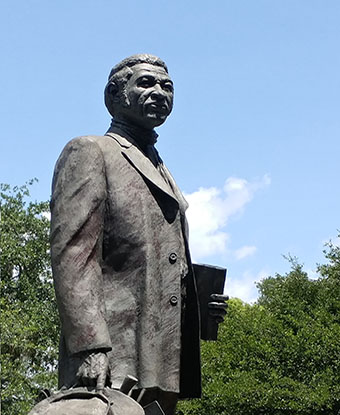 Denmark Vesey
Denmark Vesey
Denmark Vesey was an abolitionist and former slave who planned and organized an armed slave rebellion to free the slaves in Charleston, SC. Charleston was the largest slave trading port in the United States during the early 1800s. He was the slave of a ship captain who won the lottery and paid for his own freedom with his earnings, but was not able to pay for his family’s freedom. As a result he became intent on ending the institution of slavery itself. Vesey was a worshipper and small group teacher at the African Church which became Mother Emmanuel AME Church, and his faith informed his advocacy for abolition.
He was inspired by the Haitian revolution and planned to flee to Haiti with the freed slaves after the rebellion. He inspired other abolitionists such as Frederick Douglass, David Walker, and Harriet Beecher Stowe. It is well noted that the abolition of slavery was a result of the work of Christian abolitionists.
The Christianity of Vesey and David Walker after him did not advocate for passive waiting to slavery to end. As he read Isaiah, Amos, and especially Exodus he were convinced that armed rebellion could be used by God to bring freedom to enslaved Africans. He began to preach a radical liberation theology from the Old Testament almost exclusively as he prepared for rebellion. Denmark Vesey resurfaced as a popular figure in recent years in the aftermath of the horrendous shooting at Mother Emmanuel AME Church in 2016.
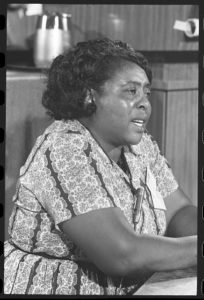 Fannie Lou Hamer
Fannie Lou Hamer
Fannie Lou Hamer was the founder and vice-chairperson of the Mississippi Freedom Democratic Party, which successfully unseated the all-white Mississippi delegation at the Democratic Party’s convention in 1968. This and other efforts earned her the title “First Lady of Civil Rights.”
In 1962, Fannie Lou became involved with the Civil Rights Movement when the Southern Christian Leadership Conference and the Student Nonviolent Coordinating Committee held a meeting in Ruleville, Mississippi. She and 17 others went to the county courthouse and tried to register to vote. Because they were African American, they were given an impossible registration test which they all failed. Fannie Lou’s life became a living hell. She was threatened, shot at, cursed and abused by angry mobs of white men including being beat almost to death by the police and imprisoned in Mississippi in 1963 for registering to vote.
Fannie Lou Hamer often sang spirituals at rallies, protests, and even in jail. Her faith in God is what she felt carried her through those difficult experiences. She quoted the Bible to shame her oppressors, encourage her followers, and hold her ministerial colleagues in the SCLC and SNCC accountable. She was a devout member of William Chapel Missionary Baptist Church, and let her faith permeate everything she did.
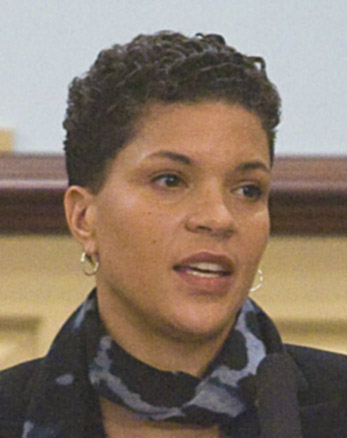 Michelle Alexander
Michelle Alexander
Michelle Alexander, JD is a civil rights lawyer and advocate, a legal scholar and the author of the New York Times best seller “The New Jim Crow: Mass Incarceration in the Age of Colorblindness.” The book helped to start a national debate about the crisis of mass incarceration in the United States and inspired racial-justice organizing and advocacy efforts nationwide.
Alexander performed extensive research on mass incarceration, racism in law and public policy, and racial justice to write her book published in 2010. She has lectured and taught widely on her work as a professor of law and religion at Stanford University, The Ohio State University, and Union Theological Seminary. The New Jim Crow became a foundational text for many of the reforms being advocate for by various organizations involved in the recent push for criminal justice reform and the movement for black lives.
Alexander was driven by her faith to advocate for justice system reforms, believing that God called her to it and seeing it as her reasonable service. Her faith drives her advocacy for justice for the marginalized, care and compassion for all people, and teaching. She feels as though her work in law and faith are inextricably linked, and that people of faith are poised to serve one of the most important roles in changing the system. She is currently a visiting professor at Union Theological Seminary in New York exploring the spiritual and ethical dimensions of the fight against mass incarceration.
https://www.nps.gov/people/denmark-vesey.htm
https://www.pbs.org/thisfarbyfaith/people/denmark_vesey.html?pepperjam=&publisherId=120349&clickId=3860507074&utm_medium=affiliate&utm_campaign=affiliate
https://www.nytimes.com/by/michelle-alexander
A Salute to Black Civil Rights Leaders, Richard L. Green, Chicago: Empak Enterprises,1987, p. 11
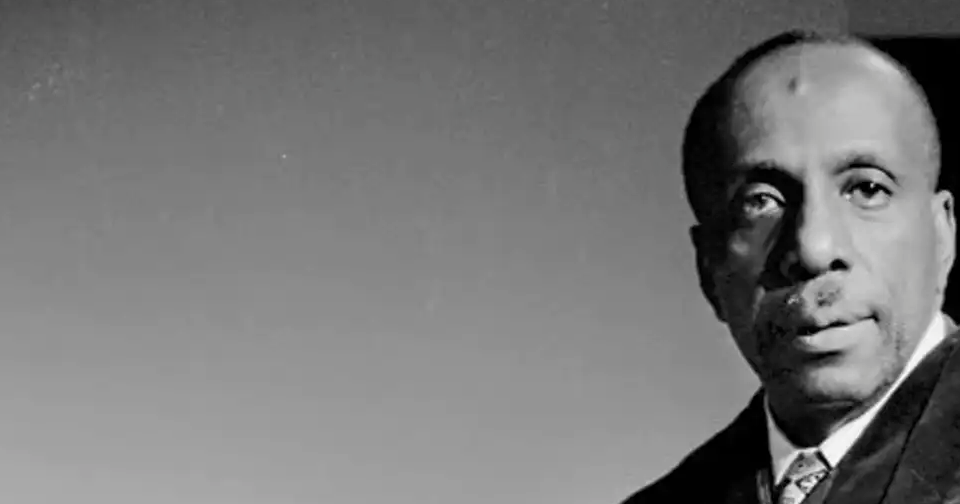
Video Courtesy of MPT National
For African-Americans who grew up with the legacy of segregation, disfranchisement, lynching, and violence, retreat from social struggle was unthinkable. Martin Luther King Jr., however, learned from some important mentors how to integrate spiritual growth and social transformation.
As a historian, who has studied how figures in American history struggled with similar questions, I believe one major influence on King’s thought was the African-American minister, theologian, and mystic Howard Thurman.
Born in 1899, Thurman was 30 years older than King, the same age, in fact, as King’s father. Through his sermons and teaching at Howard University and Boston University, he influenced intellectually and spiritually an entire generation that became the leadership of the civil rights movement.
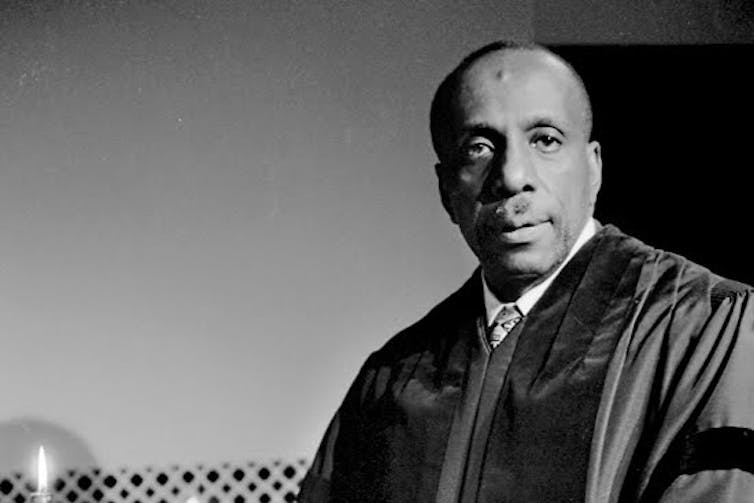
Among his most significant contributions was bringing the ideas of nonviolence to the movement. It was Thurman’s trip to India in 1935, where he met Mahatma Gandhi, that was greatly influential in incorporating the principles of nonviolence in the African-American freedom struggle.
At the close of the meeting, which was long highlighted by Thurman as a central event of his life, Gandhi reportedly told Thurman that “it may be through the Negroes that the unadulterated message of nonviolence will be delivered to the world.” King and others remembered and repeated that phrase during the early years of the civil rights movement in the 1950s.
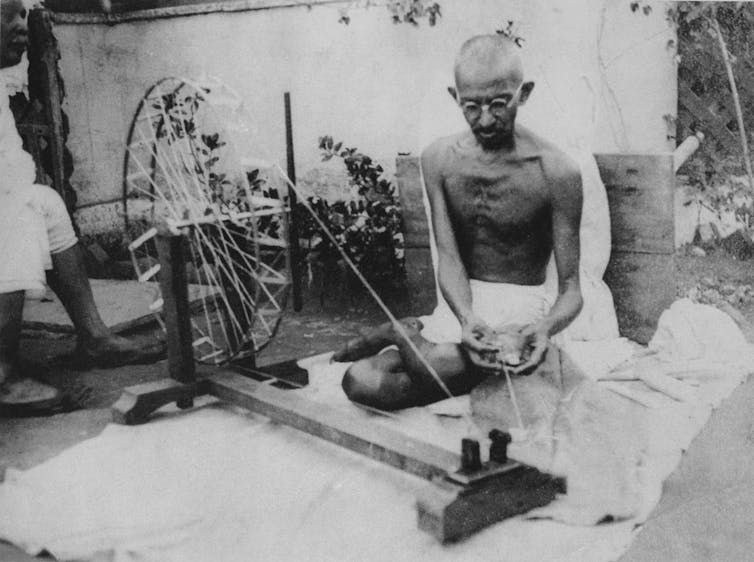
Thurman and King were both steeped in the black Baptist tradition. Both thought long about how to apply their church experiences and theological training into challenging the white supremacist ideology of segregation. However, initially their encounters were brief.
Thurman had served as dean of Marsh Chapel at Boston University from 1953 to 1965. King was a student there when Thurman first assumed his position in Boston and heard the renowned minister deliver some addresses. A few years later, King invited Thurman to speak at his first pulpit at Dexter Avenue Baptist Church in Montgomery, Alabama.
Their most serious personal encounter – the one that gave Thurman his opportunity to influence King personally, and help prepare him for struggles to come – came as a result of a tragedy.
On Sept. 20, 1958, a mentally disturbed African-American woman named Izola Ware Curry came to a book signing in upper Manhattan. There, King was signing copies of his new book, “Stride Toward Freedom: The Montgomery Story.” Curry moved to the front of the signing line, took out a sharp-edged letter opener and stabbed the 29-year-old minister, who had just vaulted to national prominence through his leadership of the Montgomery bus boycott.
King barely survived. Doctors later told King that, if he had sneezed, he easily could have died. Of course, King later received a fatal gunshot wound in April 1968. Curry lived her days in a mental institution, to the age of 97.
It was while recuperating in the hospital afterward, that King received a visit from Thurman. While there, Thurman gave the same advice he gave to countless others over decades: that King should take the unexpected, if tragic, opportunity, to meditate on his life and its purposes, and only then move forward.
Thurman urged King to extend his rest period by two weeks. It would, as he said, give King “time away from the immediate pressure of the movement” and to “rest his body and mind with healing detachment.” Thurman worried that “the movement had become more than an organization; it had become an organism with a life of its own,” which potentially could swallow up King.
King wrote to Thurman to say, “I am following your advice on the question.”
King and Thurman were never personally close. But Thurman left a profound intellectual and spiritual influence on King. King, for example, reportedly carried his own well-thumbed copy of Thurman’s best-known book, “Jesus and the Disinherited,” in his pocket during the long and epic struggle of the Montgomery bus boycott.
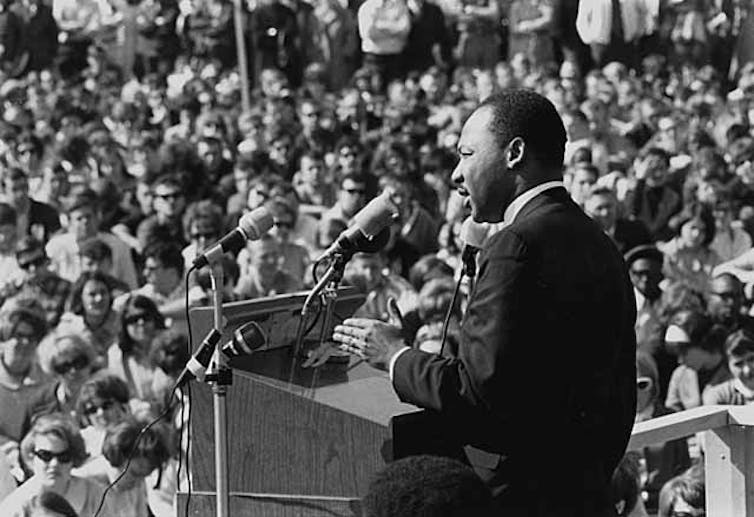
In his sermons during the 1950s and 1960s, King quoted and paraphrased Thurman extensively. Drawing from Thurman’s views, King understood Jesus as friend and ally of the dispossessed – to a group of Jewish followers in ancient Palestine, and to African-Americans under slavery and segregation. That was precisely why Jesus was so central to African-American religious history.
Thurman was not an activist, as King was, nor one to take up specific social and political causes to transform a country. He was a private man and an intellectual. He saw spiritual cultivation as a necessary accompaniment to social activism.
As Walter Fluker, editor of the Howard Thurman Papers Project, has explained, the private mystic and the public activist found common ground in understanding that spirituality is necessarily linked to social transformation. Private spiritual cultivation could prepare the way for deeper public commitments for social change. King himself, according to one biographer, came to feel that the stabbing and enforced convalescence was “part of God’s plan to prepare him for some larger work” in the struggle against southern segregation and American white supremacy.
In a larger sense, the discipline of nonviolence required a spiritual commitment and discipline that came, for many, through self-examination, meditation and prayer. This was the message Thurman transmitted to the larger civil rights movement. Thurman combined, in the words of historian Martin Marty, the “inner life, the life of passion, the life of fire, with the external life, the life of politics.”
King’s stabbing was a bizarre and tragic event, but in some sense it gave him the period of reflection and inner cultivation needed for the chaotic coming days of the civil rights struggle. The prison cell in Birmingham, Alabama, where in mid-1963 King penned his classic “Letter from Birmingham Jail,” also accidentally but critically provided much the same spiritual retreat for reflections that helped transform America.
The relationship of Thurman’s mysticism and King’s activism provides a fascinating model for how spiritual and social transformation can work together in a person’s life. And in society more generally.
This is an updated version of an article originally published on Jan. 11, 2018.![]()
Paul Harvey, Professor of American History, University of Colorado Colorado Springs
This article is republished from The Conversation under a Creative Commons license. Read the original article.


When we are in times of transition, it can be easy to fall into fear. Many of us do not like change. We would rather be settled and know the ground we stand on. We like our second year at the new company. Our junior year of school. Year two of our relationship. When our organization or project is fully funded. Many of us thrive when we feel we’re on a firm foundation, and we’re nervous when we are launching into the unknown. Yet many of us find ourselves at a crossroads and long for clarity about how to move forward.
In Matthew 14:22, we read about the disciples in transition as they launched across the Sea of Galilee once again, headed from one miracle with Jesus to another. They had learned that whenever Jesus showed up in a new town, He created a stir. His presence led to crowds ready to run him out of town, plead with him for healing, press to hear him teach, or follow Him in curiosity.

But things felt uncertain on the sea that day. The Sea of Galilee was not an unfamiliar place–some of them were fishermen, and all of them lived near the sea their entire lives. The feelings of difficulty didn’t come with the place, but from the circumstances. The last time they were on the sea together, a storm almost destroyed their ship, but Jesus was there to save them. But this time they were back on the Sea of Galilee, sailing late at night without Jesus. His absence meant that anything could happen. They found their peace in His presence. Without Him, they felt a little more uneasy about everything. They knew where they were going and where they were coming from. But they were in transition without the presence of the Lord.
And then they saw a figure walking across the lake. They became terrified, and their place of transition became a place of fear. A figure out on the water with no boat walking above the waves was not a pleasant sight–it looked like a ghost. They had every reason to be afraid. We can relate to their fear of the unexpected showing up in the midst of the unknown.
Then Jesus called out to them, and they understood that what they were seeing was not a ghost. It was the Lord. In the space between the last and the next, God showed up for them in an unexpected way. Their place of uncertainty became a place of the miraculous.
Similarly, God is able to show up for us in unexpected ways when our circumstances change. It may look like we are alone as we move to new cities, start new jobs, or find new relationships. The water can seem unstable beneath us as it flows without clarity, especially when the night surrounds us. But if we remember that God is with us always and can meet us right where we are, we may find ourselves walking on the water with Jesus on the way to our destinations.


People worldwide make New Year’s resolutions every year in an attempt to improve their lives. Common resolutions are to exercise more, eat healthier, save money, lose weight and reduce stress.
Yet, 80% of people agree that most people won’t stick to their resolutions. This pessimism is somewhat justified. Only 4% of people report following through on all of the resolutions they personally set.
We have spent years studying motivation, emotion regulation and behavior in family relationships, athletic performance and health information processing in the marketplace. Now at USC’s Performance Science Institute, we help people attain and sustain high performance in all aspects of their lives.
Based on our research, we propose a potential solution to the problem of New Year’s resolutions that people can’t keep: encouraging people to reframe their resolutions to emphasize purpose-based performance.
What leads to so many abandoned New Year’s resolutions?
A large body of research on goal-setting and habits provides insight into the various reasons for failed resolutions.
Many people are not framing their resolutions in ways that will motivate them over time. For example, “exercise more” is a fairly clear directive, but it lacks depth and personal meaning that could help promote follow through. Overly simplified resolutions, such as “exercise more” and “eat healthier” contribute to the ongoing problem that emerges as early as mid-January each year: unintentional neglect of important self-improvement goals.

Purpose has been defined simply as someone’s reason for doing something. However, scientists have recently developed a more comprehensive framework for purpose.
Purpose is associated with positive outcomes for people of all ages. People with a sense of purpose make more money, cope with life hardships more effectively and are healthier across the lifespan. Organizations that foster or reinforce employees’ sense of purpose are now referred to as “high performance workplaces”.
In the context of goal-setting for the new year, the concept of purpose-based performance becomes especially relevant. In our research, we have found that purpose-based performance is much healthier and more sustainable than outcome-driven performance.
Purpose-based performance has three critical, interrelated components: goal orientation, personal meaning and focus on something or someone beyond the self. We provide three questions that you can ask yourself when developing New Year’s resolutions to inspire purpose-based performance.
The first thing to consider is your long-term goals, and how each resolution fits with those goals. Purpose-based performance includes goal orientation, or an internal compass that directs people toward some long-term aim. This orientation helps people organize and prioritize more immediate actions to make progress toward that aim. People who are goal-oriented and remind themselves of their “end game” live consistently with their beliefs and values and perform better on the immediate goals they set.
When setting New Year’s resolutions, many people end up with a long list of simple resolutions without thinking deeply about their rationale for each resolution, or where each resolution will take them. Linking an immediate goal with a longer-term aim can sustain progress. Thinking about who you want to become can help you decide which resolution(s) to take on.
The next step to consider is why each resolution is personally meaningful for you. When people pursue personally meaningful goals, they are not only more intrinsically motivated but also find more joy in the process of goal pursuit. They are able to reframe challenges as opportunities for personal growth. In one study with elite athletes, we found that personal meaning helped them regulate their emotions when things didn’t go their way and display more patience as they pursued their goals.
Someone who pursues a goal for external rewards that are contingent on a particular end result – for example, validation that comes from winning – is likely to experience shame when they fall short of their goal. Even when they win, they may feel disappointed because the end result does not bring meaning to their life. This is exemplified by the “post-Olympic blues,” when Olympians experience depression after such a significant accomplishment.
Spend time thinking about your motivation for each resolution. Ask yourself, are you focused on a particular outcome because it will give you self-esteem, status or something else? It can be helpful to think about the potential meaning found in the process of pursuing a goal, regardless of whether you attain the desired outcome.
The final step is to consider who or what, beyond yourself, will be positively affected by your resolution(s). Desire to be a part of something greater than the self, or transcendent motivation, is beneficial for performance for several reasons.

Linking a resolution to transcendent motivation can be a powerful source of inspiration. Someone may link exercise goals to a charitable cause they care about, or they may think about how improving their health will make them a better partner, friend or parent. Research shows transcendent motivation improves self-regulation when things get dull or repetitive during goal pursuit, and it strengthens character virtues like patience and generosity. When someone’s transcendent motivation is prosocial in nature, they are willing to accept feedback about performance and receive increased social support in the workplace.
Think about the bigger picture. Consider whom you are helping with each goal. Potential impact beyond yourself is added fuel for your goal pursuit.
What might New Year’s resolutions that incorporate purpose-based performance look like? Using the three questions above, we have reworked three common resolutions to reflect purpose-based performance:
Cheers to a new, purpose-filled year!
[ Deep knowledge, daily. Sign up for The Conversation’s newsletter. ]![]()
Benjamin Houltberg, Research Director, Performance Science Institute, University of Southern California and Arianna Uhalde, Assistant Professor of Clinical Marketing, University of Southern California
This article is republished from The Conversation under a Creative Commons license. Read the original article.
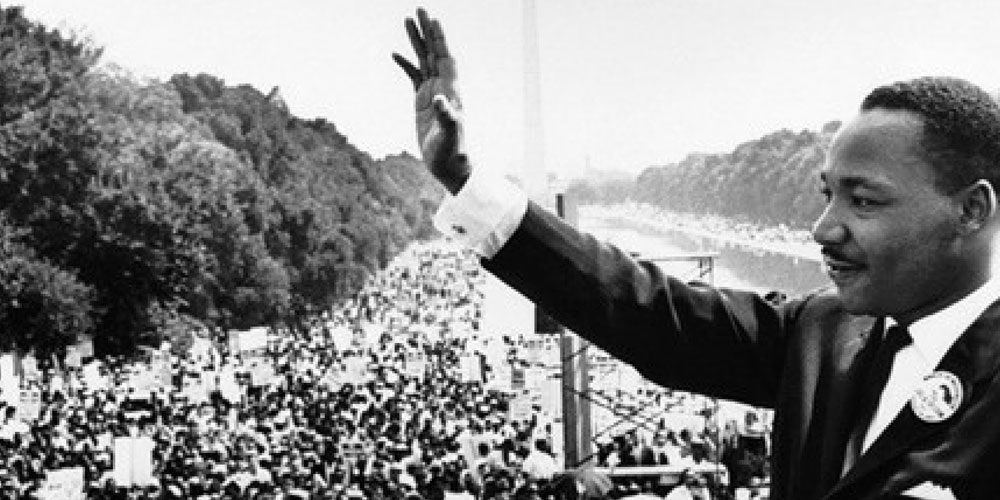
Video, courtesy of TIME
In celebration of Martin Luther King, Jr., we’ve compiled several of the stories we’ve published over the years about his life and ministry.
The page you requested could not be found. Try refining your search, or use the navigation above to locate the post.
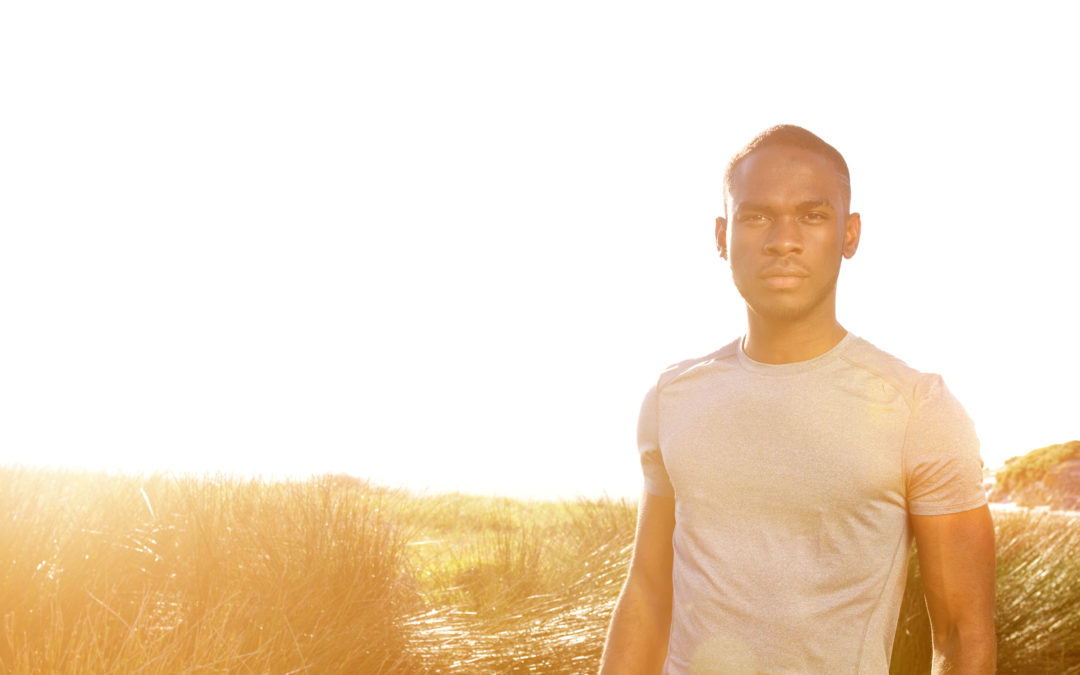
18 Yet what we suffer now is nothing compared to the glory he will reveal to us later. 19 For all creation is waiting eagerly for that future day when God will reveal who his children really are. 20 Against its will, all creation was subjected to God’s curse. But with eager hope, 21 the creation looks forward to the day when it will join God’s children in glorious freedom from death and decay. 22 For we know that all creation has been groaning as in the pains of childbirth right up to the present time. 23 And we believers also groan, even though we have the Holy Spirit within us as a foretaste of future glory, for we long for our bodies to be released from sin and suffering. We, too, wait with eager hope for the day when God will give us our full rights as his adopted children,[a] including the new bodies he has promised us. 24 We were given this hope when we were saved. (If we already have something, we don’t need to hope[b] for it. 25 But if we look forward to something we don’t yet have, we must wait patiently and confidently.)
26 And the Holy Spirit helps us in our weakness. For example, we don’t know what God wants us to pray for. But the Holy Spirit prays for us with groanings that cannot be expressed in words. 27 And the Father who knows all hearts knows what the Spirit is saying, for the Spirit pleads for us believers[c] in harmony with God’s own will. 28 And we know that God causes everything to work together[d] for the good of those who love God and are called according to his purpose for them. 29 For God knew his people in advance, and he chose them to become like his Son, so that his Son would be the firstborn[e] among many brothers and sisters. 30 And having chosen them, he called them to come to him. And having called them, he gave them right standing with himself. And having given them right standing, he gave them his glory.

As a true child of God, there is a power and authority that we are expected to walk in and manifest. At times, the problems we see in the world create hopelessness and despair as many ask themselves, “where is God?” These are signs that there is a need for solutions from the Church of Jesus Christ.
What if our faith in God could push us to fulfill our destiny? How many times have you wallowed in sadness and discouragement wondering what will happen with your life? We may be the answer to the world’s problems.
In Romans 8:18-30, we are reminded of the beginning in the book of Genesis where the Lord gave man authority as a caretaker of the garden of Eden. That level of responsibility meant that humanity had the power to creatively come up with solutions that would impact creation.
Every day, there seems to be a new problem in our society. There is always something pending that should be handled or taken care of. This scripture is a reminder that the God we serve has great confidence in us to come up with solutions that will create positive changes.
Creation is yearning for us as children of the most High God to awaken to our divine collaboration with the Lord caretaking and providing answers to every day questions and problems. If humanity can creatively come up with a strategy and a means to travel to the moon, there is a grace that is in us to come up with answers that will transform the world we are living in a day at a time.
All it takes is a perspective of faith, belief in oneself, trusting the power of God in you, and looking around to see the problems that need to be solved. Instead of waiting and wondering what your life is about, be proactive in using what God has given you to make the world you live in a better place.
Dear Father,
Today I ask for a change in mindset. Teach me how to think like a winner and a solutionist. Instead of complaining about the problems in my life, help me to look for opportunities to make a change. Reveal to me the gifts and graces you have bestowed upon me and help me to create answers. Let me be confident in your ability to assign me as a caretaker of the world I live in. Make it a personal responsibility to make a positive change. I believe I can do it. Show me how to do it, so that I may please you as a compliment of your faith in me.
In Jesus Name,
Amen
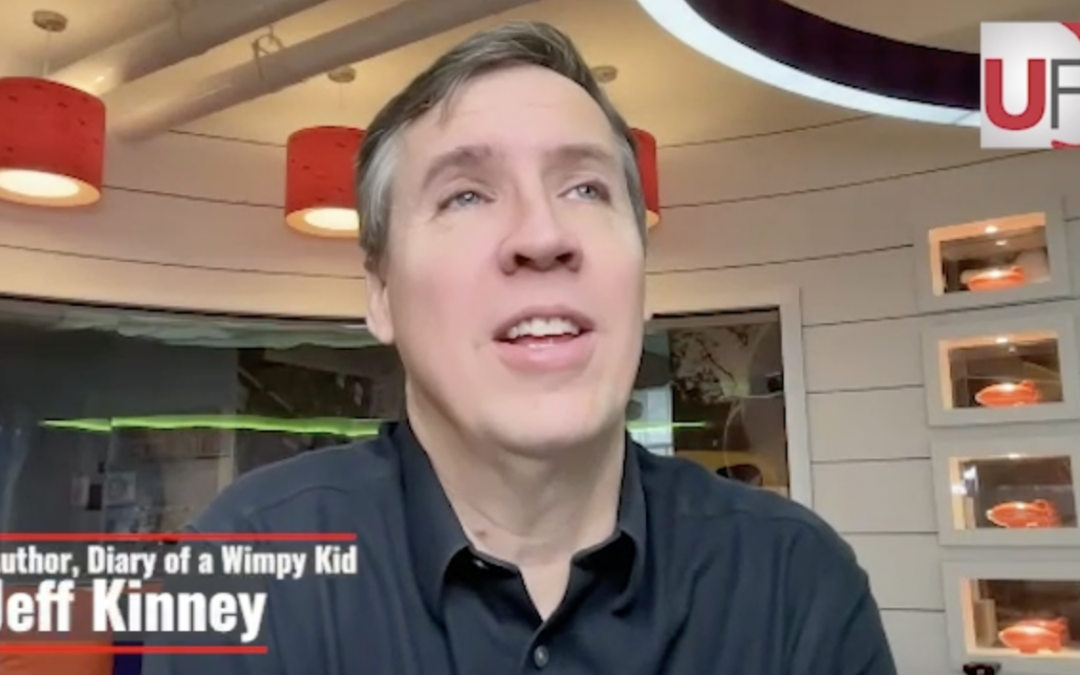
Diary of a Wimpy Kid is one of best selling children’s book series of the past few decades. UrbanFaith contributor Maina Mwaura and his daughter Zyan sat down with the author Jeff Kinney to get his perspective on great ways to engage our children, how faith plays a role in his writing, and what’s next for Diary of A Wimpy Kid.
The late Chadwick Boseman provides words of inspiration to college graduates about finding purpose in life.
“For I know the plans I have for you,” declares the LORD, “plans to prosper you and not to harm you, plans to give you hope and a future.” Jeremiah 29:11, NIV
Although the above words were initially intended to reassure those that had been carried into exile from Jerusalem to Babylon that they’d be brought back from captivity, they also provide comfort and encouragement in the present day for anyone that worries about what the future holds for them. And, thanks to all of the recent news stories about the state of the economy, not to mention all the reports of shocking acts of violence and natural disasters, many people are probably not only wondering—but worrying—about the future.
I usually think of myself as an optimistic person, however, I must admit that on more than a few occasions, I’ve worried about how I’d handle a particular situation or how it might turn out. Fortunately, it was during some of those times that I felt as though God was reaching out to me in a special way through the words found in Jeremiah 29:11. This is why it’s become one of my favorite scriptures.
The first time I felt God was speaking to me through this verse was right before I was scheduled to take a trip on an airplane. For some reason, I’d become terrified of doing something I had been doing since I was about six years old. I’d never had any bad experiences while flying, so I’m not sure why I was so scared that particular time. I just was. That’s why I was so happy that I came across Jeremiah 29:11 in the days leading up to that trip. I felt as if God was trying to tell me to go ahead and take the trip and trust that I’d be safe. I did go on that trip, and it was a safe and enjoyable one.
This verse also ministered to me was when I was sitting in a breast surgeon’s office trying to figure out if I should have a biopsy done. As my husband, Vince, and I sat in this Christian doctor’s office listening to her explain how routine it would be and how quickly it could be completed, I couldn’t help but fear she might find something bad or, worse yet, that I might not make it through the procedure. But, before I could tell her I needed to think about it more, she stopped talking and turned around the nameplate resting on her desk and asked me to read the Scripture verse that was taped to the back of it. Can you guess what it was? Yes, Jeremiah 29:11. I had no idea that we shared a fondness for this scripture, but when I read it, I knew everything would be fine. The procedure was uneventful and results of the biopsy were normal.
That same scripture spoke to me again a few years later on the day that my husband and I moved back to Illinois—along with our then-infant daughter—after residing on the East Coast for several years. I was extremely happy about the fact that I’d again be living near my parents and my sister and her growing family. But, I hadn’t really thought about the fact that I’d be leaving behind the church family that had showered us with love during the four years we lived in New Jersey.
Since my husband was one of the staff ministers at the church, the other ministers and their wives threw a special farewell luncheon for us. Near the end of the luncheon, they presented gifts to each of us. My husband’s gift—a personalized black briefcase—was a very nice one and came in handy when he started teaching undergrads several weeks later. However, the decorative little plaque that contained a Bible verse that I received was priceless. And, you may be able to figure out why. Yes, the scripture inscribed on the plaque was my favorite one. The gift served as the perfect reminder that, even as I left the amazing church family that I had come to love and made the switch from career woman to stay-at-home-mom, God would be with me. And, since I’d never told any of them about my fondness for that scripture, I saw it as a true gift from above.
So, if you’re going through an unsettling situation or circumstance, don’t despair. Instead, reflect on the words of Jeremiah 29:11 and think about how they might apply in your life right now.
And remember this: God has unique plans for all of our lives. They may not always line up with the pictures we’ve sketched in our own minds or the life plans we’ve drafted for ourselves, but they are special because He created them just for us. And, because of this, He will enable us and empower us to handle any situation and accomplish any task that He places in our lives.
I also hope you’ll remember that we serve a merciful, gracious, trustworthy, and loving God. Sometimes we spend far too much time thinking about all the ways God is going to punish our sin and nearly not enough time thinking about — and giving thanks for — all the ways He has blessed us.
Sometimes God will speak to us by repeatedly placing in front of our faces a particular scripture, and sometimes He’ll use other people to get a particular message to us. But, regardless of how He chooses to speak to you, I pray you’ll never stop desiring to hear from Him. So, don’t spend a lot of time worrying or fretting over how you’ll handle something that you’re currently — or soon may be — going through; God is already handling it for you, His unique and precious child.

Below is an excerpt. For the full article purchase UrbanFaith Magazine December Quarter 2022
It’s December! It’s that time of year when many people are either anxious or excited about the Christmas holiday season. On the first day of December the countdown to Christmas day begins. Some write Christmas lists while others plan holiday meals. Some begin shopping for the perfect gifts while others decorate their homes inside and out. The brightest reminder of the upcoming holiday is the Grand Illumination of cities and towns around the world. Christmas lights accentuate buildings, houses, trees, ugly sweaters and more. The world is filled with light.
Jesus is the Light of the World
What’s the use of the sun – if the earth can’t feel the glow?
If it couldn’t make flowers grow?
It wouldn’t be a wonder – it wouldn’t be a miracle…
(‘Miracle’, Jonathan McReynolds & Mali Music)
Christians around the world celebrate the birth of Jesus on Christmas, the annual festival observed on December 25. The Gospel according to Luke and Matthew chronicle this illuminating occasion. The birth of Jesus was no ordinary birth; it was a miracle. Jesus was no ordinary man; Jesus was and is the Christ. Christ, which means ‘anointed,’ is a proper name, or title. Jesus Christ is not a name; it is a faith statement. All who declare that Jesus is the Christ, believe and declare that Jesus is God’s anointed Savior. The Gospel according to John declares that Jesus is ‘the Word’ that became human and lived among us.
The song, Miracle, sung by Jonathan McReynolds & Mali Music, reminds me of the miraculous work of God through the son (s-o-n not s-u-n), who came so that we could not only see the light and truth, but also feel the light and be changed by the warmth of it. What’s the use of the Son, if the world can’t feel the liberating power of the God’s love, and be renewed by it? The miraculous birth of Christ would mean nothing if the seed of humanity didn’t turn toward it and mature to its fullest possibility. I often wonder what the world would be like if all of humanity believed and declared that Jesus, the living Word of God, is the Christ.
So the Word became human and made his home among us. He was full of unfailing love and faithfulness.
(John 3:14a, NLT)
The birth of Christ was necessary because we, human beings, needed to restore our relationship with God. Sin is often compared to darkness, and salvation compared to light. When we say that Jesus is the light of the world, we acknowledge that Jesus was born and lived with us. Jesus took on the form of a human being, ‘fixed his tent,’ and became our tent-mate. Well, of course most of us aren’t living in tents these days. However, we do know what it means when family and friends come to our homes and spend time with us. This is what Jesus did, so that we could physically see God’s power and God’s love for us. God loved us even when we weren’t loving toward God. That is unfailing love. When you think of buying and giving Christmas gifts this holiday season, remember Jesus, the greatest gift ever given. When you are paying for the perfect gift that you have chosen for a loved one, remember Jesus is the perfect gift God offered to us.